PROTECT OUR









We’re at an historic moment for ocean protection and Blue Marine intends to seize every opportunity to drive change.
After long years of campaigning for the world to listen to the need for protection, there is at last movement. In the last 18 months, historic agreements have been reached to protect 30 per cent of land and sea, to restore degraded ecosystems and to reduce harmful subsidies, all by 2030. And in June 2023 the world adopted the (as yet unratified) treaty to protect biodiversity in areas beyond national jurisdiction, paving the way for high seas marine protected areas.
This feels like a time of unprecedented opportunity, a ‘now or never’ moment to halt and reverse the catastrophic loss of nature in the sea.
Thanks to our track record and reputation, Blue Marine is increasingly being invited by governments and local partners to provide our expertise, experience and support to deliver ambitious marine protected areas around the world. Project opportunities have never been greater, and we’re better equipped to respond than we’ve ever been – acting nimbly yet effectively to deliver ambitious protection.
Frustratingly, habitual ways of doing things don’t measure up to the urgency of challenges we now face, and we worry that governments around the world are far too complacent in their approach to the natural world. We are pushing back on this backsliding; for example, in the UK, Blue Marine is compelled to take the Government to court for (yet again) issuing fishing quota well ahead of scientific advice.
Political will aside, the amount of support for ocean conservation from the general public, corporates and donors is unprecedented, and we feel spurred on to be ambitious and inventive. We are applying bold new solutions, whether its a model of spatial closures (areas closed to fishing) with Greek fishermen incentivised to

remove 'ghost gear' instead of fishing or - alternatively - putting 'fish hotels' around wind turbines to make offshore wind farms nature-positive.
Although Blue Marine is now ten times bigger than when I joined in 2014, in turnover, expenditure and number of projects (we’re running 50 programmes in 24 different countries), the spirit of Blue Marine - friendly, fun, creative and fiercely committed - is as strong as it’s ever been. We hope you enjoy reading about the work of our determined team as we take on this daunting task of protecting the world’s oceans as fast as we can.

If I were looking for one word to describe 2023 for Blue Marine, it would probably be ‘maturity’.
It feels as though Blue Marine transitioned from adolescence to maturity in 12 short months. Clearly, as ever, we are on a journey, but we are now far from being a start-up and much fantastic work has been done by the executive to ensure that we have the right structure and systems in place to reflect this. Our conservation impact has continued to scale of course, but we have also worked hard on ourselves, building the capacity and culture for growth.

Our purpose

A healthy ocean, abundant with life, that supports people and climate.
To ensure the effective protection of at least 30 per cent of the ocean by 2030 and the sustainable management of the whole ocean.
To support the livelihoods in coastal communities through the recovery of marine biodiversity.
We are brave, innovative and pioneering
We are compassionate, supportive and responsible.
We operate in a spirit of fairness.
We work without bias, with integrity, accountability and transparency.
We show respect for all people we encounter.
We collaborate – with other organisations, NGOs and local communities.
Blue Marine Foundation acts as a catalyst to protect and restore life in the ocean. We work in partnership with small-scale fishers, local organisations and governments to deliver marine conservation and restoration solutions to the climate and biodiversity crisis.
We use science, community engagement, media and legal campaigns, investigations, education initiatives and policy work to deliver conservation impact. We intervene strategically but without geographic restriction, responding to the needs of the marine environment.
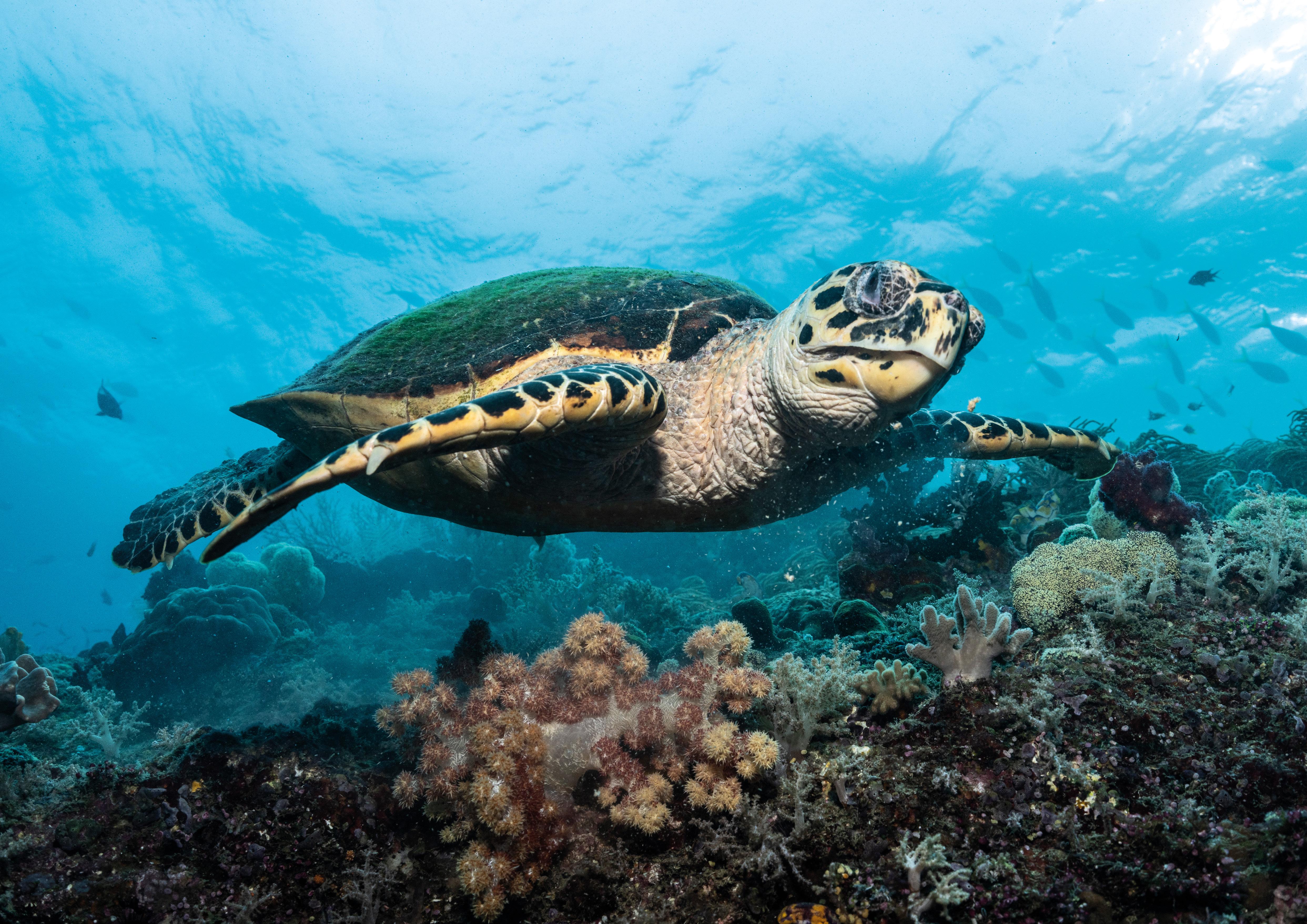
Blue Marine seeks to achieve its mission through these four strategic pillars:
Blue Marine aims to secure effectively managed marine protected areas closed to destructive fishing and other damaging activities.
Through highlighting poor practice and by developing solutions, we challenge harmful overfishing and over-extraction.
We support local sustainable fisheries, proving that low-impact fishing benefits marine life, local fishers and coastal communities.
Blue Marine restores marine habitats to revive and protect vulnerable and threatened species.

Blue Marine achieves a huge amount of conservation impact. These are some of our major achievements:
Blue Marine, with support from the Bertarelli Foundation, brokers a deal to enable the creation of what was then the largest marine protected area (MPA) in the world, around Chagos in the Indian Ocean.
Lyme Bay Fisheries and Conservation Reserve project launched, helping fishers to earn more from their catch while fishing more sustainably.
Blue Marine and the Great Blue Oceans coalition secure a UK Government manifesto commitment to create a ‘Blue Belt’ around all 14 UK overseas territories. This was hailed as ‘the greatest conservation commitment by any government ever’.
The GB Oceans coalition, of which Blue Marine is an active part, secures a UK Government commitment to create the world’s largest marine reserve around Pitcairn Island in the Pacific.
The UK government commits to protecting four million sq km of the Blue Belt in September 2016, fulfilling its manifesto commitment in 2015, campaigned for by Blue Marine and the GB Oceans coalition.
Blue Marine, working with local partners in Azerbaijan, initiated a ban on the import of gillnets and a programme of gillnet clearance, thus enabling critically endangered sturgeon to breed in the wild.
Blue Marine, as part of the GB Oceans coalition, secures an even stronger manifesto commitment from the UK Government, ahead of the June 2017 election, to protect more than four million sq km of ocean around the UK overseas territories.
Broodstock oysters in Blue Marine’s Solent Oyster Restoration Project spawn, releasing millions of larvae into the Solent.
Blue Marine spearheads a social media campaign to encourage the public to tweet and email their MPs, resulting in 285 MPs from eight political parties signing up to the Blue Belt Charter by the end of 2018.
The UK Government announces a target of 30 per cent of the world's oceans protected by 2030, aligning with Blue Marine’s longterm strategy.
Following Blue Marine’s #StopElectricFishing campaign, undertaken in collaboration with Bloom Association, the European Parliament’s Committee on Fisheries votes to ban electricpulse fishing in EU waters.
With support from Blue Marine, 100 per cent of the waters around Ascension Island are designated a marine reserve, creating what was at the time the largest fully protected marine reserve in the Atlantic, an area almost the size of France.
Blue Marine secures a £2 million donation from long-term supporter Peter Lürssen to establish an endowment fund for the Ascension Island community, in support of their vision to establish an MPA.
The Tristan da Cunha community designates 687,000 sq km of their territorial waters as a notake zone.
Following pressure from Blue Marine, the UK Government announces an immediate ban on all electric-pulse trawling and fishing in UK waters.
Destructive bottom-trawling is banned in four offshore areas including the UK’s largest domestic offshore MPA, the Dogger Bank, following the threat of legal action by Blue Marine.
A byelaw, supported by Sir David Attenborough and Blue Marine through the Help Our Kelp coalition, protects 300 sq km of seabed off the Sussex coast from damaging trawl-fishing.
After a marine protection campaign of almost seven years by Blue Marine and our partners, the government of the Maldives designates six new MPAs, encompassing coral reefs, mangroves and seagrass meadows.
Legal action by Blue Marine and others secures a ban in the Dogger Bank that doubles the amount of sea around England closed to trawling and dredging.
Blue Marine investigations in the Indian Ocean reveal evidence of unauthorised fishing by EU tuna fleets in the waters of four countries, including India and Somalia.
In partnership with the University of Exeter and Convex Group Limited, we launch the Convex Seascape Survey, a $15 million five-year research project to quantify the carbon stored in continental shelves.
UK government u-turned to support a moratorium on deep sea mining following a Blue Marine media and policy campaign.
Blue Marine formed part of a ten-partner collaboration to launch the Solent Seascape Project - the first whole ecosystem restoration project in the UK.
The Jersey government proposed plans to secure 27 per cent of its waters, supported by Blue Marine research and campaign.
Blue Marine helped secure support from the Greek state for the first Greek permanent no-fishing reserves and seasonal fishing closure around Amorgos, spearheaded by local fishers
Photo Theo VickersAzerbaijan declares the first MPA in the Caspian Sea, the largest inland body of water in the world. The new MPA seeks to protect six significant marine species on the brink of extinction.
The Scottish government announces an emergency MPA to protect the critically endangered flapper-skate egg site near the Isle of Skye, after pressure from a campaign supported by Blue Marine.

In partnership with Dutch Caribbean Nature Alliance, Blue Marine advocated increased marine protection across the Dutch Caribbean to the Dutch and Island Governments. Aruba formally committed to creating an EEZ-wide MPA covering 25,199 km2 at the Our Ocean conference.
Measuring
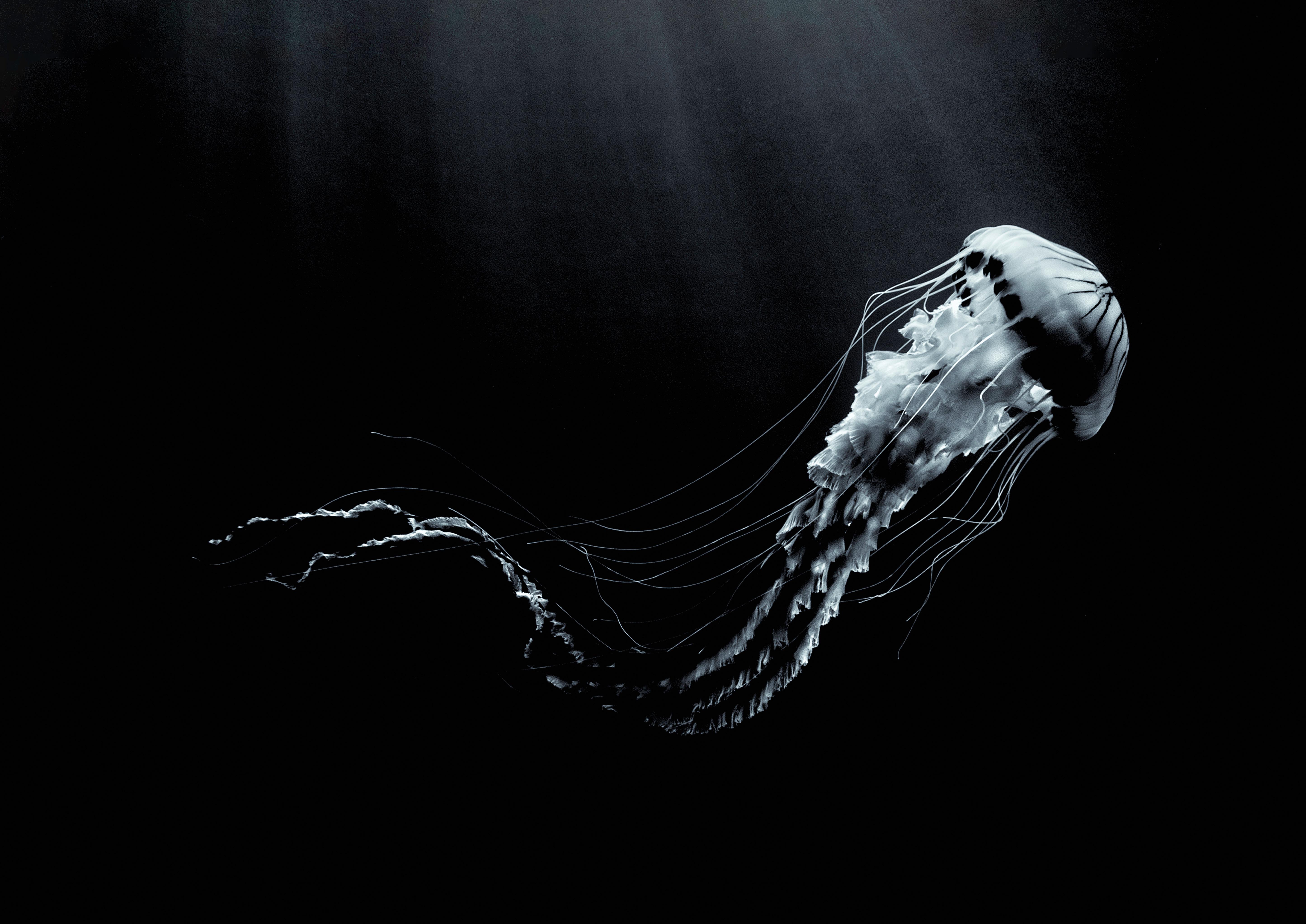
TheSeaWeBreathe.com now translated into 7 languages
9,000+km
2 of ocean under proposed protection
70,000+ native oysters deployed throughout the UK
290+ schools reached with educational activities and materials
23 reports, papers and consultation responses produced to support ocean protection
6
11 billion Nearly reached through in-person outreach activities & digital content 200,000+

400 outreach tools and activities delivered
Over 35,000 direct beneficiaries such as interns, community members, schools & postgraduate students opportunities to see press editorial
21 reports reports, papers and case studies produced to support marine restoration
10 reports, blogs and case studies shining a light on damaging activities
& published papers developed to showcase sustainable & equitable marine management
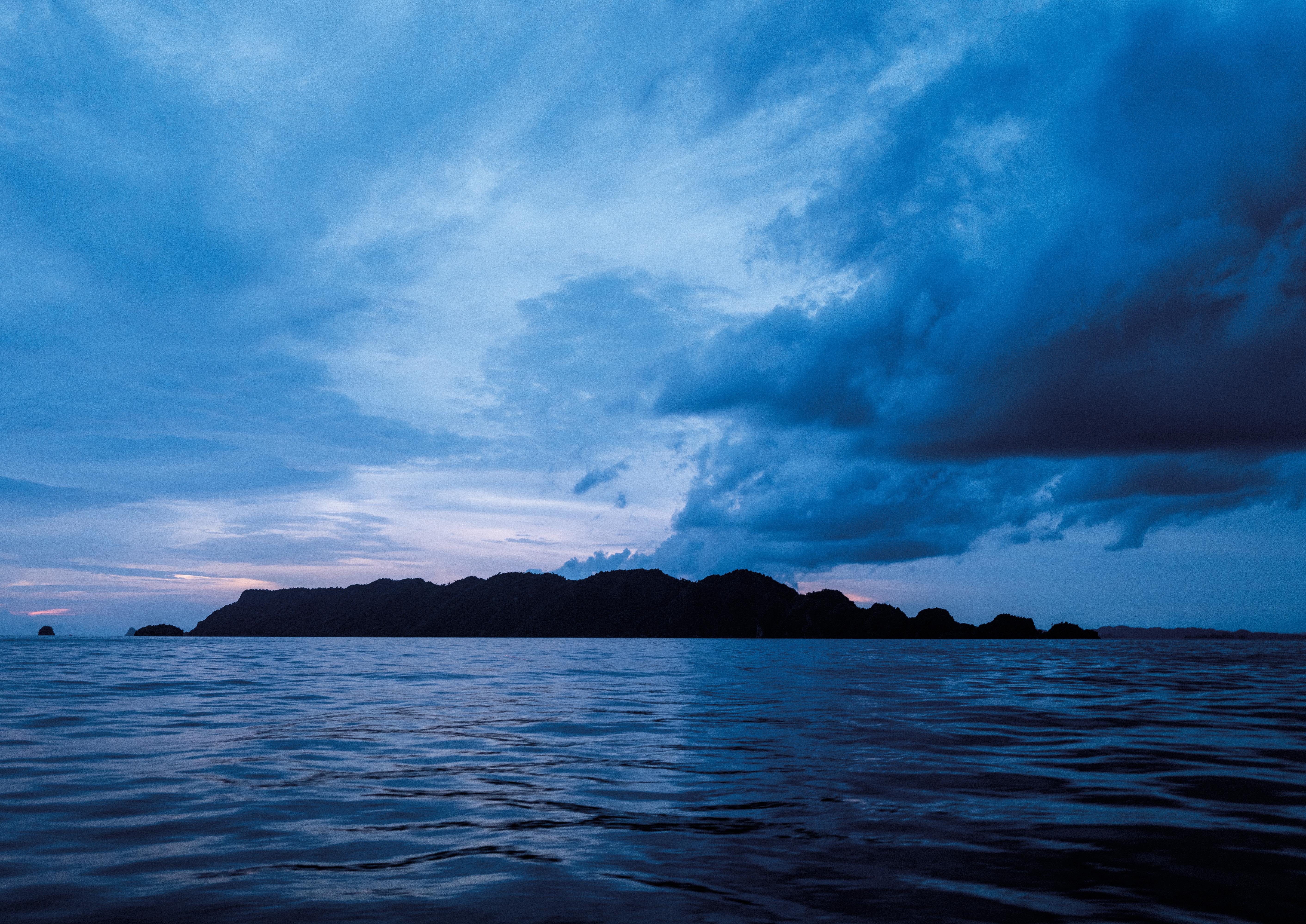

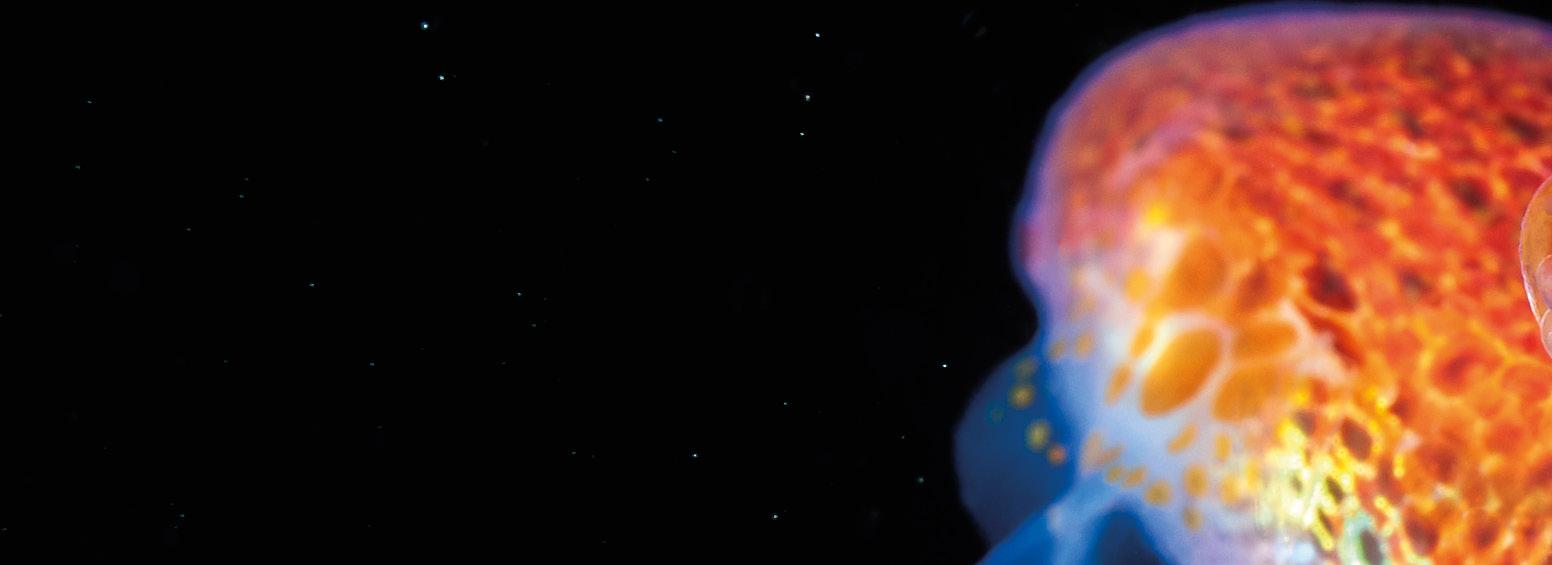
Deep-sea mining threatens the last untouched ecosystem on Earth. Our campaign for a moratorium helped turn government policy on its head.
Way below the water line, far into the abyss, sits the ‘deep sea’ — home to some of the least explored, most vulnerable habitats on earth.
Once considered empty and lifeless, it is now known to be a rich mosaic of ecosystems, populated by unique animals.
Hydrothermal vents in the earth’s crust may well be where life began. Corals that survive entirely independently of the sun’s energy can live for thousands of years. Many of the world’s strangest creatures live here, like the Greenland Shark, the world’s longest-living vertebrate, which swims at a glacial pace and can live for 500 years.
It’s difficult to imagine what might disturb such an inaccessible part of the planet, but man’s appetite for extraction seems to know no bounds. Deep-sea mining now poses an existential threat to marine life here. Proposed new mines would on average occupy 8,000 sq km – compared to the largest terrestrial mine, which covers less than 10 sq km.
Deep-sea mining would ignore the precautionary approach to which countries around the world have committed through treaties such as the UN’s Convention on Laws of the Sea, High Seas Treaty, and Sustainable Development Goals. As well as causing untold damage to Earth’s last untouched ecosystem, where scientists
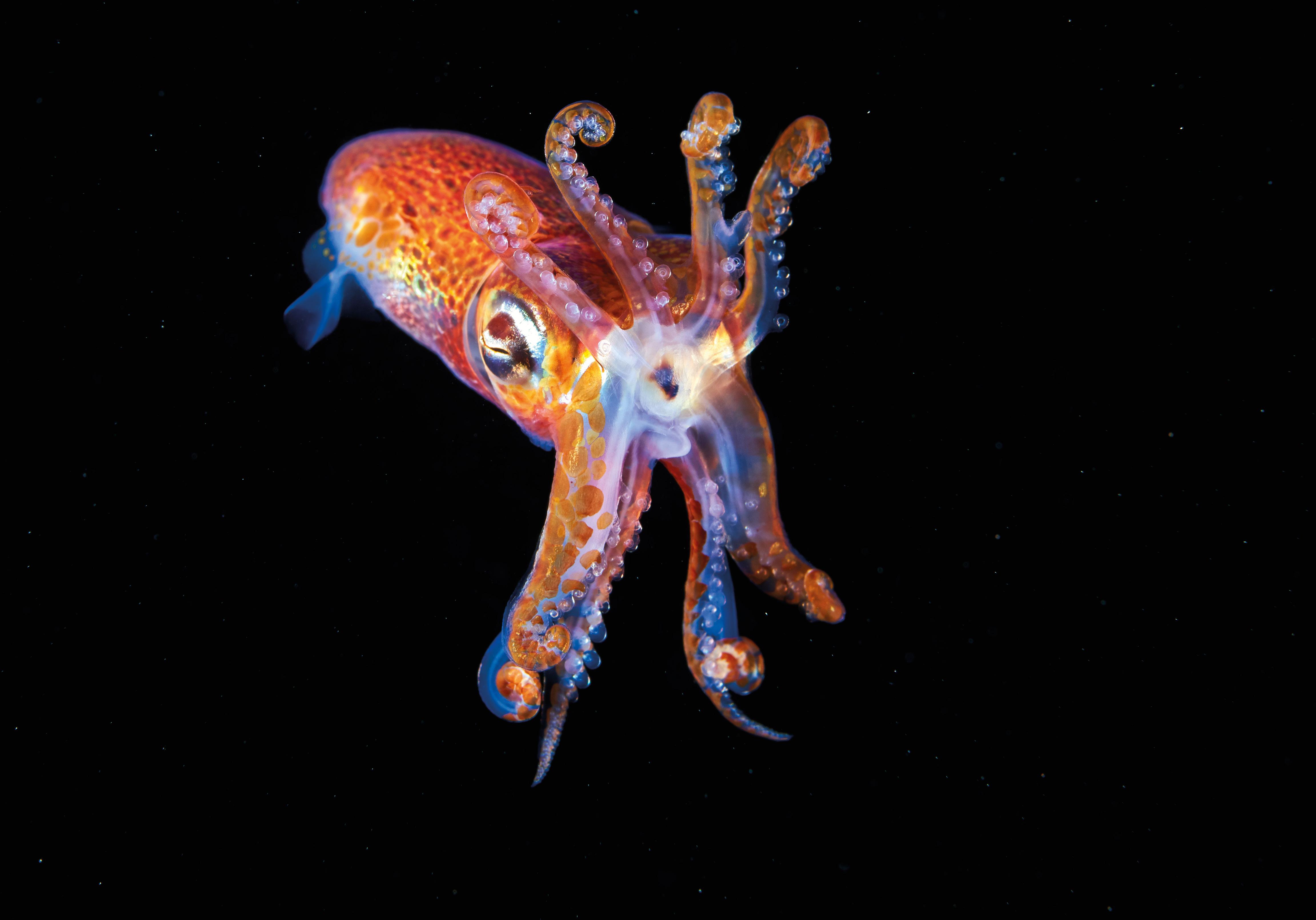

“Blue Marine has a creative and tireless team - you deserve every credit for making this happen”
ROHAN SILVA, CEO AND COFOUNDER OF SECOND HOME AND FORMER SENIOR POLICY ADVISER TO DAVID CAMERON

believe half a million species are yet to be discovered, mining debris would pollute the habitats of whales, dolphins and other marine life, depriving the water column of light and oxygen.
For years, a number of NGOs (many of them members of the Deep Sea Conservation Coalition) have pushed for the UK to adopt a progressive and conservation-minded stance. In support of these calls, in 2023 Blue Marine sought to influence the UK government to change its position on deep-sea mining. Working with partners Minderoo Foundation and Hanbury Strategy, we ran a media and policy campaign that spanned press, social media, public petition, influencer outreach and lobbying events.
Coverage in iNews of our exclusive report exposing a £2.3 trillion gap in the financial model for this destructive practice was followed swiftly by Labour support for a moratorium. That began a full press exposé of the topic, including opinion pieces - in the Times by William Hague, and in the Independent by Lord Zac Goldsmith. The social media campaign was supported by influencers including Chris Packham, Lizzie Daly and Tori Tsui.
Main
The combined pressure saw a parliamentary petition, initiated by the Environmental Justice Foundation and supported by Blue Marine, close at more than 35,000 signatures. A month later, the government announced it would support a moratorium. Defra's press release featured a quote from our CEO, Clare Brook, which was carried widely in the national media: ‘There are cheaper, cleaner and more secure ways of producing minerals as the world transitions to net zero without causing the catastrophic and permanent destruction of fragile ocean life.’
When the UK government announced fishing quotas above scientific advice, Blue Marine thought it was time to take their decisions to judicial review.
Overfishing is the most destructive activity in the ocean, and public awareness of that fact is at a high. Yet when it comes to the annual allocation of fishing opportunities, the UK government is like a stuck record. It is out of step with global best practice and doesn’t seem to know how to improve.
In December 2023 the government announced 750,000 tons of fishing quotas for the next year, worth some £970 million. Included in this handout were opportunities to catch species that scientists advise should not be fished at all, including Channel pollack and Irish Sea sole. Yet - incredibly - ministers claim that ‘sustainability has been at the heart of the UK’s approach to negotiations.’

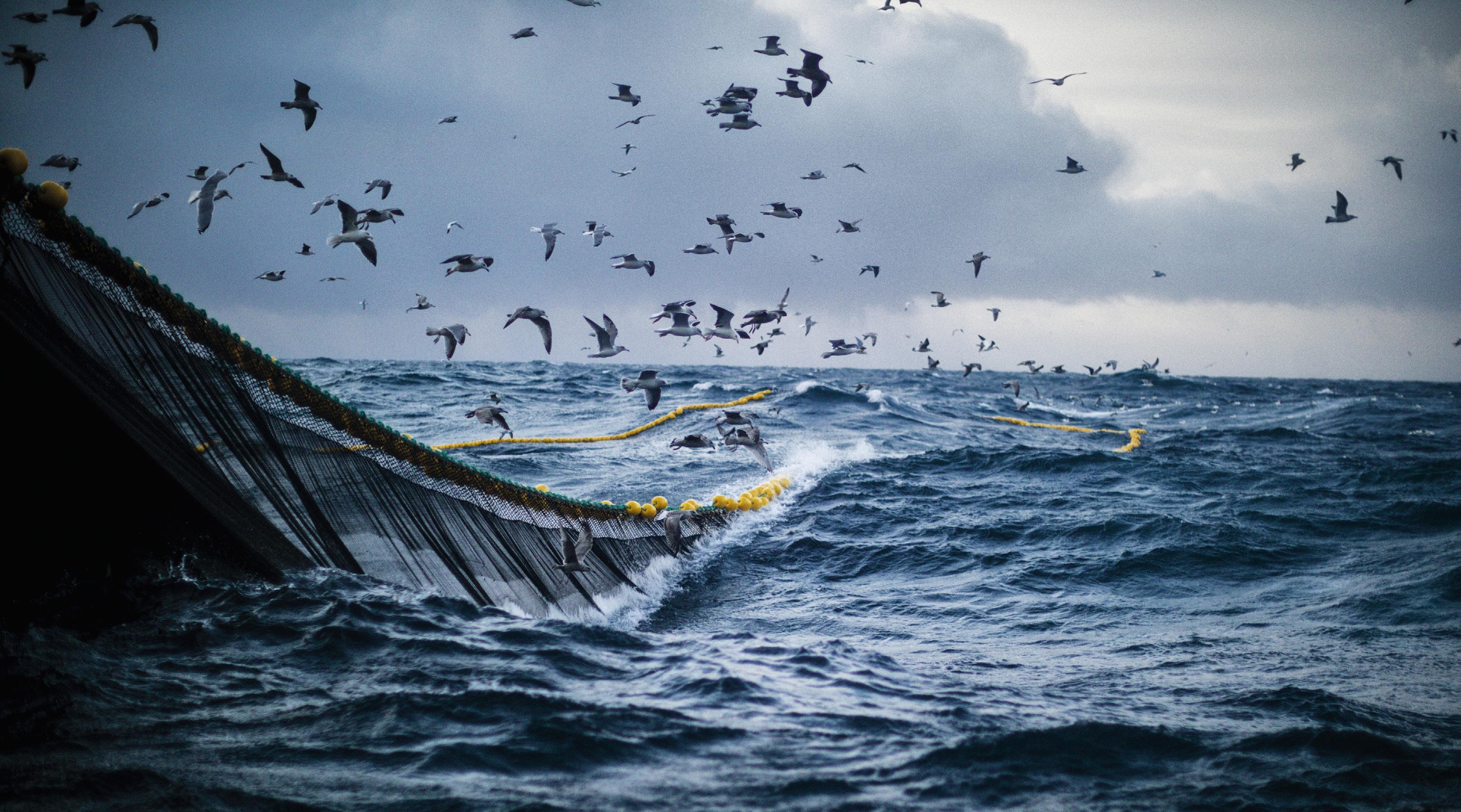
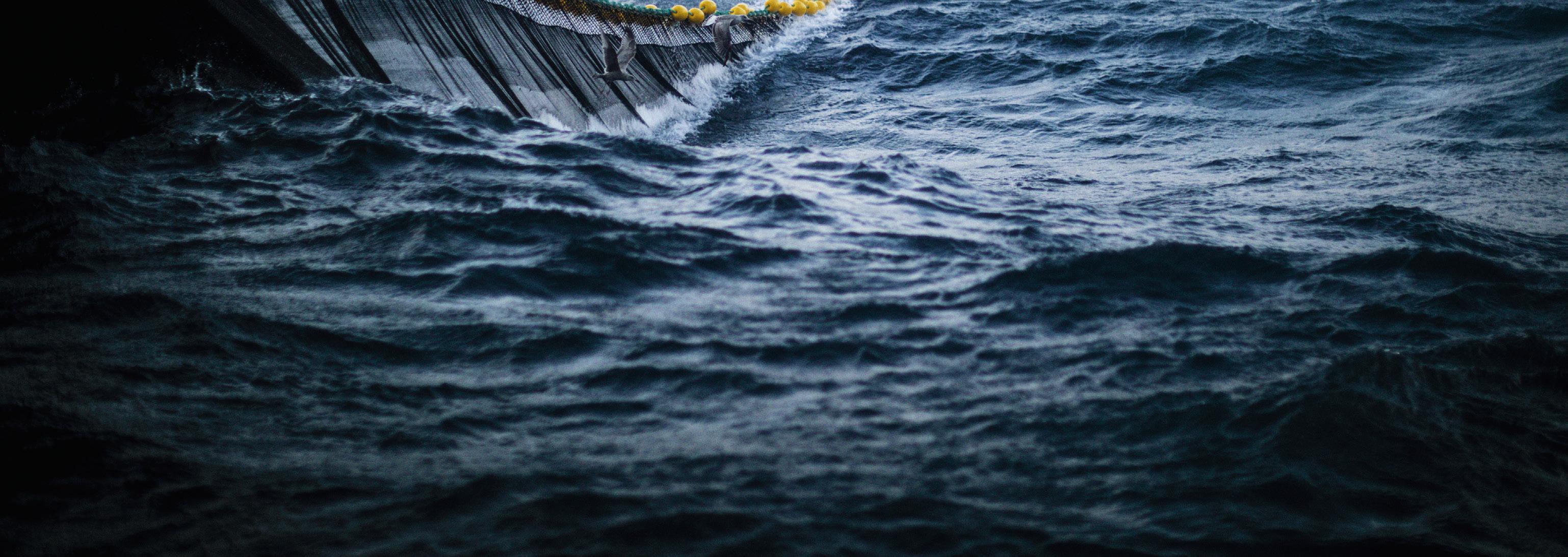
This was the third year in a row that more than half of all the fishing opportunities shelled out at the end of the annual negotiations between the UK, Norway and the EU were above scientific advice. That means overfished stocks. Celtic sea cod, for example, will go on being fished into even deeper decline so that vessels can go on fishing for other species.
When are these overfished stocks ever going to recover if we keep overfishing them? It’s a logical impossibility. What happened to the ‘world class’ fisheries management regime we were promised on the eve of Brexit?
The law calls for both sustainability and transparency in making decisions. Blue Marine’s lawyers believe the law has teeth, but it isn’t being applied.
As Tom Appleby, our chief legal affairs adviser, told the Times: ‘Normally, if you look at a decision in an area where public goods are at stake, there is a wealth of
information made public. There is more information publicly available about my neighbour’s small rear extension than about the UK’s decisions on the public’s fisheries.’
Blue Marine wrote a series of legal letters to the government in 2022 warning that the law was being broken. We hoped that sense would prevail. It hasn’t.

“There’s more information publicly available about my neighbour’s rear extension than about the UK’s decisions on the public’s fisheries”
So in the light of the ministerial decision once again to distribute our precious wild resources in an irresponsible manner, we have written to ministers informing them that we will be seeking leave for judicial review of their decisions early in 2024.
Let the legal battle against overfishing begin.
“Our investigations team have proved time and time again that no issue is too farreaching, too difficult or too intimidating for us to tackle”CHRIS GORELL-BARNES, BLUE MARINE CO-FOUNDER.

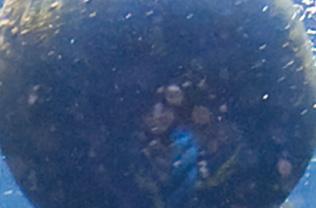
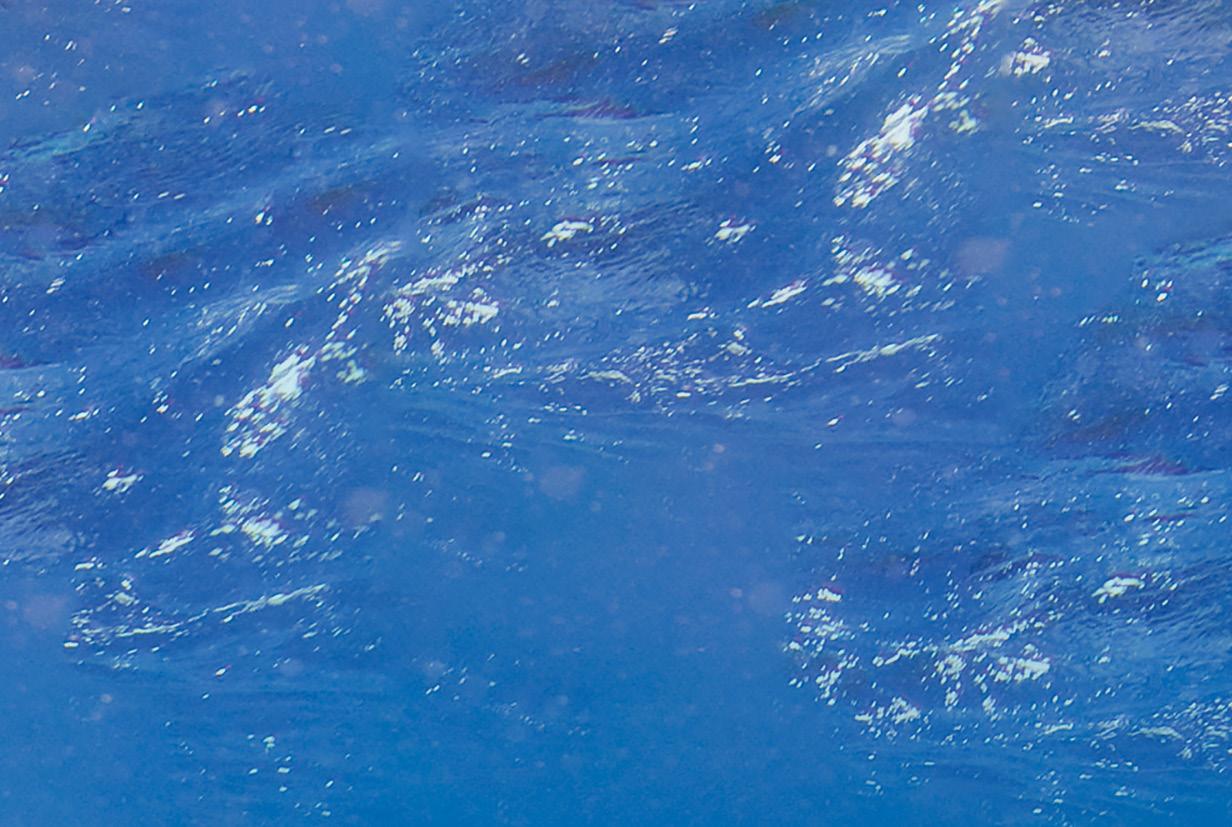

Our campaign combated the use of harmful fish aggregating devices and put pressure on UK shops to stop selling fish caught this way in the Indian Ocean.
There is a crisis unfolding in the Indian Ocean, where two out of three of the region’s tropical tuna stocks are overfished. Despite being a distant-water fleet, in 2022 EU-owned commercial purse seine vessels took 32 per cent of the region’s total tropical tuna catch.
This is particularly concerning given that the Spanish and French-owned industrial purse seine fleets rely heavily on the use of harmful drifting fish aggregating devices (FADs) to make their catch. Drifting FADs are floating rafts with long tails that are allowed to drift freely around the ocean for months – often through marine protected areas and the exclusive economic zones of other countries. They gather tuna beneath them, while being tracked from afar by the fleets that deploy them.
Not only are drifting FADs lost or discarded in their thousands, resulting in pollution and damage to sensitive marine habitats, but countless non-target species like sharks and turtles also fall victim to them, either as bycatch or through entanglement. Worse still, FADs facilitate the capture of millions of juvenile tuna; of the already overfished Indian Ocean yellowfin tuna caught by purse seine vessels on drifting FADs, 97 per cent are juveniles.
In February, Blue Marine successfully campaigned for an improved management measure for drifting FADs. This prohibited their

use for a 72-day period each year, giving tuna stocks a chance to recover. However, despite the EU supporting similar measures in other oceans where its fleet does not fish as much, it objected to the new measure in the Indian Ocean, making the Spanish and French tuna fleets exempt. Blue Investigations partnered with BLOOM to take legal action against the European Commission for this objection, as we believe it to be in breach of EU law and, in particular, of the precautionary principle.
In November, Blue Investigations went a step further by publishing the results of a six-month investigation into the canned tuna sold by UK retailers. The report found huge disparities between the sourcing policies that cover the ‘own-label’ tuna of most UK retailers, and the brand-name cans that they sell alongside it. Only one of the UK’s top ten supermarkets – Marks & Spencer – was able to demonstrate that none of the canned tuna sold in its stores is caught using harmful drifting FADs.
Blue Marine will continue to put pressure on UK retailers to stop selling tropical tuna caught around drifting FADs in the Indian Ocean.
"Our investigations team have proved time and time again that no issue is too far-reaching, too difficult or too intimidating for us to tackle. Their courage and determination to leave no stone unturned has exposed some of the greatest travesties happening in our ocean, and this amazing tenacity is unlocking huge conservation gains” - Chris Gorell-Barnes, Blue Marine co-founder.
In 2022, we ensured Dogger Bank was protected from trawling and dredging. Charles Clover took a boat to inspect the vast MPA and found signs of recovery in a busy seascape.
4am. We woke, after 20 hours of steaming, at a place called Boulder Bank. We were not alone. A mile behind us were the yellow, red and white lights of a gas and oil rig in the Trent field. A few miles to the north was a rig in the Cavendish field. To the east were the lights of a wind farm under construction. As it got light the calm sea was a milky blue, thanks to the suspended particles churned up by overnight storms.
This was our first impression of Dogger Bank, an area nearly the size of Belgium that is the largest marine protected area in British domestic waters. On paper Dogger Bank also has the same protection in the parts of it that belong to Holland and Germany, though only Britain has yet banned trawling and dredging, the most damaging activities.
We came to look at the state of the seabed in the week that Rishi Sunak announced at COP28 an £11 billion deal between energy firms that will make the wind farm on Dogger Bank the largest in the world. He has also pledged to ‘max out’ oil and gas reserves. Nature conservation will have to compete with these activities – but the news is good so far.
Visibility was good for the drop camera survey planned by Emilie Reuchlin from our fellow environmental group the Doggerland Foundation. At first the seabed was what you might expect: mobile, wave-sculpted sand dunes with the odd worm burrow, a sand-eel, a flatfish, probably plaice, and a few bryozoans, such as hornwrack, a colony of animals often mistaken for seaweed. Later it was even more interesting: crabs, sponges, razor clams, a sea urchin, an anemone and then a succession of patches of dead man’s fingers – a kind of soft coral.

“We saw hornwrack, ocean quahog, a blenny, mermaid’s purse and dead man’s fingers… but all in the path of more wind, oil and gas development”
12,300+km 2
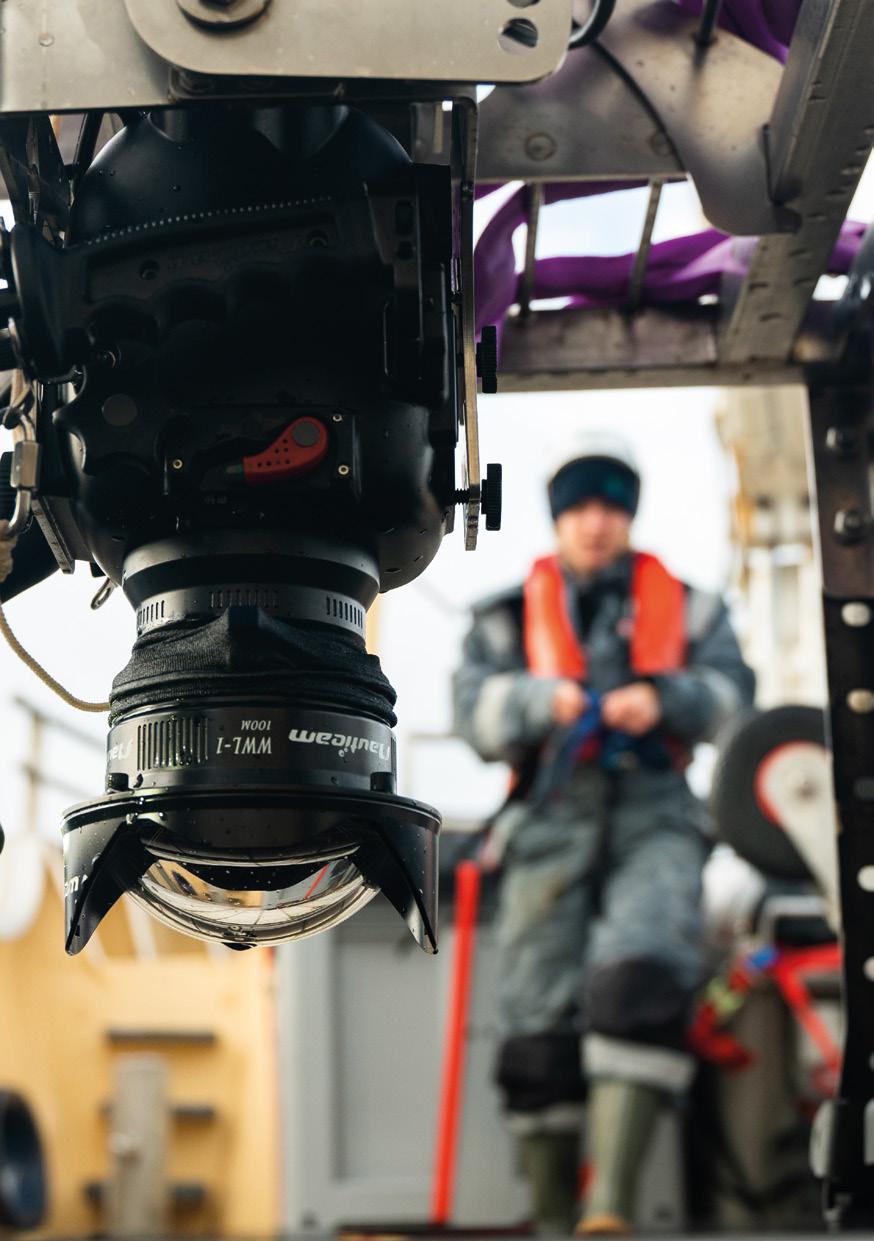




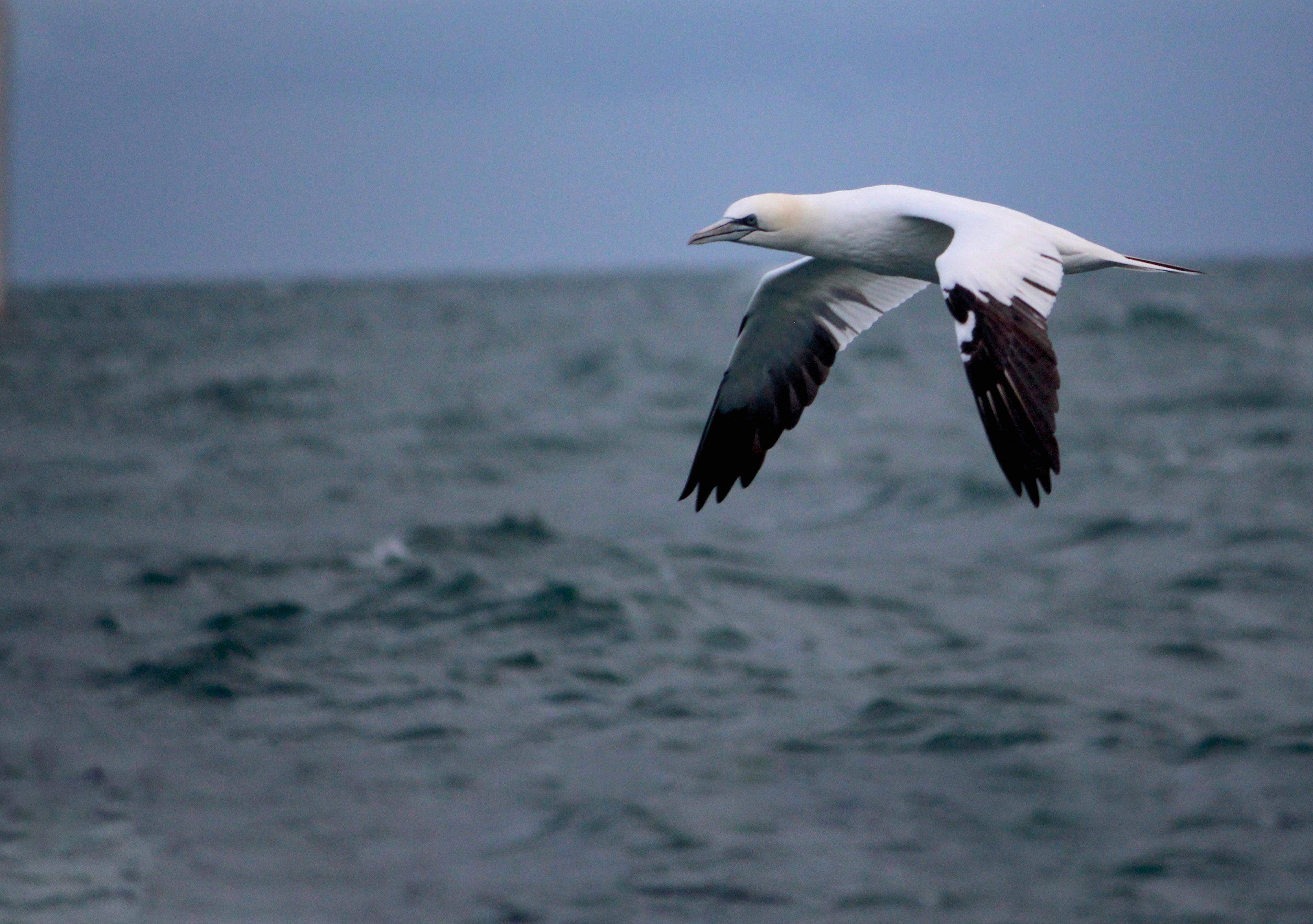
There were small fish – a dragonet, a blenny, some flatfish, what looked like a red mullet. There was the empty egg-case of a catshark. Emilie spotted a mermaid’s purse – the egg sac of a skate or ray – attached to a stone. She also spotted an ocean quahog, a kind of edible clam capable of living for centuries undisturbed.
The profusion of bird life was surprising. Along with the kittiwakes and fulmars that had followed the boat since it left port, we recorded gannets, great blackbacked gulls, herring gulls, common gulls, guillemots, puffins and the occasional little auk, a winter migrant from the Arctic. Suddenly, there was the head of a grey seal, untroubled by being some 70 miles from the English coast.
A wealth of crucial habitats and wonderful marine life had survived in this industrialised seascape. There is more work to be done to maximise the opportunities for nature recovery but the wind farming industry is supportive and Blue Marine is on the case.


Our campaign bore fruit as the Channel Island announced plans for a marine park that will quadruple the extent of its protected waters.
For the marine environment of Jersey, 2023 has potentially been one of its most significant years. In late October, the government of the Channel Island released its first draft Jersey Marine Spatial Plan (JMSP), and with it an opportunity to increase Jersey’s marine protection from six per cent of territorial waters to 27 per cent. Blue Marine’s campaign for a marine park has been integral in pushing the government of Jersey to propose such MPAs. If delivered, this level of protection could make Jersey the fourth most protected marine territory in the world.
We have been active in Jersey since 2018, initially supporting a PhD to monitor the island’s small existing network of MPAs. However, since 2021, our local team of two has been based on the island, engaging with the fishing industry, educating local communities and children, partnering with government and local organisations, and leading local research to help inform better management. Much of Blue Marine’s research has contributed to the evidence base that underpins the JMSP. Our ‘snorkel trail’ and low-impact seafood initiatives have also helped to strengthen the sustainable use of Jersey’s seas.
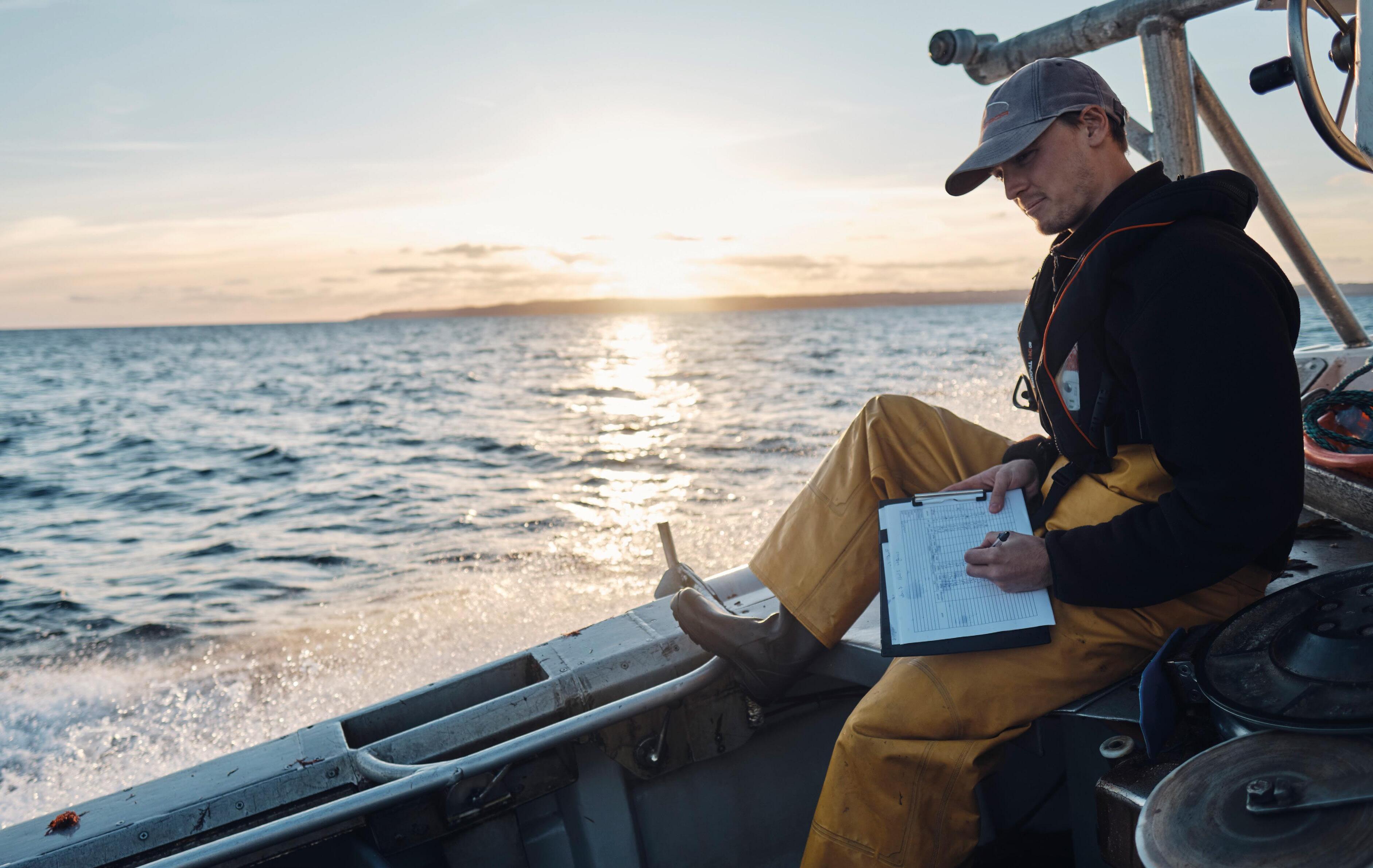

With 2,455 sq km of sea containing more than 3,000 known animal and plant species, Jersey’s marine environment is truly unique. Habitats include kelp forests, seagrass, maerl (a coral-like habitat) and shallow reefs, all of which support a healthy, functioning ecosystem. Under protection, habitats and species can recover and thrive, promoting biodiversity and securing long-term health and resilience.

feed, breed and thrive. But over the years we have seen declines in landings relative to fishing effort. The serious concerns around the health of our fish stocks, biodiversity loss, impacts of climate change and a diminishing fishing industry indicate that change is needed to mitigate these threats.
Now that Jersey has full control over the management of its waters for the first time since 1839, it is the perfect opportunity for the island to bring in the correct marine management to secure real, largescale and meaningful conservation through the JMSP.
Looking forward, it's vital that we give the proposed MPAs the best chance of being delivered. Community and political engagement will remain crucial in achieving this. Appropriate and effective monitoring of any designated MPAs will continue to be a strong focus of Blue Marine’s work, along with supporting and developing low-impact fisheries and ensuring best practice through management recommendations. We will also explore financing mechanisms to secure a long-term sustainable future for our seas.
The fishers of Amorgos devised a plan to save the waters of their Greek island. Now others need to copy it — across Greece and beyond.
Blue Marine expanded conservation work in Greece this year, focusing on the designation of marine protected areas (MPAs), threatened habitat and species protection, tackling invasive species and increasing national awareness of the marine environment.
Although small, a new MPA around Formikoula will protect one of the most important monk seal breeding sites in the Mediterranean. Events throughout Greece are promoting a new market in invasive species, reducing pressure on native marine life. We have mapped thousands of sq km of seagrass, a necessary step towards effective protection of it, and have built good relations with the Ministries of Environment and Fisheries, so that we can assist them in hitting their commitments to environmental protection by 2030.
In Amorgos, a beautiful Cycladic Island in the heart of the Aegean, the small-scale fishers have been trying to protect their waters from industrial fishing through a novel initiative named Amorgorama. This is led by the Amorgos Fishers’ Professional Association, who, through years of effort and with the


support of the local community, has been seeking to adopt a sustainable way of fishing, tackling the ever-increasing pollution of the Aegean coasts, and creating MPAs around their island.

partnered with Blue Marine, Cyclades Preservation Fund, and the Agricultural University of Athens.
Ten years ago, the fishers saw that their nets were coming back empty and their daily income was decreasing, so they decided to act. They submitted a management plan with the following pillars:
1 Abstaining from their fishing activities in April and May.
2 In those months, using their boats to collect plastic and other waste from the island’s most remote areas.
3 Voluntarily adopting additional fishing measures, such as changing the mesh size of their nets to increase selectivity.
4 Creating three permanent no-fishing zones.
This year, we secured the support of the state by signing a memorandum of cooperation with the Ministry of Agriculture (and Fisheries), the General Secretariat of Island Policy and the Municipality. We are currently in discussions with the relevant department of the Fisheries to secure funds from the EU Maritime and Fisheries Fund for the implementation of the management plan after the official designation of the MPA.
Once we succeed, Amorgos will be the first fishingprotected area designated by the Ministry of Fisheries that comes from local small-scale fishers willing to adopt measures to safeguard the sea and their livelihoods. Through this process, we are creating a new legislative framework to create MPAs in Greece.
“It's a very rare phenomenon when the fishers themselves propose protected areas”
STEFANOS KALOGIROU, ASSISTANT PROFESSOR, AGRICULTURAL UNIVERSITY OF ATHENS
There is great potential for this model to be replicated, as other island communities and fishers in the Cyclades and the rest of Greece are inspired to follow it. With our partners, we are already engaging with communities in neighbouring islands to empower fishers to follow models of sustainable, low-impact fishing, with the aim of creating more MPAs in the Cyclades, Greece and throughout the Mediterranean.
With partnerships around the world, the Convex Seascape Survey is unlocking the secret powers of the ocean floor to fight climate change.
Eighteen months into its five-year lifespan, the multi-million-dollar Convex Seascape Survey is now conducting research around the globe, and well on the way to making important discoveries. In a partnership between Blue Marine Foundation, University of Exeter and Convex Group Ltd, we have brought together experts to quantify and understand seascape and sediment carbon and how it is stored, or disturbed, in coastal shelf seas around the world. As a consortium of 16 partners (and counting!), with recent collaborations in South Africa and Australia, we are helping to increase local capacity for carbon measurement in these countries.
With the support of more than 20 early-career researchers, academics are making great strides towards closing critical knowledge gaps. Our data modellers have reconstructed how ocean currents have changed since the end of the last Ice Age, to discover where on the global continental shelves carbon is likely to be building up. This ‘beautiful model of oceans past’ is now a first-of-its-kind tool, which allows users to interact with any given moment or location in continental-shelf ocean history over the past 20,000 years.
We are producing carbon maps of existing data on all the continental shelves and have modelled how the ocean ‘breathes’ in and out, sometimes absorbing carbon dioxide from the atmosphere into the water column and sometimes spewing it back out. In British Columbia in Canada, renowned fisheries scientist Daniel Pauly has shared 70 years of global fishing data, allowing us to map where the most numerous instances of bottom-towed fishing intersect with the largest stores of seafloor carbon.

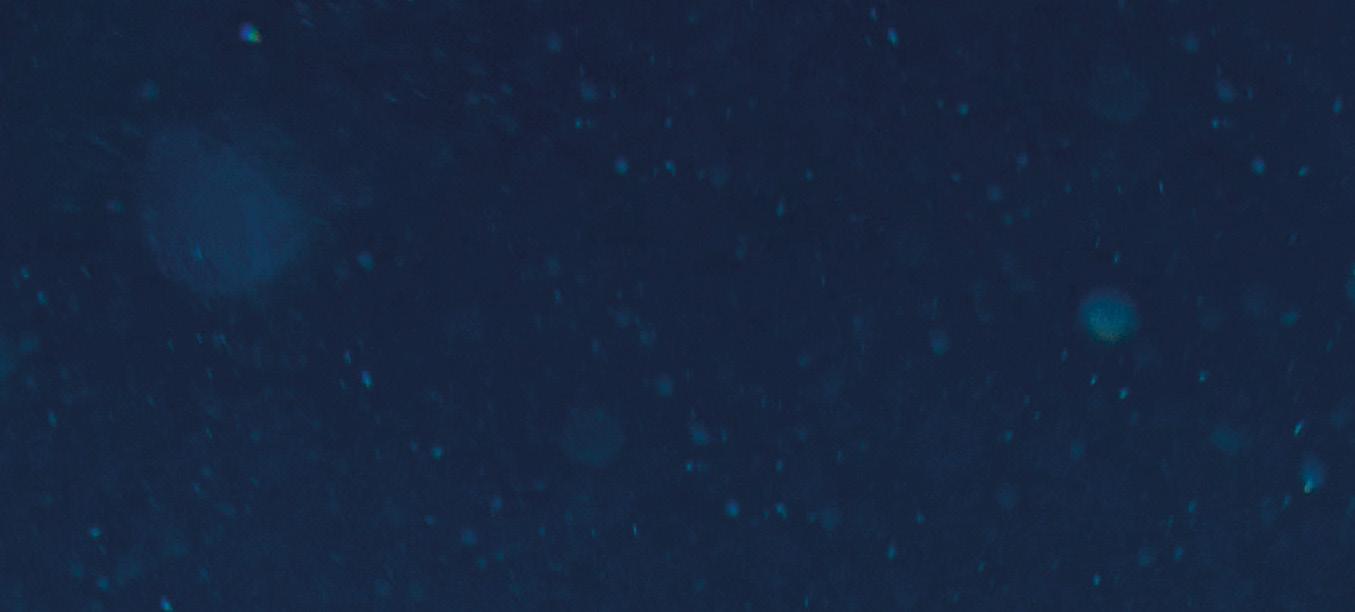
“This highly ambitious global project is providing catalytic data which will change the face of ocean carbon science as we know it”
With two field expeditions in the Western Isles of Scotland already under our belt, we have now categorised 17 different types of creatures living in and on the mud, for their effects on carbon movement and burial in the seabed. Profiled for the first time, these ‘functional groups’

Main image Sea mouse (Aphrodita marine worm) in bioturbation lab experiment. Below Convex team survey the seafloor in the Isle of Arran Marine Protected Area. Inset New Convex digital platform and immersive carbon experience
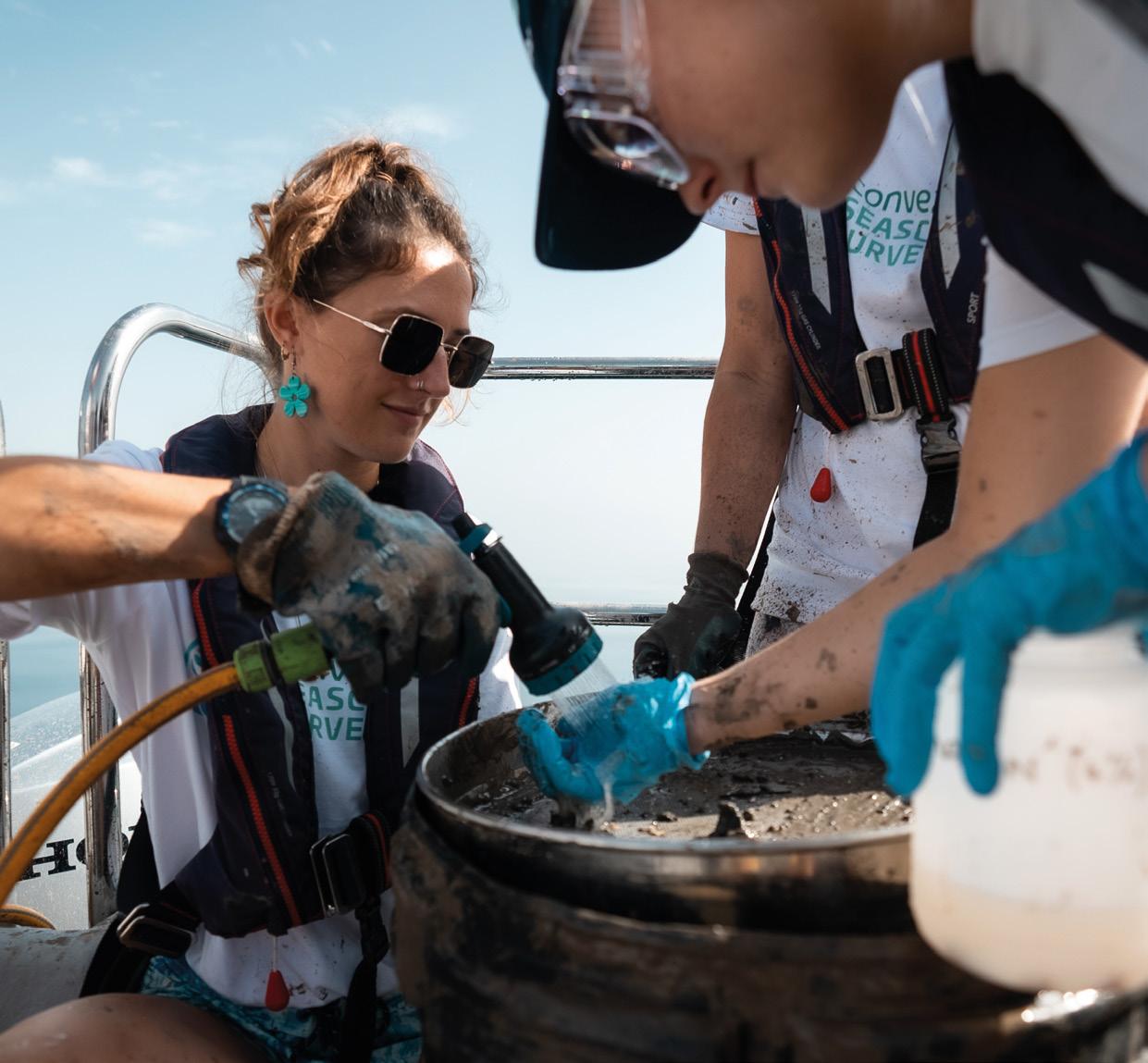
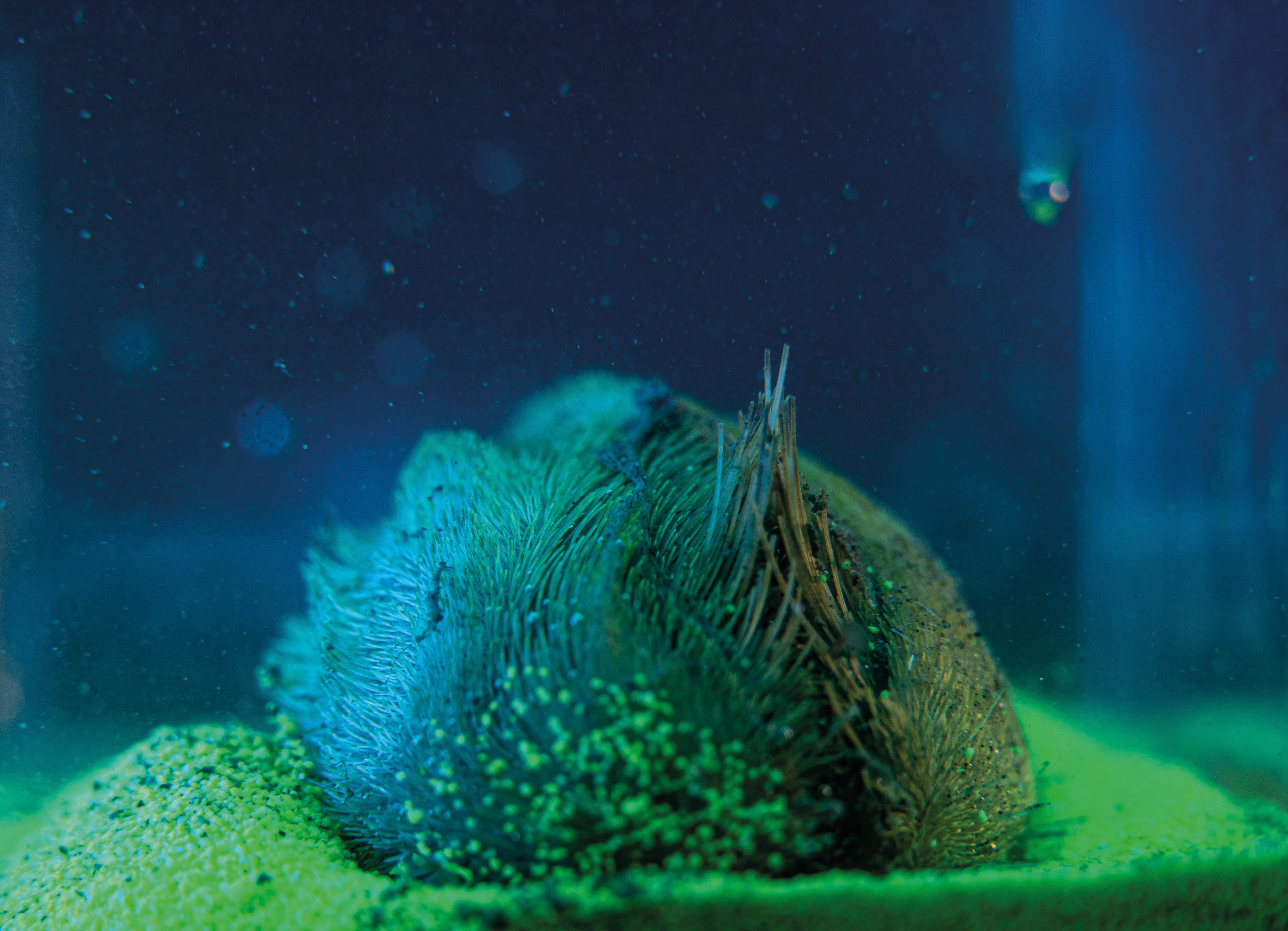
transcend traditional taxonomic categories. In the Isle of Arran marine protected area, the team has gathered vast amounts of data across different gradients of seafloor disturbances (trawling or dredging, and none) to help us build a picture of how seafloor and fish life respond to disturbance, and what effects it has on the seafloor's ability to store carbon.

As we move into 2024, we begin the tasks of collecting new sediment core samples to verify our carbon models and of producing carbon budgets for these shelf seas to place them within the context of global carbon stocks. Our goal remains to bring all this to life for our audiences in new, exciting and hopeful ways, as we discover ever more about the ocean’s power to mitigate climate change.
“This highly ambitious global project is providing catalytic data which will change the face of ocean carbon science as we know it. With the climate crisis bearing down on us, Convex Seascape Survey is delving to the seabed, employing new technologies and developing innovative modelling to unlock answers that the world may come to rely on for generations”George Duffield, Blue Marine co-founder.
20,000yrs

Blue Marine is shaped like an octopus: our projects are the body and our ‘units’ are the eight tentacles, acting independently or helping to feed the body. Blue Marine’s units are designed to challenge the way the ocean is governed and understood. They both support our location-specific projects and catalyse systemic change in their own right.



Users of our dazzling new VR voyage into marine habitats are guided by the voice of Helena Bonham Carter.
Blue Education’s mission is to educate and inspire all ages with free, accessible and imaginative resources and through handson education programmes. We hope to see an engaged and informed civil society who feel empowered to take action to protect life in our ocean.
In 2023, Blue Marine transformed ‘The Sea We Breathe’, our award-winning educational website, into a Virtual Reality experience. Guided by a voice-over from British actress Helena Bonham Carter, the experience explores three marine habitats: open ocean, kelp forest and seagrass meadow. This allows viewers who live far from the coast, or are unable to visit marine environments, to dive into the wonders of the ocean.
Additionally, Blue Education has translated ‘The Sea We Breathe’ into four more languages this year (now totaling seven), improving accessibility for people across the world. The most recent translation added to this portfolio is Arabic, which was launched in Dubai at COP28 to complement the VR experience.
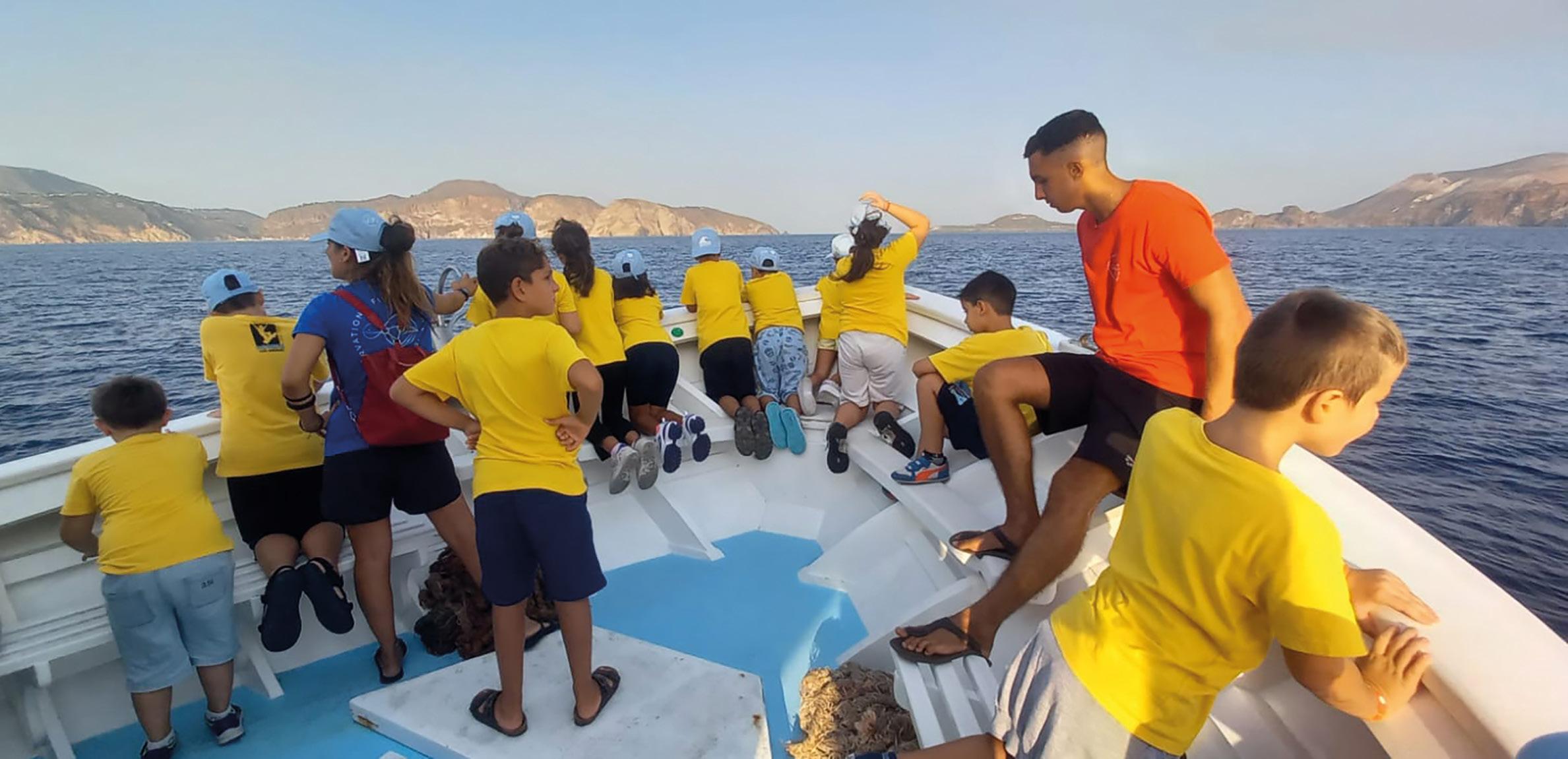


On the ground, we have continued to strengthen community and stakeholder engagement by supporting hands-on education projects in Italy, the Maldives, Namibia, Saint Helena, Italy, São Tomé and Príncipe, as well as closer to home in Jersey, Scotland and Essex. In the spring we partnered with the Essex Wildlife Trust to run oyster outreach sessions for Brightlingsea Primary School, in which the children took muddy and exciting field trips to monitor oyster populations and search for associated biodiversity.

This year’s new activities complement our existing ones, such as the Aeolian Islands education programme. Now in its fourth year, this community initiative reaches people of all ages, supporting responsible fishing and building local support for a marine protected area.
We look forward to focusing on activation and delivery in 2024, reaching schools and communities from all backgrounds with our refreshed suite of educational initiatives.
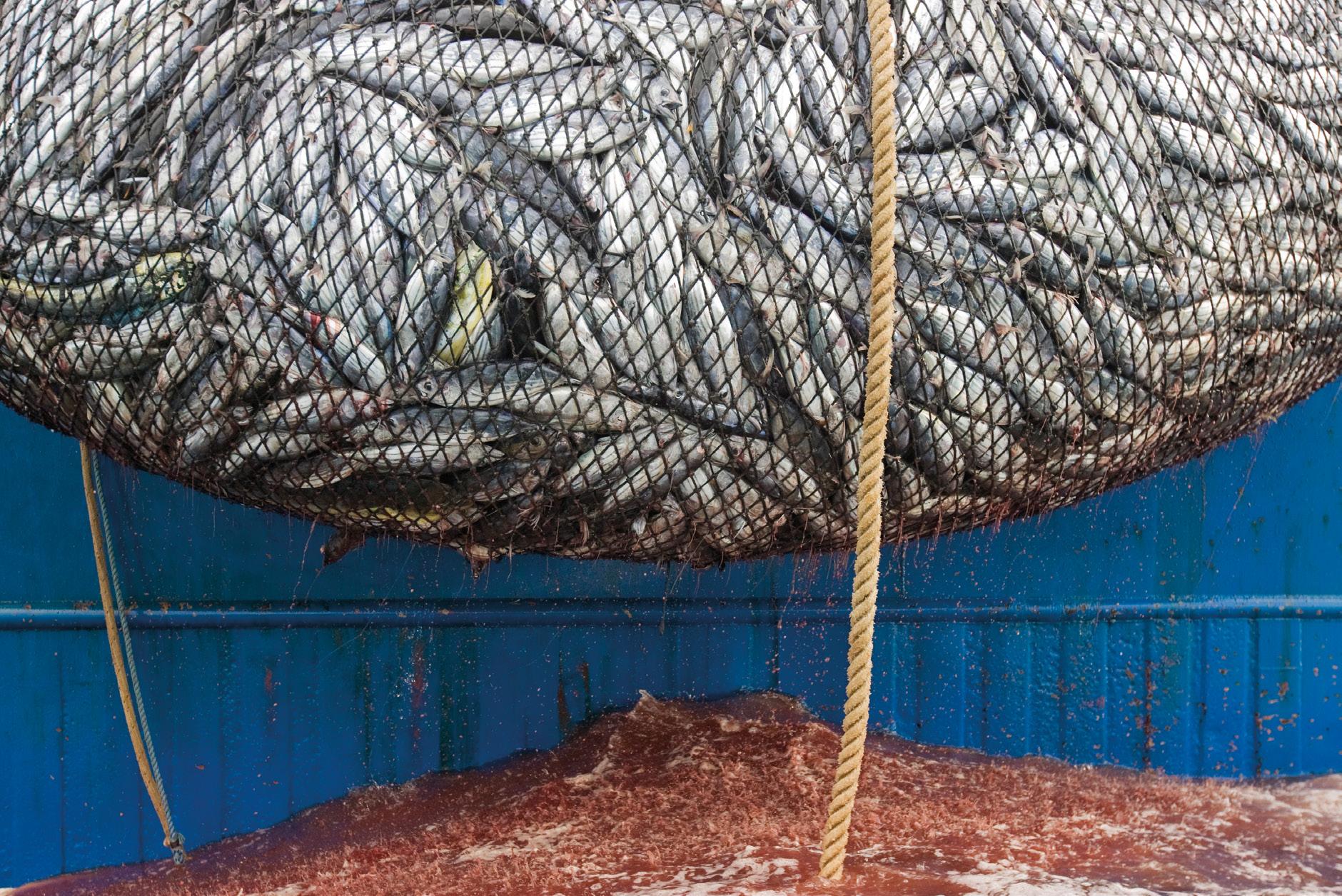
A data trail confirmed dubious activity by French and Spanish fishing fleets — and the UK firms that insure them.
In 2023 Blue Investigations made a greater impact than in any previous year. In addition to our efforts to combat the use of harmful drifting fish aggregating devices (outlined on page 18), our small team has also taken action against fishing fleets that routinely ‘go dark’ for months at a time by switching off their mandatory vessel tracking systems.
For the past three years, Blue Investigations has been collecting data on the misuse of the automatic identification system (AIS) by French and Spanish-owned fishing vessels that operate on the high seas. Working with partners OceanMind, we published two new reports this year – one covering the entire Atlantic Ocean and another focusing on the waters of Mauritius. These showed that many of the largest distant-water vessels went for more than a month at a time without transmitting on AIS, with one vessel going more than three consecutive months without a single AIS transmission.
In January, Cambridge University Press published a landmark, peer-reviewed legal paper written by Priyal Bunwaree, Blue Marine’s Senior Legal Counsel, which highlighted the illegality of this behaviour. Together with our partners BLOOM, Blue Investigations filed a complaint with the Paris Judicial Court against French tropical tuna-fishing vessels, for switching off their AIS in both the Indian and Atlantic oceans. In addition to highlighting the illegality of AIS misuse, the legal paper also found that the role insurers have to play in curbing this kind of illegal activity is ‘non-discretionary’.
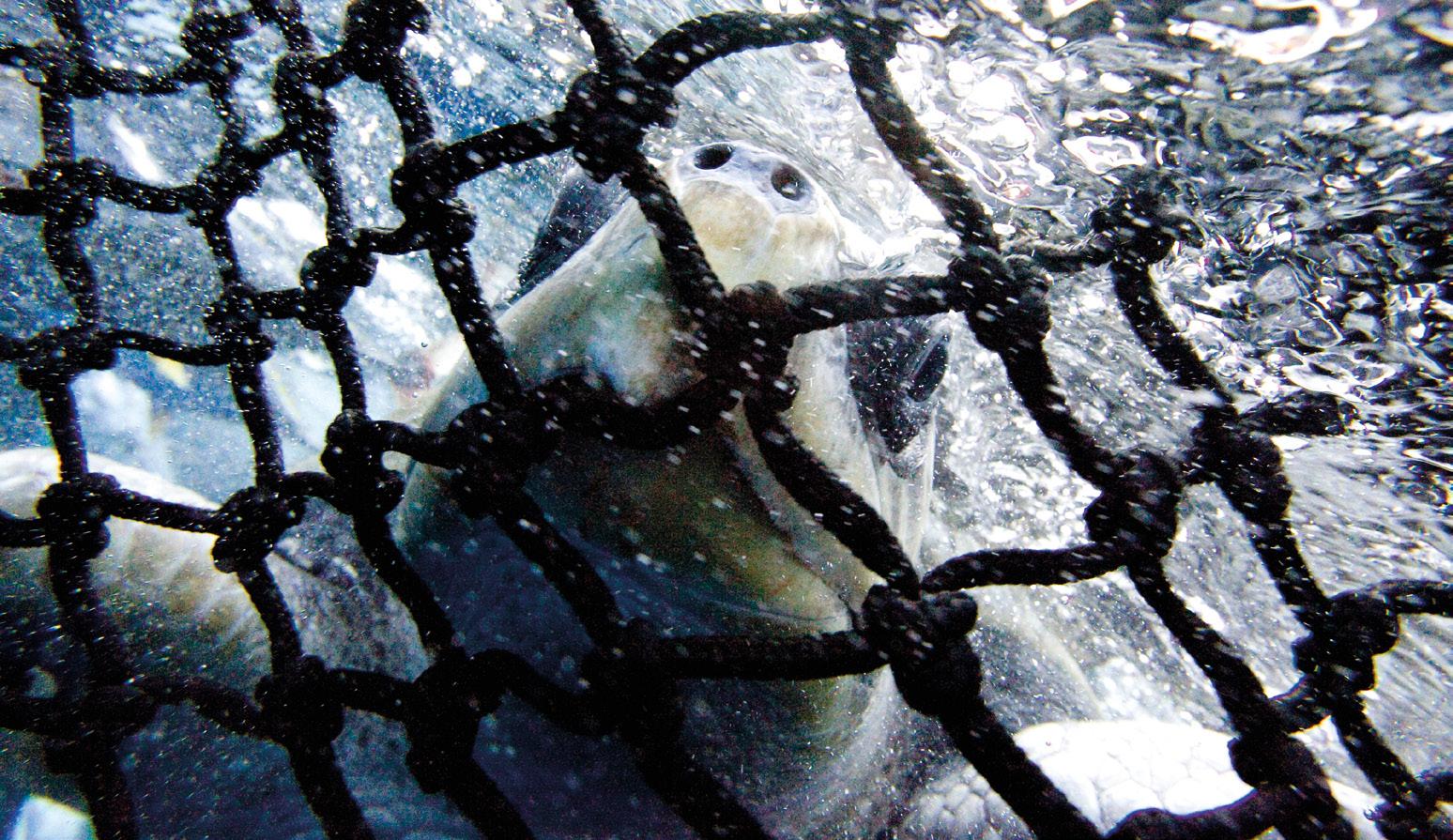

A subsequent investigation revealed that most of the worst offending vessels are insured in London, by just three P&I (protection and indemnity) clubs. Following this discovery Blue Marine submitted a formal complaint to the regulators of the UK insurance industry: the Financial Conduct Authority and the Prudential Regulatory Authority.
The complaint argued that EU-owned vessels operating in the Indian Ocean that go dark for months at a time are likely to be in breach of international, flag-state and coastal-state law — and that the UK insurance industry is enabling them by continuing to provide cover, thereby putting seafarers’ lives at risk. The story was covered by The Guardian, and Blue Investigations will continue to push the insurance industry to take seriously the threats posed by vessels going dark for months at a time.
'After discovering that the worst offending vessels are insured in London, Blue Marine submitted a formal complaint to the regulators of the UK insurance industry'
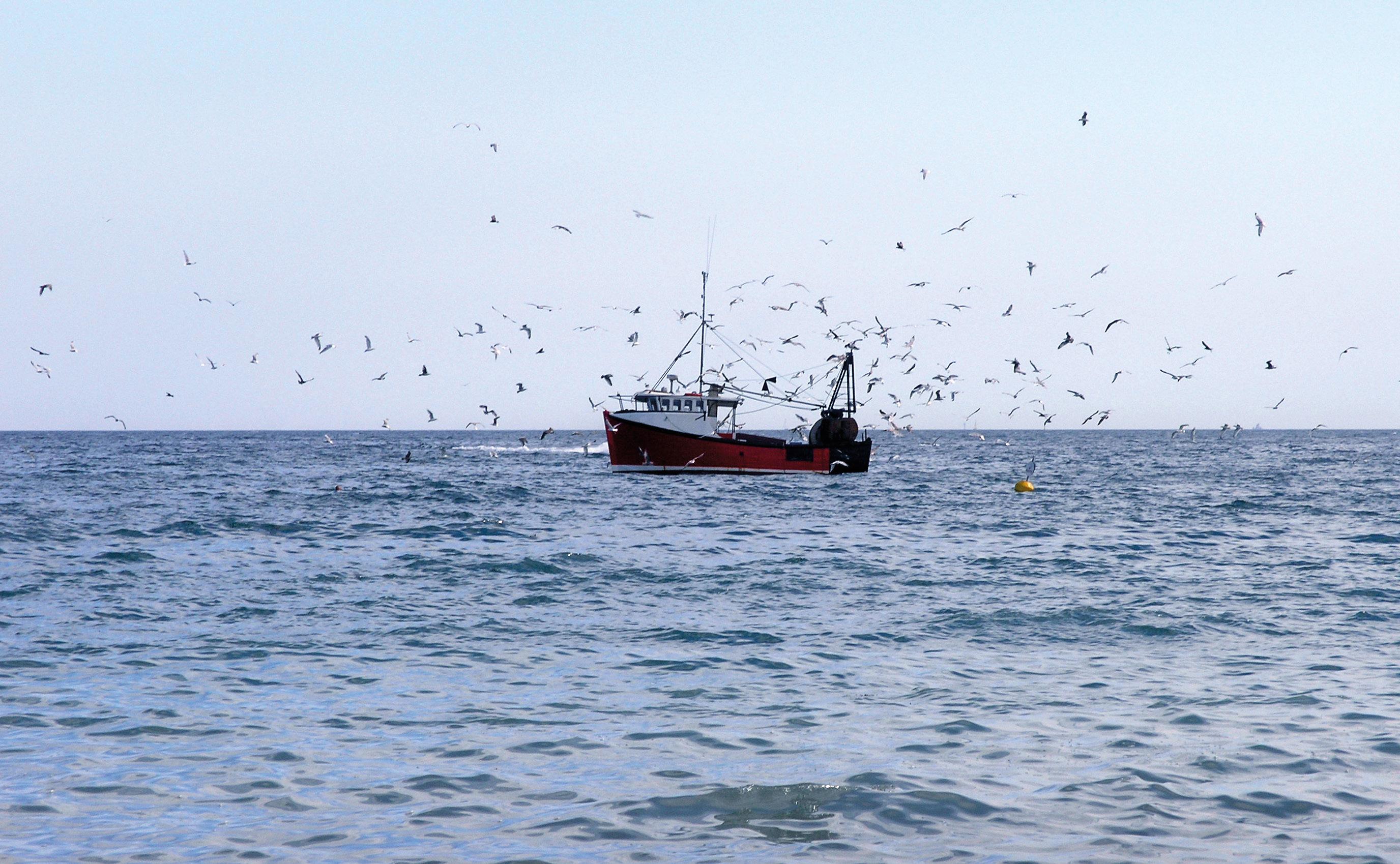

Be it drafting new laws or enforcing existing ones, our experts use legislation to press for environmental change.
Blue Legal works to achieve holistic change in law affecting the marine environment. In 2023 we expanded our team, and continue to work with external subject specialists.
In the summer we took preliminary legal action against the UK Government for granting fishing quotas above scientific advice — something it is doing persistently. This action established a legal precedent regarding the ownership of the UK’s fishery and how it should be managed: it is the public’s fishery, and the government has not just the power to manage it but a duty to maintain and enhance it. We are now engaged in detailed discussions with various government departments as to how this change in approach will be put into practice.
We are also building on the success of our Dogger Bank case — which protected the UK seabed across 12,000 sq km — by extending our efforts to other jurisdictions in Europe with a coalition of colleagues from other environment groups. Following success at a public inquiry over the water abstraction of Hinkley Point C nuclear power station, we are also scrutinising the process to ensure mitigation measures are taken and environmental compensation granted. At present, 800 acres of environmental compensation has been promised by EdF to offset the damage caused by the nuclear station’s water cooling system.
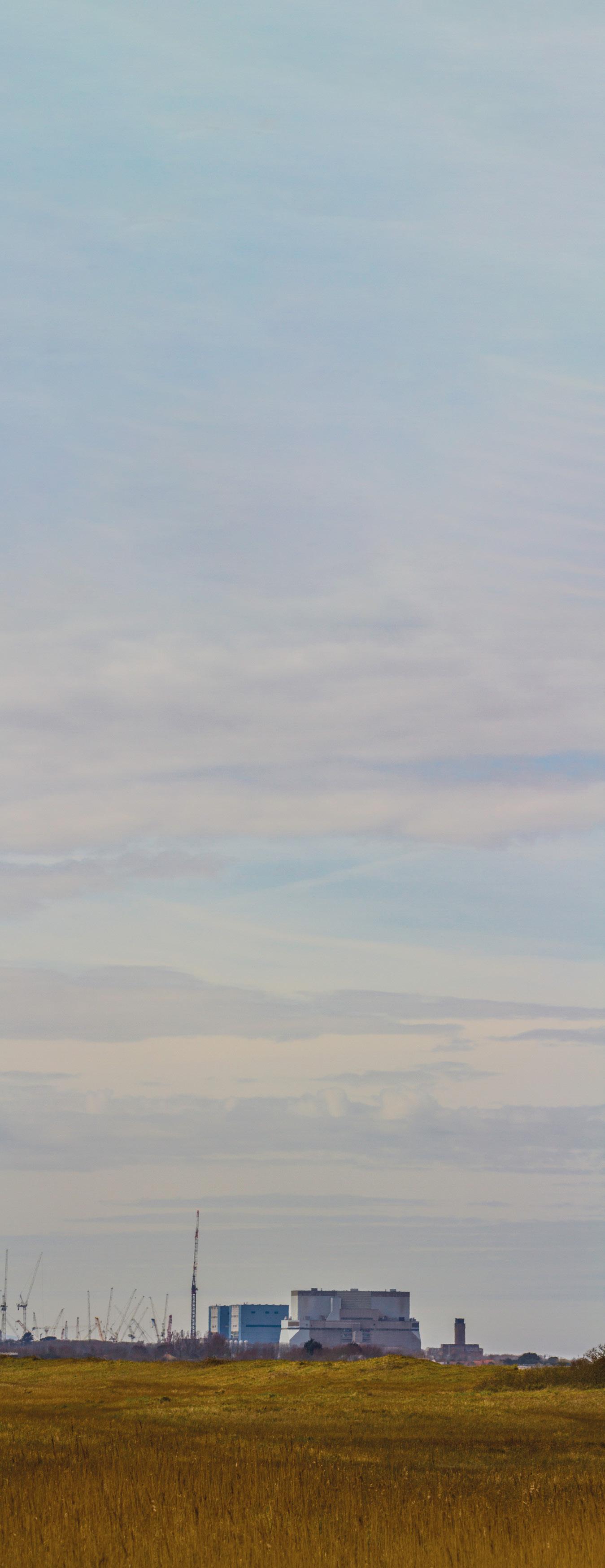


Following success at a public inquiry over the water abstraction of Hinkley Point C nuclear power station, we are also scrutinising the process to ensure mitigation measures are taken and environmental compensation granted.
Elsewhere: we supported our Investigations team over complaints against the EU distant water fleet; in the Dutch Caribbean we assisted with legislative drafting support; we are coordinating efforts to ensure that salmon farming complies with the law addressing its environmental impacts; and we advised Irish environment groups on forthcoming MPA legislation.
Our actions are informed by detailed and where possible public legal research, and we have produced two in-depth legal reviews for wide dissemination among stakeholders: one on poor fisheries management and its effects on coastal livelihoods; and a second on the lack of integration and transparency in EU marine environment law, and its deficient implementation.
In 2024 we aim for the UK’s fishery to be managed in the public’s interest and in line with scientific advice, for environmental law to start to bite on fisheries in EU MPAs, and we will engage more people with more projects.
From acoustic telemetry data on sharks to the habits of wild oysters, the Blue Science, Impact and Innovation (SII) team drives conservation through evidence.
The ocean is full of beauty and mystery, and with only around five per cent of it explored by humans, the scientific community is working rapidly around the world to learn more about the blue heart of our planet. Exceptional discoveries in 2023 ranged from thousands of new species on the deep seafloor to the world’s largest plant, a seagrass meadow in Australia.


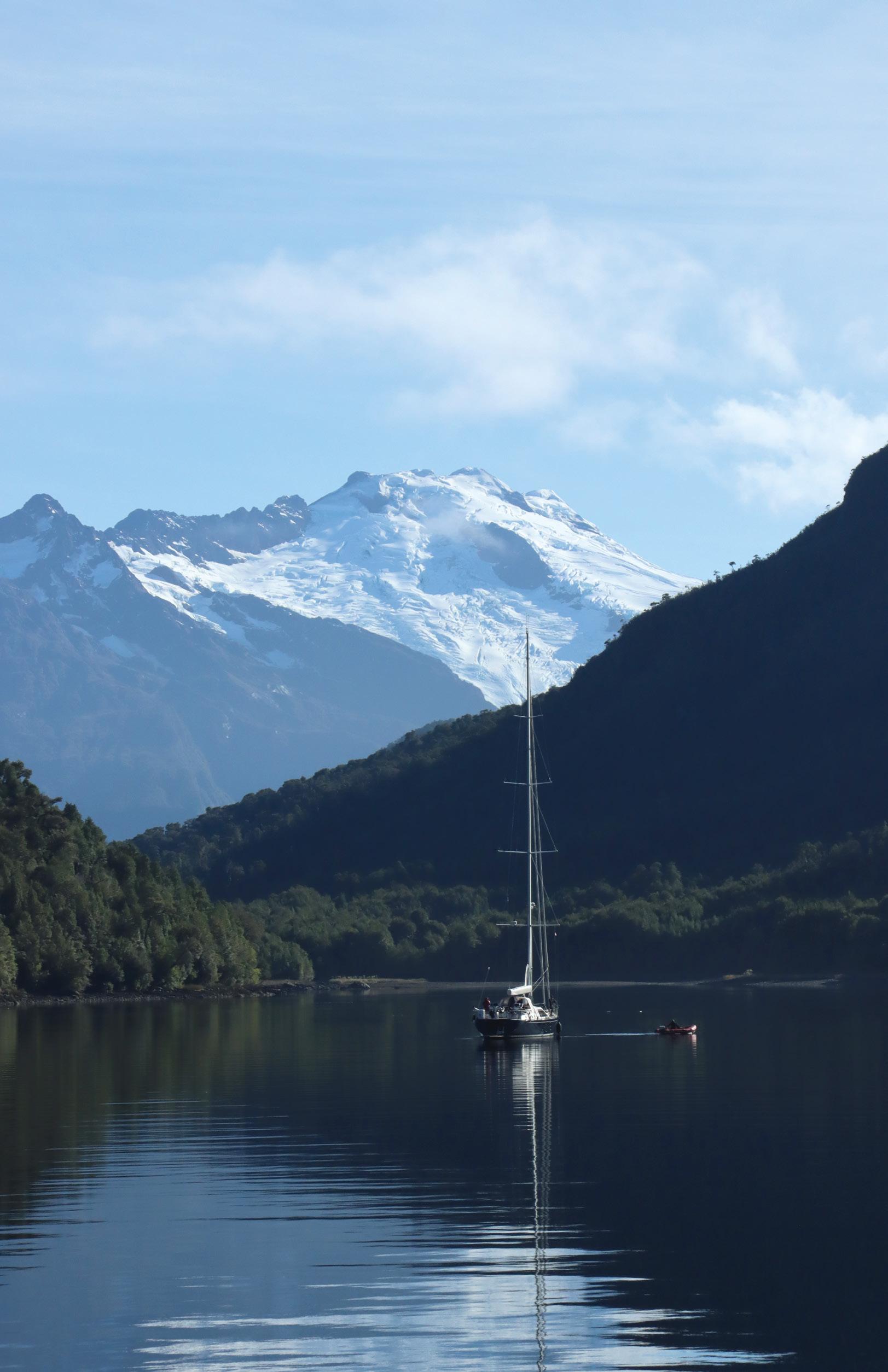

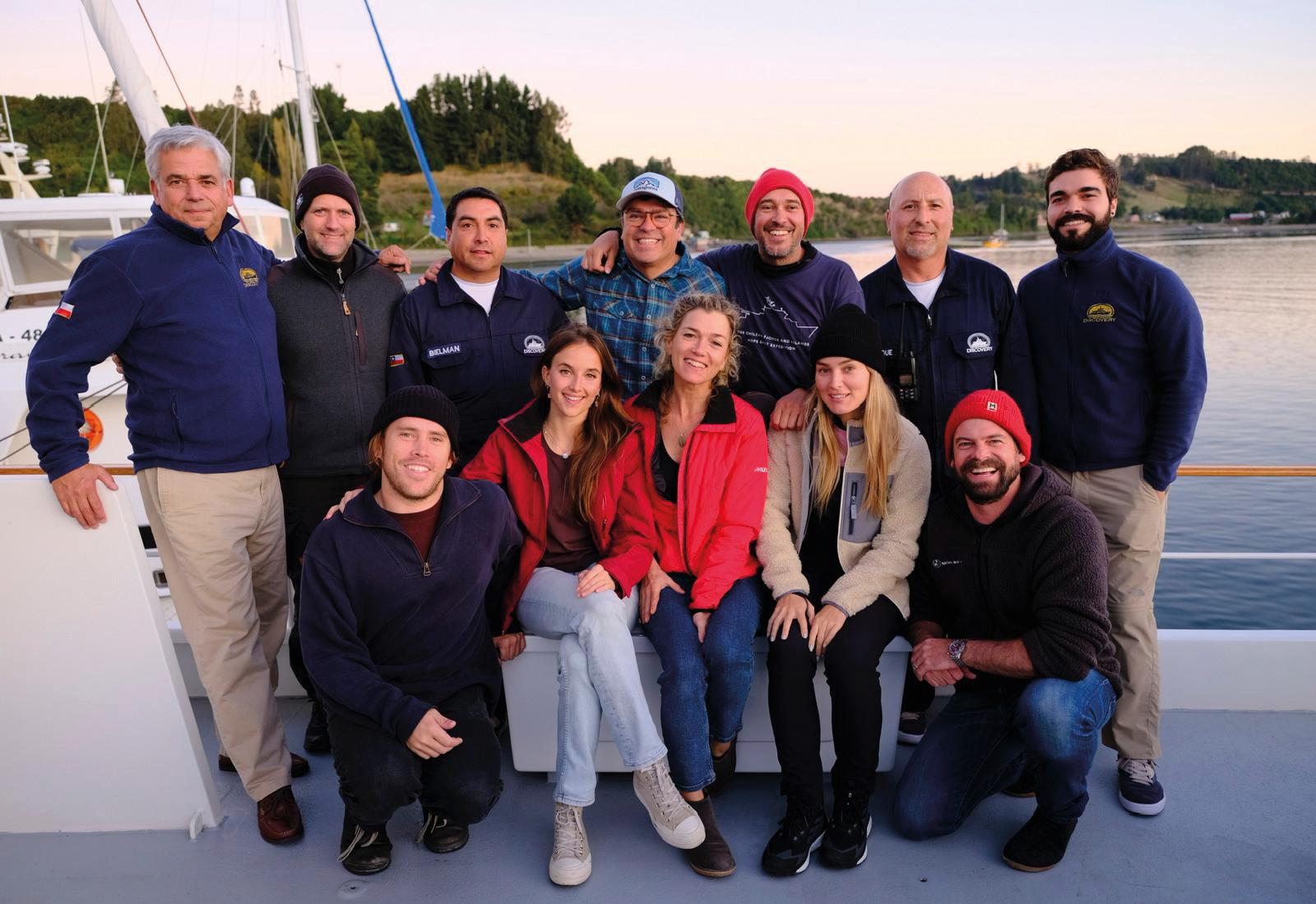

Despite all the wonders of the ocean, we are failing to protect it. In achieving conservation, gathering robust scientific evidence and conveying it effectively have a huge role to play. The focus of our work in the Blue Science, Impact and Innovation Unit (SII Unit) is to communicate our research; to provide reactive support to the Blue Marine team; to quantify the impact of our projects; and to identify ocean technology and innovation that is relevant to them.
In 2023, we supported the projects team to draw out key findings from surveys beneath the waves in St Vincent and the Grenadines, providing evidence-backed recommendations to the Ministry of the Environment to reform fisheries and MPA management. The team also supported our partners on the Dutch Caribbean island of St Maarten by analysing acoustic telemetry used to track the movement of sharks. With this data, our local project partners can explore MPA management to safeguard threatened species.
In the UK we have been building an ecosystem services valuation report in Scotland and have assessed biodiversity data to paint a picture of marine life for the Wild Oysters team. Our impact team have also been working closely with partners in Namibia to develop a streamlined monitoring and evaluation system for their ambitious project.
Joining forces with the Economics and Climate Units, we are tackling two major threats to the achievement of protecting 30 per cent of the ocean by 2030 (30x30): funding and climate change. This was touched on during the Blue Earth Summit meeting in Bristol, where we drove home the need for research and robust science to underpin financing mechanisms for ocean protection.
2023 also saw the soft launch of an Innovation Programme, where the Blue Science team will be facilitating the deployment of new technologies to accelerate protection, gather further insights from the field and help Blue Marine achieve the goal of 30x30.
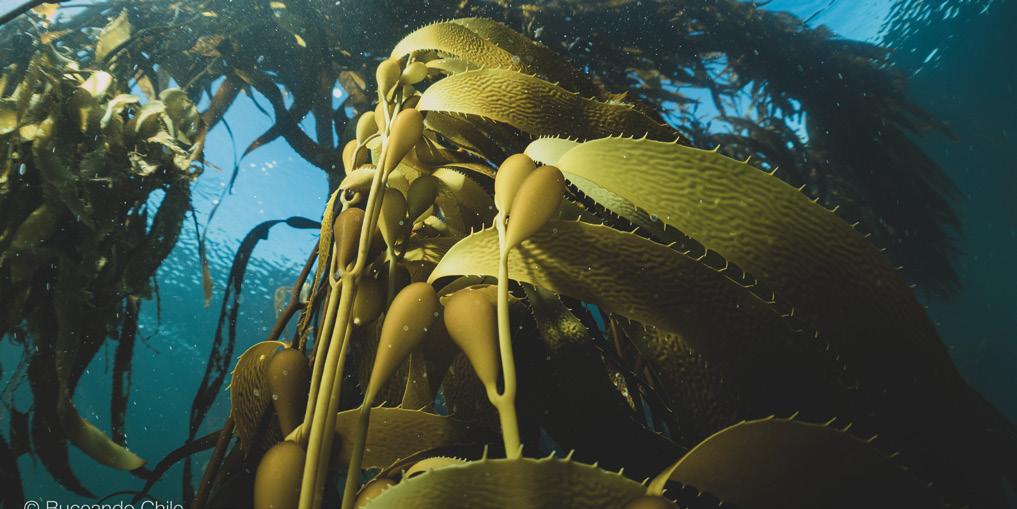
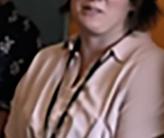





A barrage of lobbying by Blue Policy has covered everything from deep-sea mining to porbeagle sharks — and this year it paid dividends.
2023 was the busiest year to date for Blue Marine’s policy team. There has been a barrage of work around the new fisheries management plans, the reform of discard rules and the introduction of cameras on boats. On top of that we have continued to lobby hard for reductions in fishing quotas to end overfishing.
In terms of protecting areas of sea from damaging fishing and other activities, we have seen: the introduction of three new, fully-protected areas in England; steady progress towards the improvement of protection in England’s offshore MPAs by the end of 2024; and the beginning of our work on how to deliver protected areas in the high seas.
Although the year has been busy in terms of domestic policy, it has at times been frustrating to see marine conservation fall behind other political priorities. Scotland has been a serious disappointment, as the government reneged on its commitment to introduce fully protected areas, and delayed in other policy areas.
However, at international level, Blue Policy can consider its work this year to have been a great success. Blue Marine was instrumental in persuading the UK to reverse its position on deep sea mining – a huge victory which has transformed the country from one of the leading proponents of the practice to supporters of a moratorium.
'Blue Marine was instrumental in persuading the UK to reverse its position on deep-sea mining'
We have also seen the finalisation of the High Seas Treaty – something that has taken many years but means we can at last begin to protect the high seas. Our work in this area extends beyond the treaty, as we continue to work with Regional Fisheries Management Organisations (RFMOs) – the bodies responsible for managing fishing on the high seas. We focus on the northeast Atlantic, and this year we saw bans renewed on fishing for basking sharks, porbeagle sharks, deep-sea rays and chimaeras. These victories are the sort that often go under the radar, but have huge implications for marine life.
On an internal note, the policy unit has had its first intern, as part of Blue Marine’s internship programme, which aims to provide experience, expand the team’s capacity and train young people interested in policy. This has been a fantastic experience, and one we hope to repeat in the future.
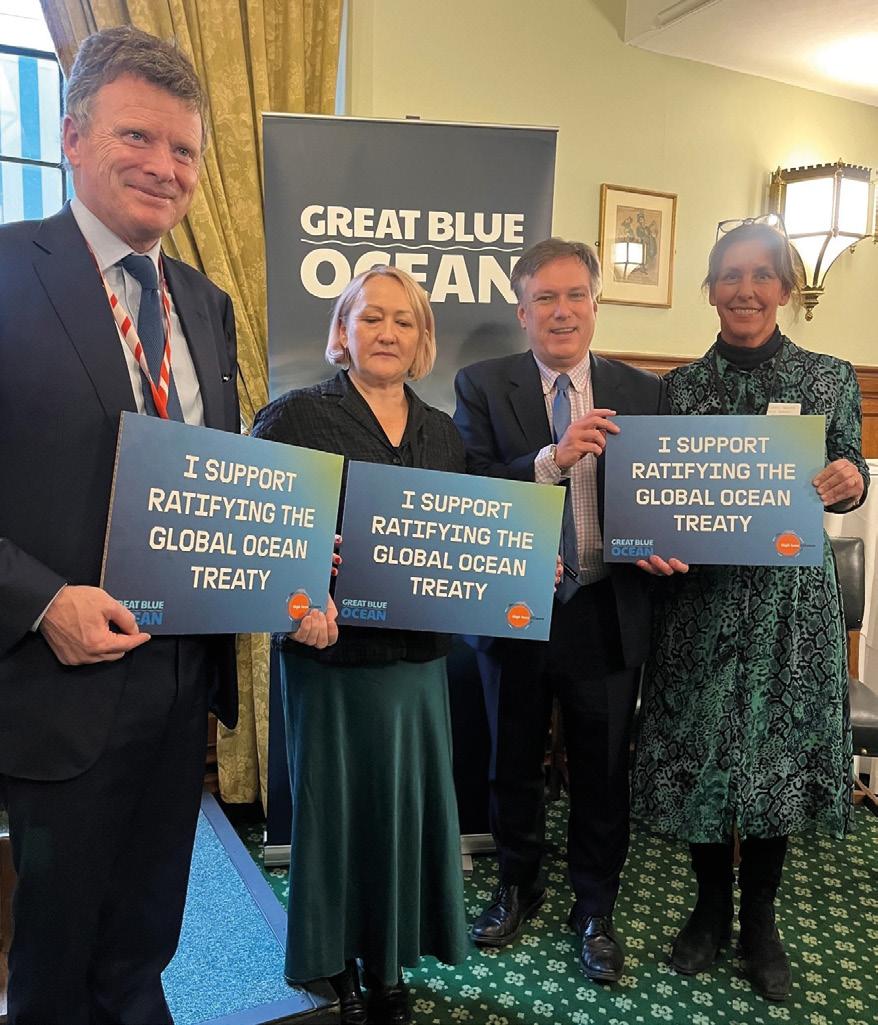
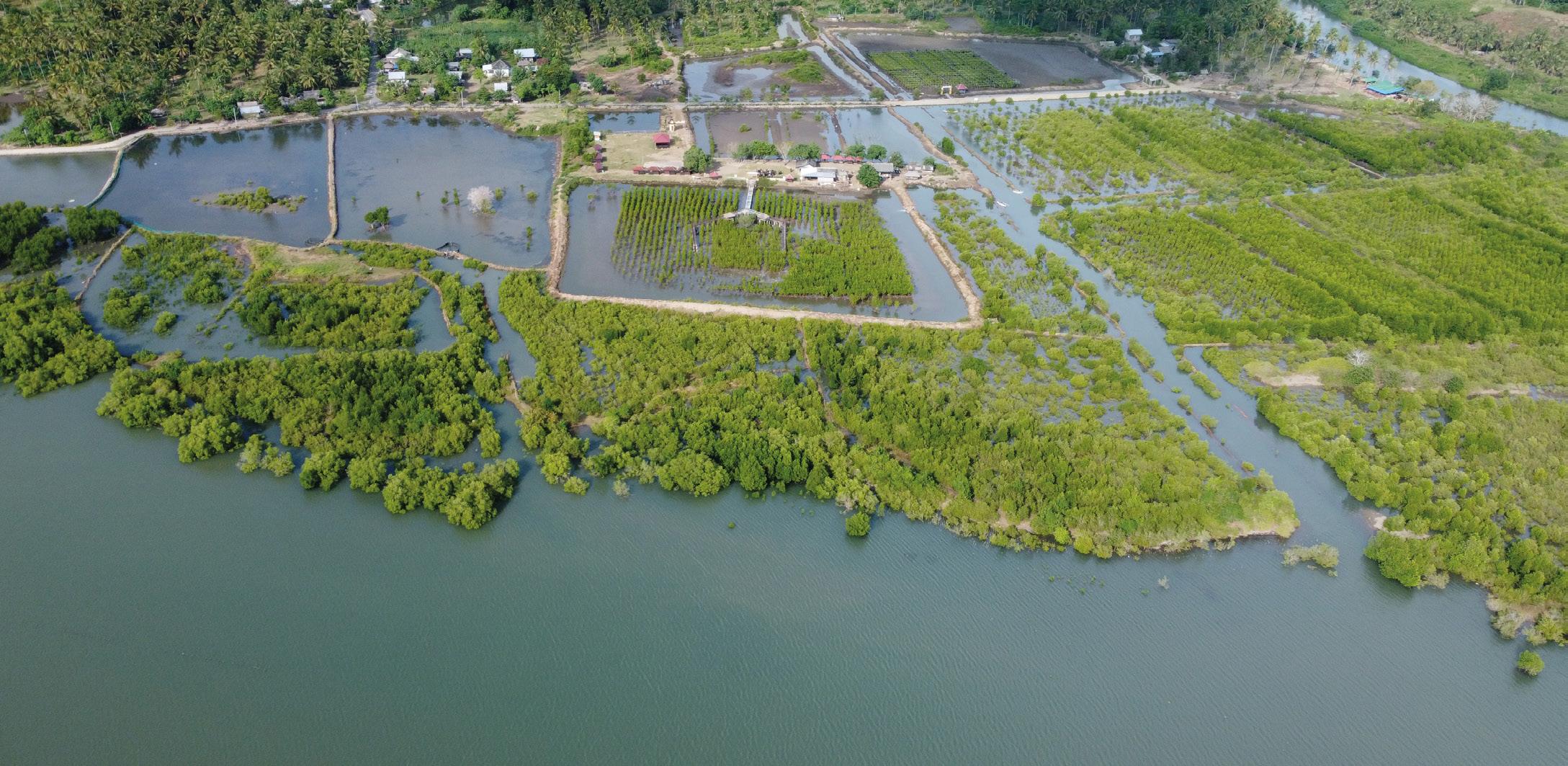

The Blue Climate team’s work around marine natural capital is another step in proving the value of the ocean as a solution to climate change.
The focus of Blue Climate is to prove the value of the ocean as a solution to climate change and the biodiversity crisis. In alliance with local communities and partners, we do this by generating robust scientific evidence, targeted policy interventions, the exchange of training and knowledge, and thought leadership.
In collaboration with The Crown Estate, Crown Estate Scotland and the Esmée Fairbairn Foundation, we began work in 2023 on a roadmap for a high-integrity marine natural capital market in the UK — the first of its kind in the region. Development has been led by Pollination and Finance Earth. Further afield, we expanded our portfolio of international restoration projects, through which we seek to define high-integrity and best practice nature-based solutions.
Blue carbon ecosystems (and the communities alongside them) are one of our greatest allies in the fight against climate change. And so with partners Oceanus Conservation in the Philippines, as well as Blue Forests and Better Together in Indonesia, we are launching new community-based ecological mangrove restoration projects.
At COP28 in Dubai, we hosted a panel about rights in blue carbon projects, bringing together scientists, restoration specialists and investors to debate this critical issue. The Ocean Pavilion (of which we are a founding partner) continues to highlight the need for negotiators in the UNFCCC process to take the ocean seriously as a solution to climate change.
The UK Blue Carbon Forum has continued to grow, recently co-hosting an event with the UK Blue Carbon Evidence Partnership and Scottish Blue Carbon Forum about how to address the scientific questions remaining around saltmarsh and seagrass i.e. habitat and carbon stock mapping. In the Orkneys, we are supporting research to map the flows of carbon in kelp forests, to improve understanding of kelp as a blue carbon ecosystem.
In 2024, we will launch the roadmap for the UK marine natural capital market, with a focus on bringing needed finance to expand saltmarsh and seagrass restoration locally, catalysing engagement across Government, the private sector, civil society and academia.
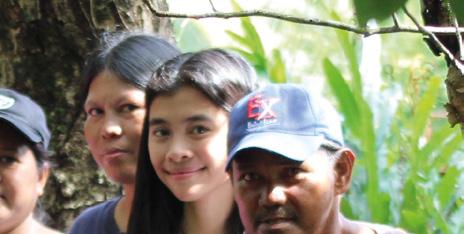

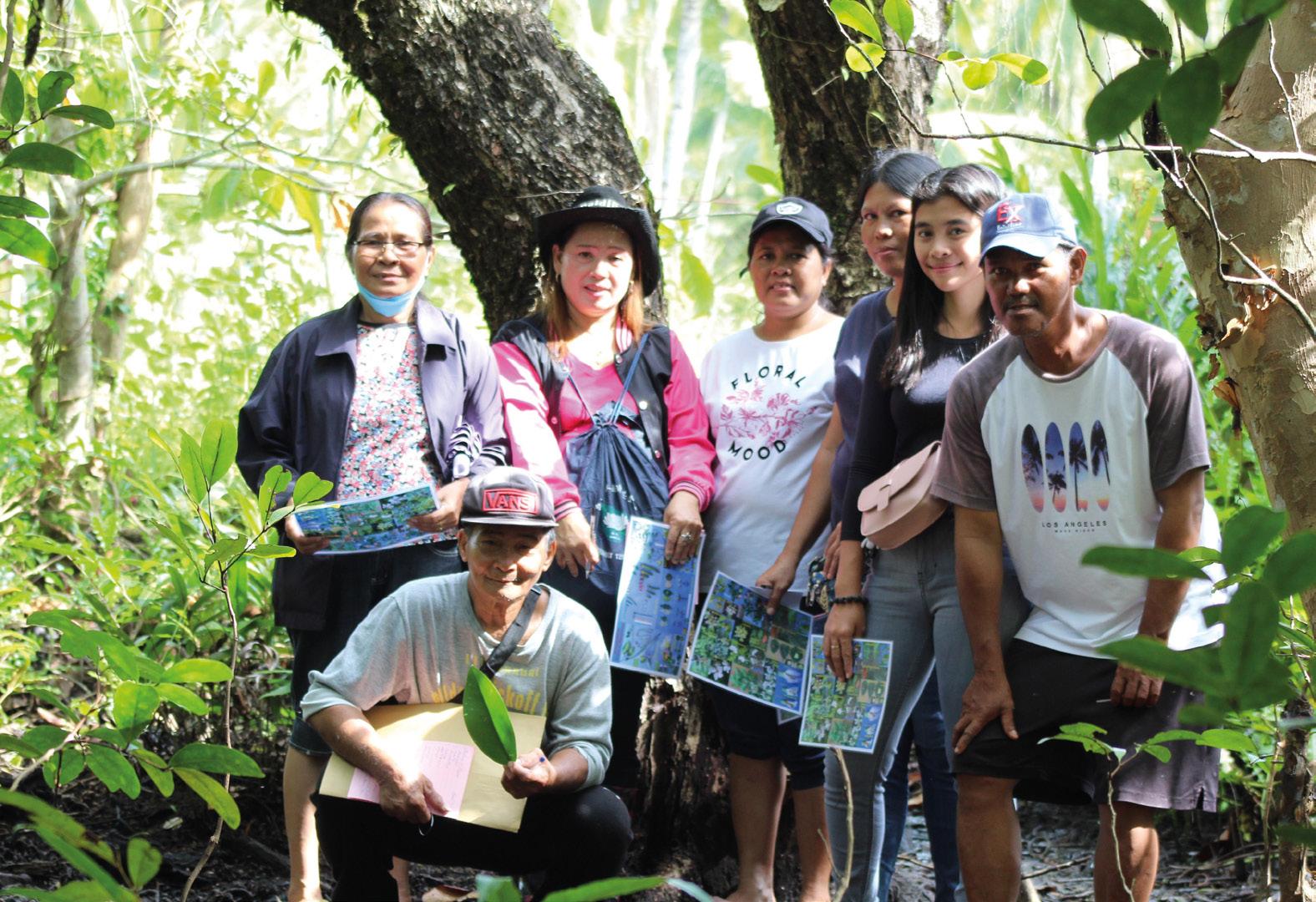
We will protect and restore mangroves and seagrass with local partners in the Maldives, Aruba and Bonaire, Greece and Formentera, work with groups such as the Global Mangrove Alliance, and continue our sponsorship of the Ocean Pavilion at COP29.
We will also be working with the Science, Impact and Innovation team to develop our thinking around the climate resilience of marine protected areas, and consolidating our efforts on the climate impacts of ocean renewables and offshore energy production.




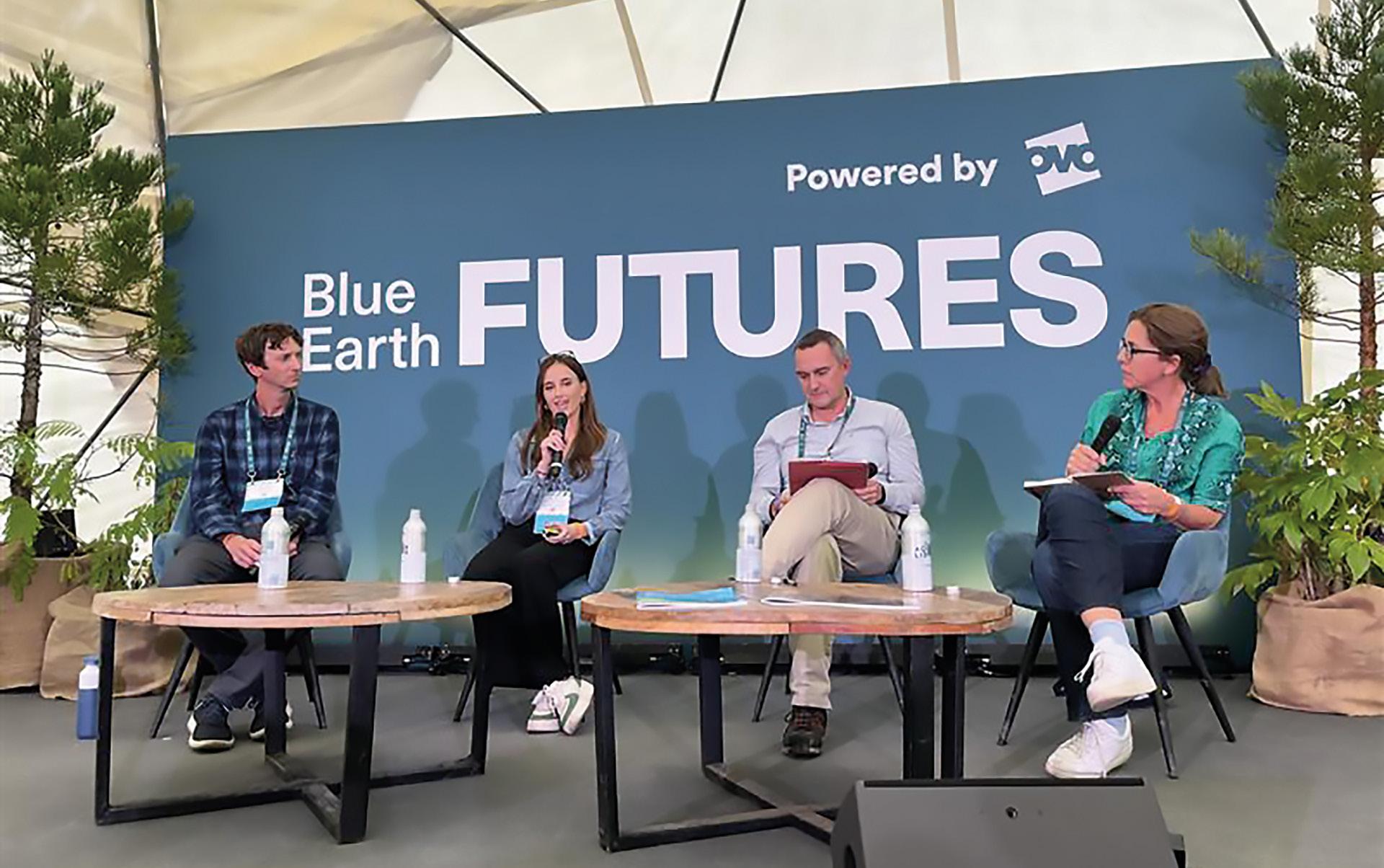
From the Solent to the Maldives, our team strives to persuade the private sector to re-frame the way it values nature.
The scale of the ocean and climate challenge we face requires innovative thinking around conservation finance. In 2023 the Economics Unit has developed a wealth of knowledge, and continued to support the financial sustainability of Blue Marine’s projects, as well as contributing to the global conversation around ‘the blue economy’.
On ten occasions, we have presented at global conferences, sat on panels, and chaired multiple dialogues on sustainable finance. In parallel, we have continued to publish and co-author blogs and reports that demonstrate the inequity of the existing ocean economy, and show how we can start to value the benefits of a healthy ocean.
A core element of our work has been developing innovative biodiversity credits. We have worked closely with Blue Marine’s Solent Seascape team, whose project has been selected as a pilot for the developing Plan Vivo standard, making it one of the first marine projects to produce biodiversity credits verified under this scheme. We are working to develop a market around credits like these, engaging with the private sector to re-frame the way it values nature and drive home the true value of biodiversity.
Elsewhere in the UK we have worked on how to remove damaging fishing gear from marine protected areas. In collaboration with Economics for the Environment
consultants (EFTEC) we have produced reports on how to assess a ‘just transition’ to lower-impact gear, or away from fishing entirely. The topic has been developed through workshops with relevant stakeholders, and will provide evidence to help policymakers better protect UK waters.
Internationally, we have continued to provide support and knowledge exchange on sustainable finance for Blue Marine projects in Namibia, Turkey and the Maldives.
Through continued collaboration with partners around the world and across different sectors, in 2023 our work expanded into new territories and placed us in the forefront of a vital emerging market.
Our campaigns scored notable successes this year, with help from press, social media, films, petitions and immersive experiences.
Blue Media pursues conservation goals by producing and supporting long and short films, running campaigns and securing press coverage. The use of media increases the impact of marine conservation far beyond the coastline, reaching wide audiences and informing decision-makers.
Our campaigns had notable successes in 2023, in particular influencing the UK government to make a U-turn over its position on deep-sea mining (see page 14). In Jersey our petition and press work made the case for significant marine protection, and in its Marine Spatial Plan the Jersey government now proposes to close 27 per cent of the island’s waters to bottom trawling and dredging.
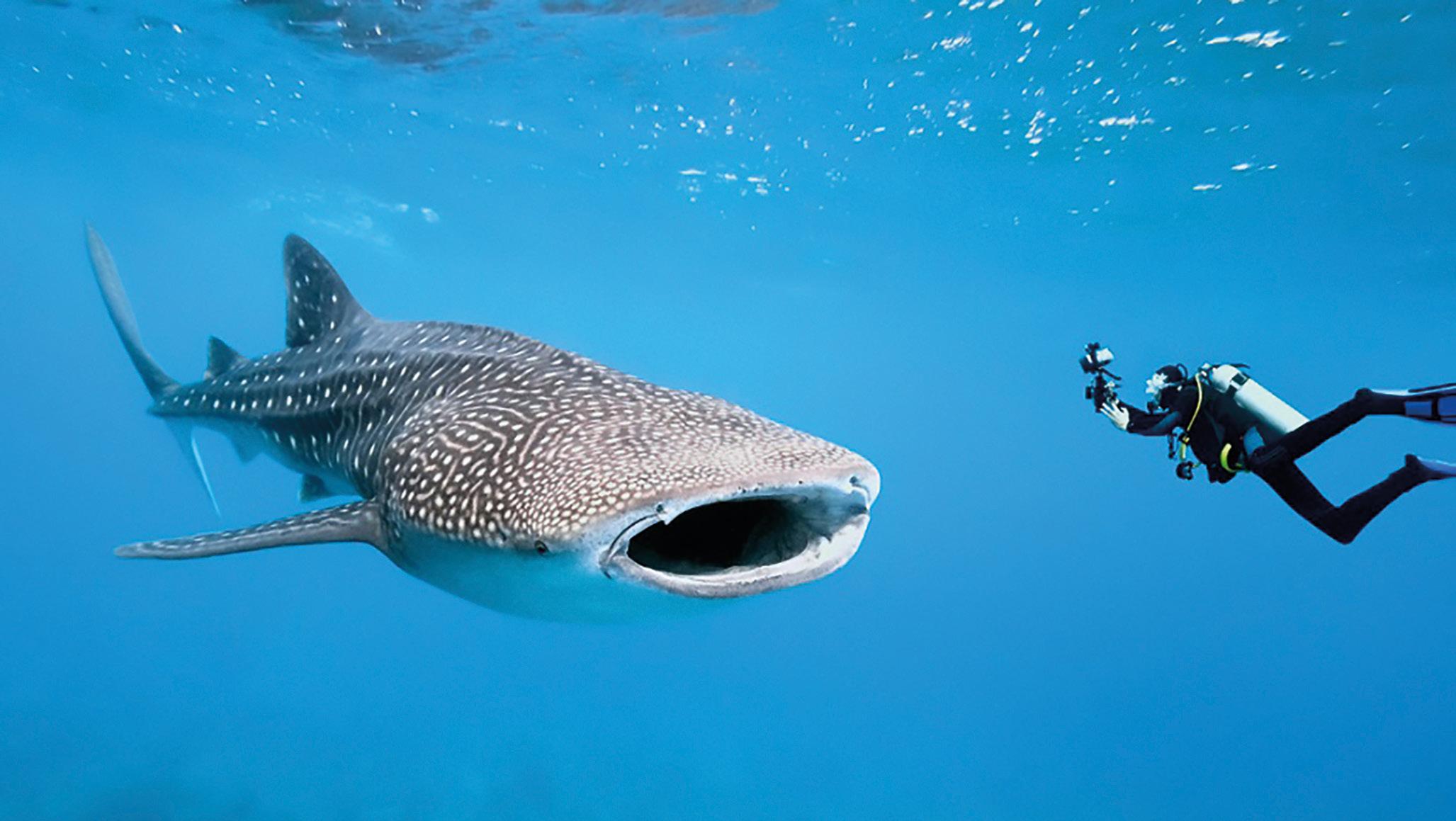

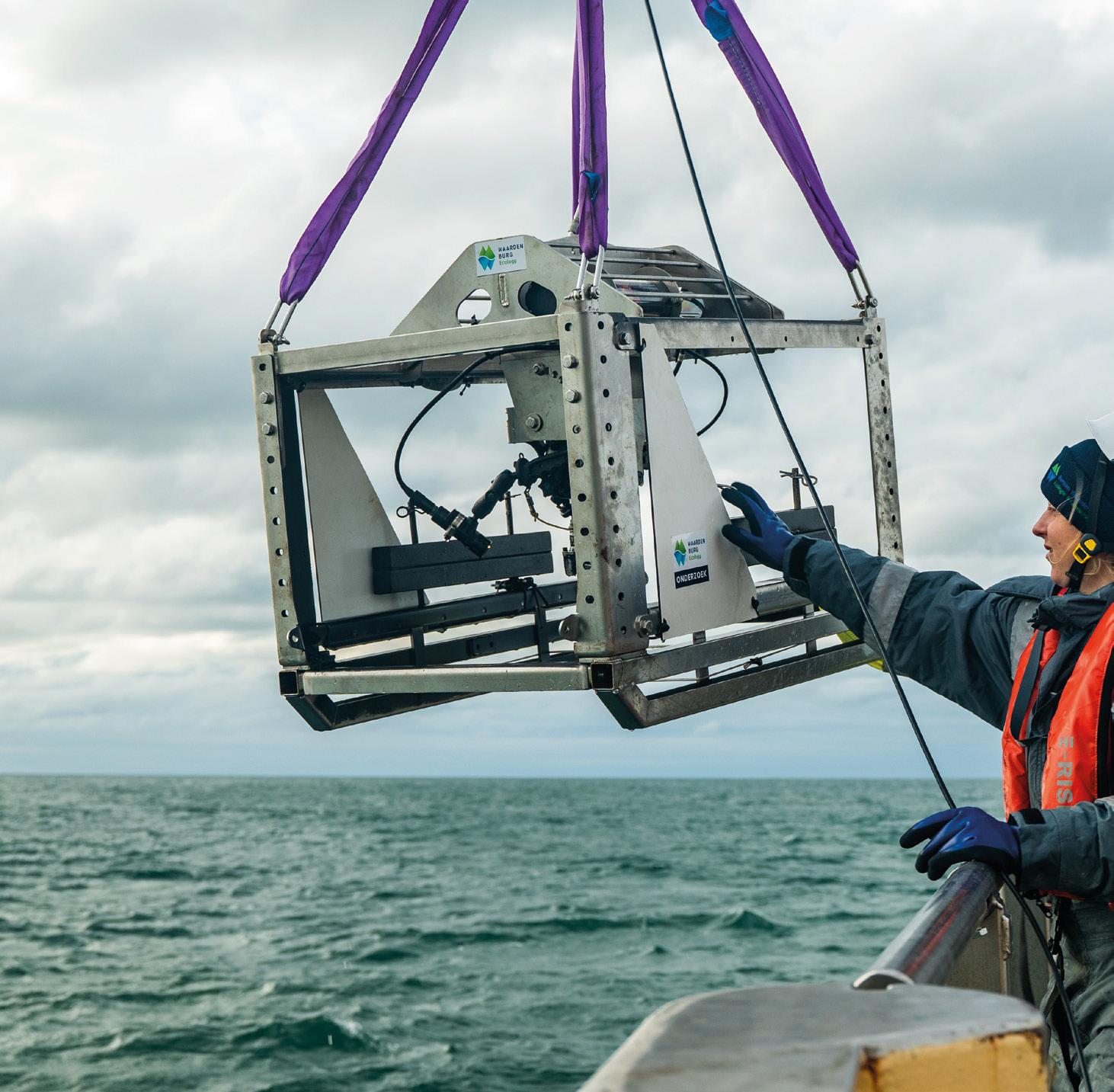
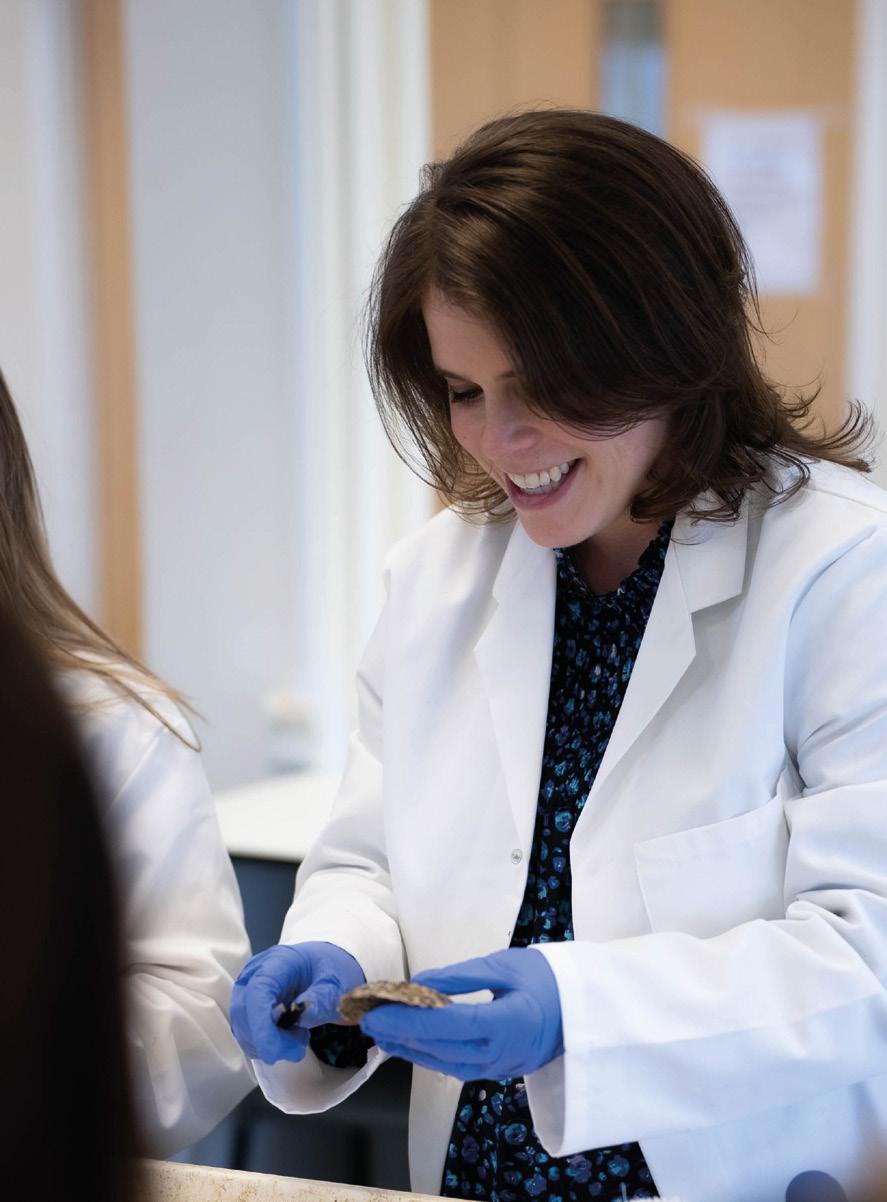
Further afield, we launched the first of our #GentleToGiants campaigns in the Maldives, which calls on whale-shark tour operators to abide by a code of conduct, and the public to choose those operators. Twenty-two operators signed up to the code, and the social media campaign was seen 1.2 million times. This campaign has also launched in St Helena, where operators are working closely with Blue Marine and St Helena National Trust to ensure the sustainable continuation of wildlife tours. The focus of the media team is now support for Blue Legal’s action against the Government over continued overfishing in UK waters.
To deepen understanding of marine protection, connect audiences and influence behaviour, Blue Media produced a range of both long- and short-form films. On the south coast of England we shot a series of pieces about the Solent Seascape Project, including the documentary-length ‘Solent – the Oyster’s Return’. In Jersey we worked with Blue Education to make ‘Snorkel Portelet’, a story viewed through the eyes of a child who discovers the biodiversity and habitats protected by the island’s only no-take zone.
In collaboration with a local team in Devon, we produced a 45-minute documentary to mark the 50th anniversary of the UK's first no-take zone, around Lundy Island. This includes rare and compelling testimony from local fishermen, who confirm that protection has been positive for them – a story that also emerges at the first no-take zone in Greece, where the Amorgorama campaign film is being used to drive protection from the bottom up (see p 24). We’ve also been telling the story of marine protection on Dogger Bank, where other industries now threaten the MPA only recently safeguarded from destructive fishing.
To support Blue Marine’s largest project, the media team is also working to shine a light on the critical research at the heart of the Convex Seascape Survey. A range of films and more innovative digital assets — such as immersive animation and the augmented reality experience of #WalkingWithWhales — help to communicate the complex science that links climate mitigation with ocean health.
Tech innovation abounds elsewhere too, and we have now translated our immersive website 'The Sea We Breathe' into seven languages, including Arabic, and developed an animated virtual reality. experience, narrated by Helena Bonham Carter.
The places where Blue Marine works with local partners to make a difference.
THE
Our campaign for a network of National Marine Parks aims to connect seascape communities with what’s below the water.
National Marine Parks (NMPs) can illuminate connections between people and nature by helping them understand what’s below the water – opening up opportunities to raise awareness and improving the management of our seas. Blue Marine set out to use a network of NMPs to reconnect the UK public to the sea, revitalise coastal communities and increase appreciation and understanding of marine conservation – ultimately bringing about better engagement with existing conservation designations.
After months of energetic co-ordination by Natasha Bradshaw, a National Framework was launched at a Parliamentary event hosted by Luke Pollard MP in September 2023.
2023 R EVIEW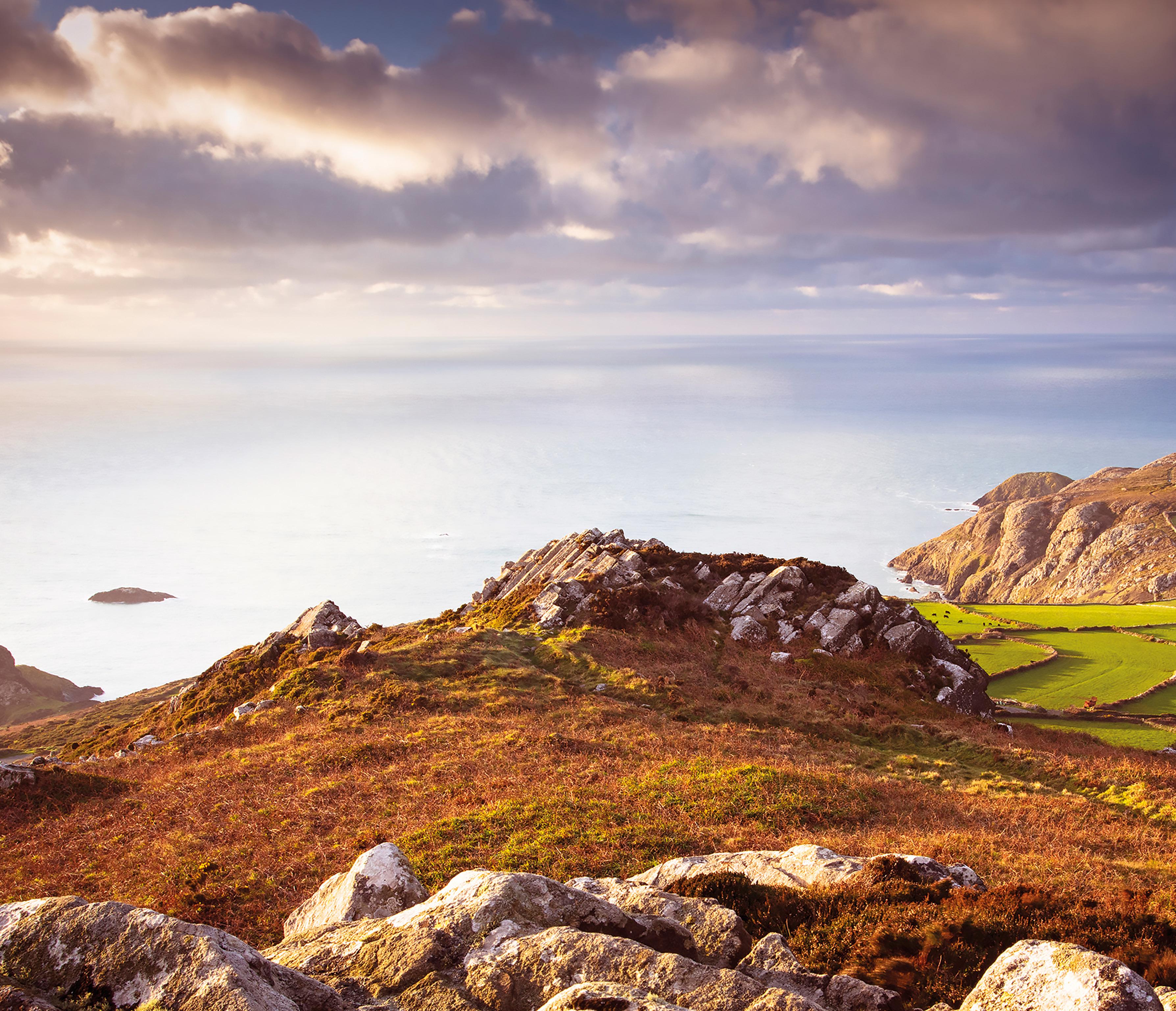
'The purpose of NMPs is to connect people with their seascape to share in a sustainable future'
The framework was endorsed by 14 national and local advocates, including Natural England, Campaign for National Parks, Heritage England, Wildlife and Countryside Link, Local Government Association and prospective park representatives, and was supported with a 'Guidance for NMP Evolution' paper, to help communities develop and establish NMPs in their regions.
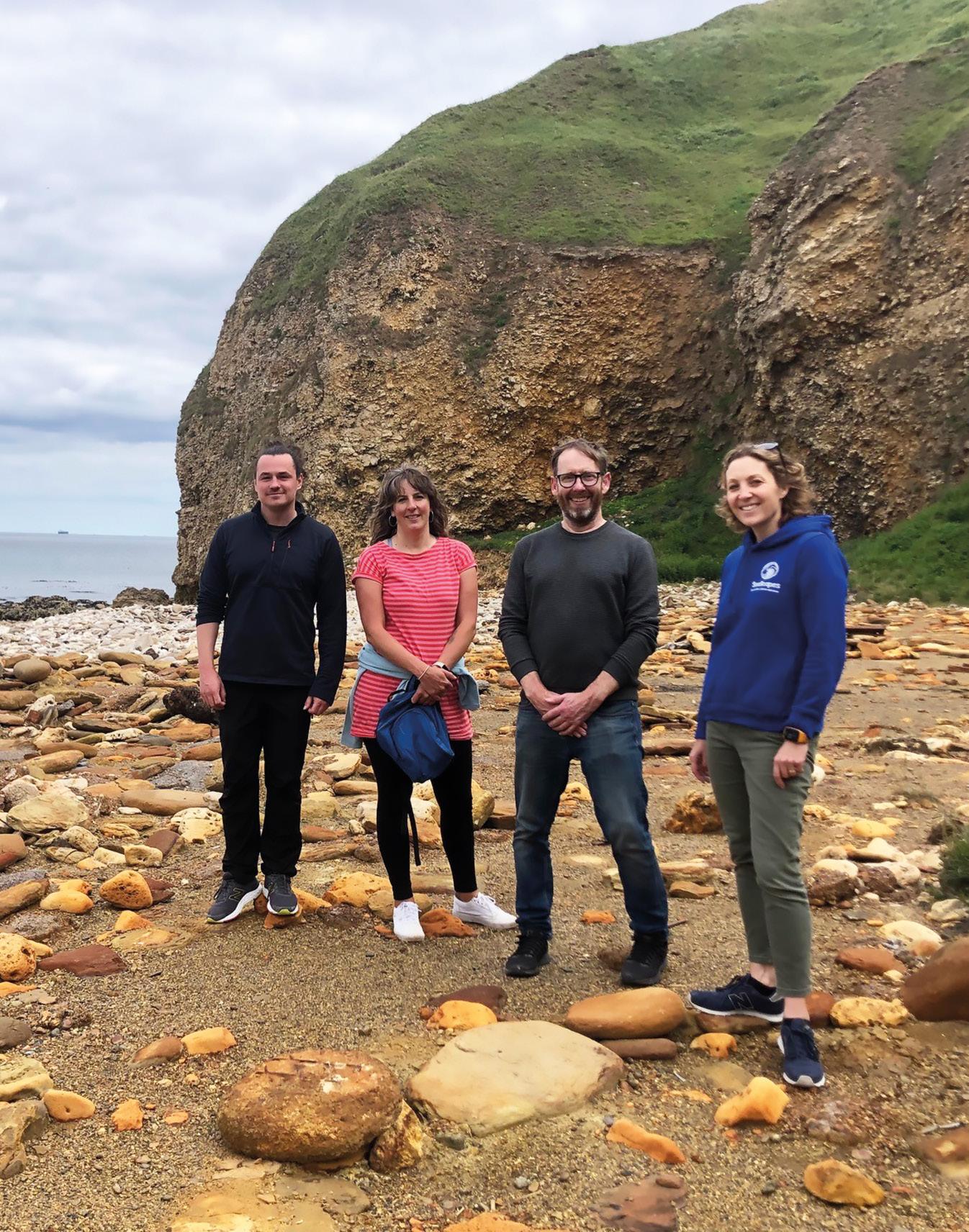
In Scotland the government committed to introducing at least one new national park before the next Scottish election in 2026. This year we produced a briefing for Scotland’s coastal communities to encourage them to consider making formal bids for marine and coastal National Parks in their areas. We also engaged with Scottish politicians to gather support for a coastal and marine park in their constituencies. Blue Marine will be supporting identification and proposals for areas that can bring the most benefit for the environment and local communities.
The purpose of NMPs is to connect people with their seascape to share in a sustainable future. NMPs offer a model that promotes access and enjoyment, supports local economies and protects life in the sea for our future. Our work so far has proven that there is widespread support for NMPs, and that the foundations are there for extending existing or creating new National Parks to include the sea, through legislation already in place or through voluntary declaration by coastal communities.
Scotland has ten per cent of Europe’s coastline, but its waters are depleted. We found more evidence for a ban on destructive fishing.
Scotland's seas are home to beautiful diverse habitats, from kelp forests to flame shell reefs and deep-sea coral gardens. They have nourished and supported coastal communities for generations. Comprising 10 per cent of Europe's coastline, Scotland's marine environment is not only vast but vital, with some of the richest blue carbon habitats in the world.
However, this ecosystem and life is under threat. Overfishing and insufficient levels of marine protection have severely depleted Scotland's oncerich waters. Many fish populations have declined significantly, with destructive fishing practices prevalent in inshore waters.
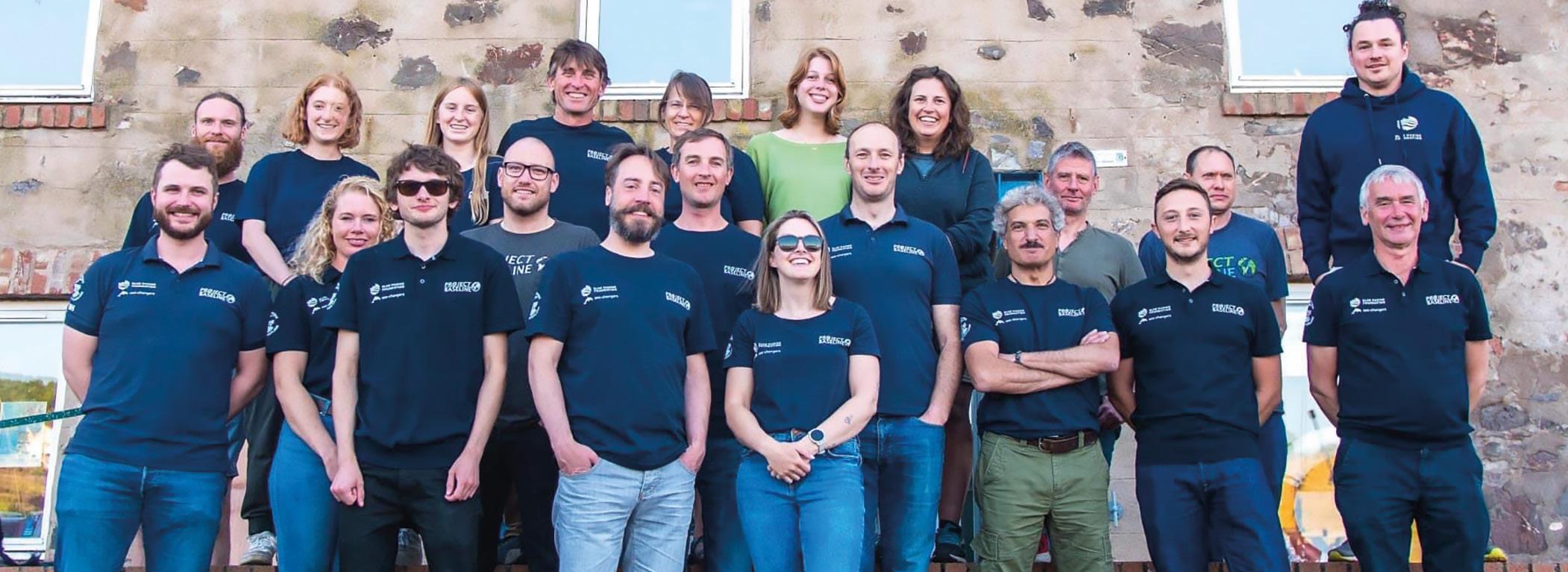

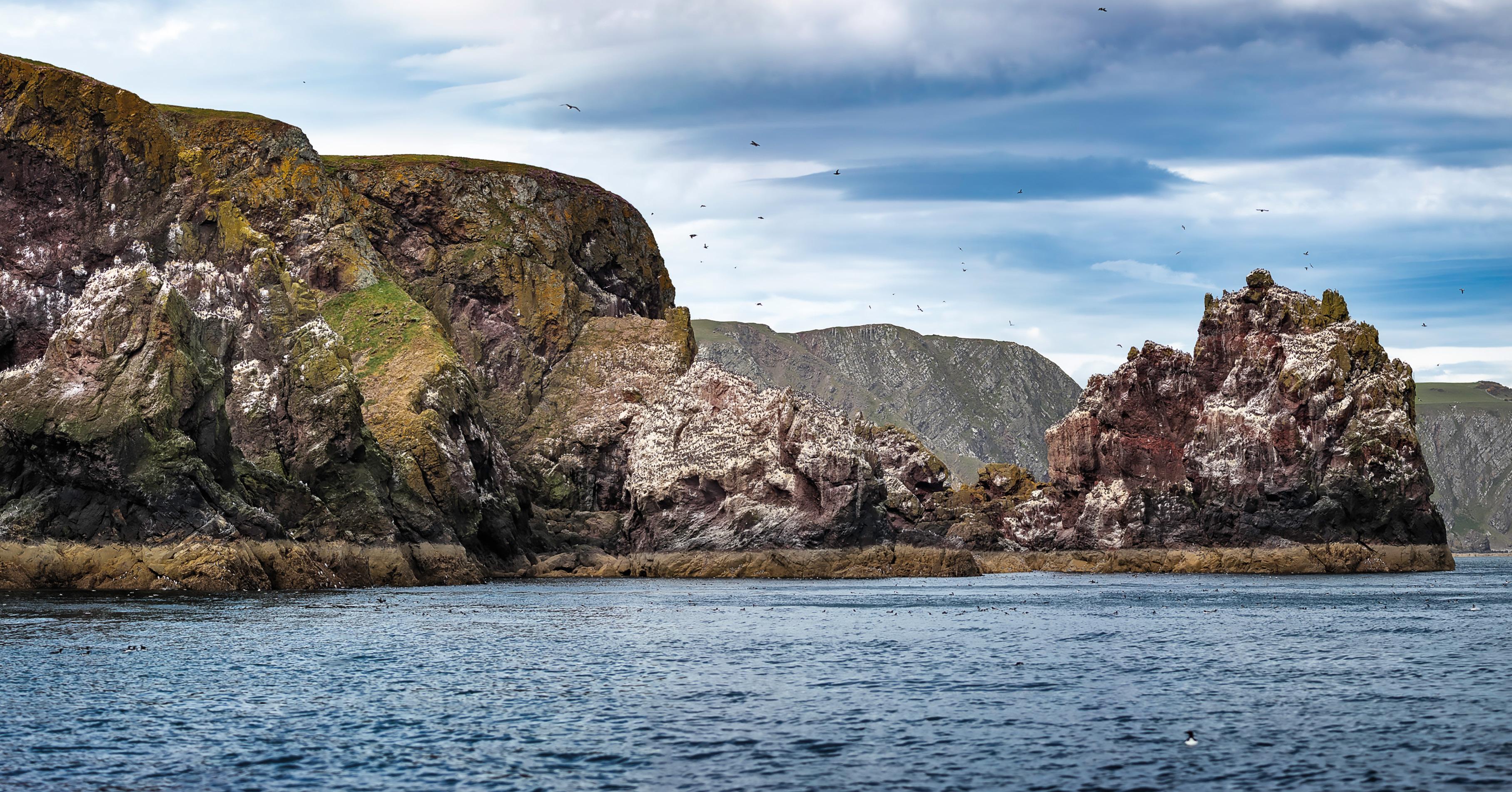
Species abundance is
340%
higher in shipwreck sites protected from bottom trawling than in areas open to bottom trawling
Over the last four years, Blue Marine has been working with the community of Berwickshire on the south-east coast of Scotland to develop a collaborative approach to protect and sustainably manage the marine protected areas (MPAs). This has included extensive research and engagement with fishermen, recreational users and local partners.
This year we supported the publication of scientific research, including a paper that highlighted the value of shipwrecks within the MPA. This paper shows that, at sites open to trawling, species abundance was 340 per cent higher at the shipwreck sites (which are naturally protected from bottom trawling). This added to the evidence base in support of our call to remove bottom trawling from Scottish MPAs.
Other papers we published focused on the local crab and lobster fishery, enhancing our evidence base and informing a set of bottom-up fishery recommendations for improved management.
In addition, we launched the Berwickshire Ocean Observatory, which integrated high-resolution underwater footage and educational materials, bringing the habitats and species of the Berwickshire MPAs to people's homes and schools, and helping to train the citizen scientists of the future.
At a national level, Blue Marine is continuing to participate in ‘Our Seas’, a growing coalition of 135 marine businesses, Scottish NGOs, fishing associations and community groups. We continue to promote the campaign films, ‘The Limit’ and ‘Time Limit’, and push the Inshore Limit Petition.
Through a combination of bottom-up community engagement and top-down policy intervention, Blue Marine will continue to work towards a resilient, thriving and sustainable marine environment, benefiting coastal communities, nature and climate.
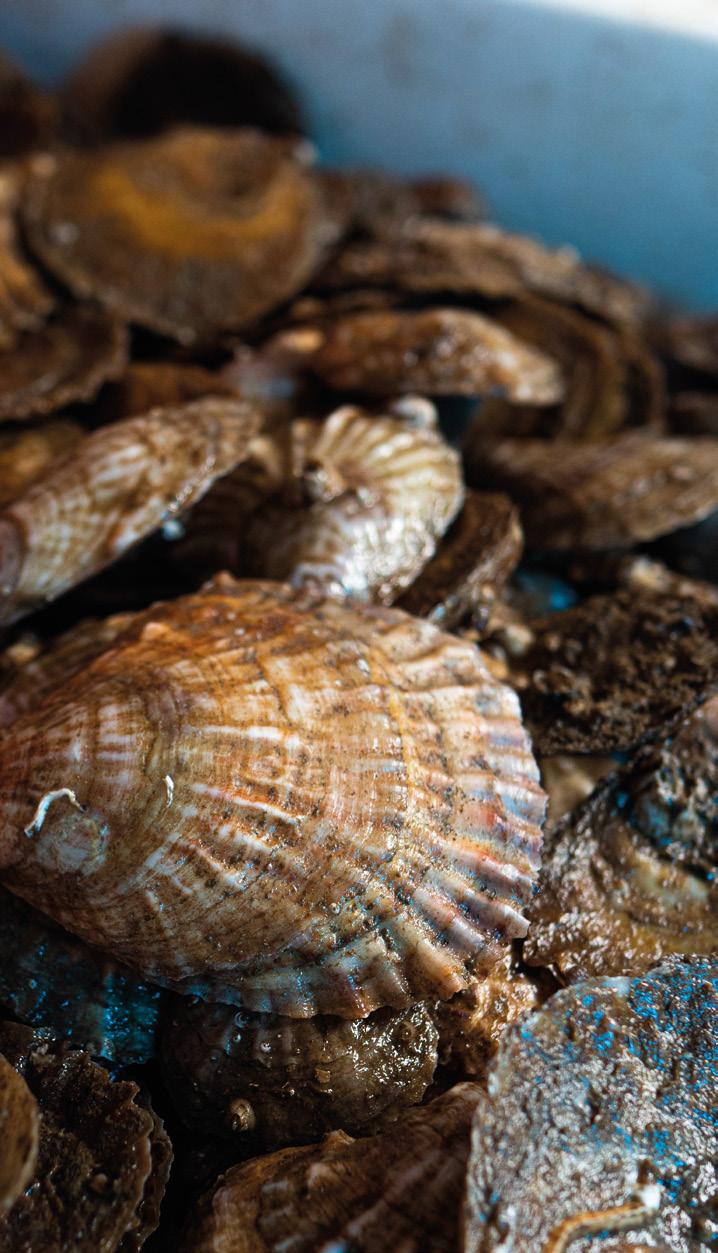
We launched the Solent Seascape Project, and our reefs gave a new home to thousands of oysters.
Since 2015, Blue Marine has pioneered restoration initiatives to reverse the decline of marine and coastal habitats, such as native oyster beds, seagrass, saltmarsh, kelp, and seabird nesting sites. These play a critical role in improving water quality, act as nursery grounds and provide coastal protection, but they face pressure from overexploitation, disease and sedimentation, which is leading to their decline and, in some cases, disappearance.
In 2023, we restored more than 40,000 native oysters in Conwy Bay, Tyne and Wear, Essex, and the Solent. We established two new oyster reefs: in Tyne and Wear a 0.75 hectare reef with 10,000 native oysters in collaboration with the Zoological Society of London and British Marine, as part of the Wild Oysters Project;
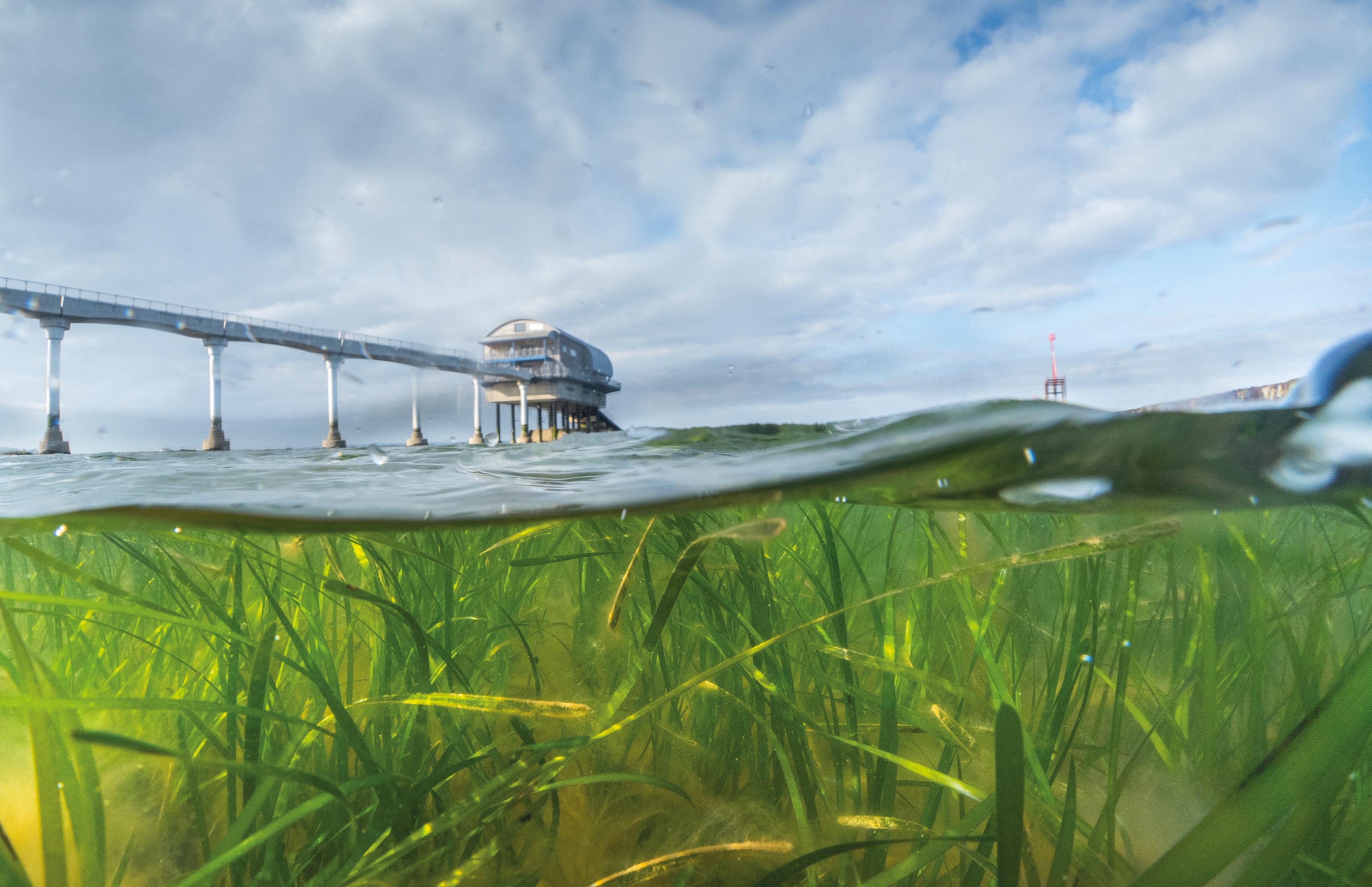
and a 0.25 hectare reef nurturing 20,000 native oysters in the River Hamble, as part of the Solent Seascape Project. As part of the Essex Native Oyster Restoration Initiative we have helped create 15,740 sq metres of oyster reef, and deployed more than 24,000 native oysters in the Blackwater Estuary since 2019.
The Seascape project was launched in January by Blue Marine and nine partner organisations. It is a ground-breaking project which seeks to reconnect seabird nesting sites, saltmarshes, seagrass beds and oyster reefs. The initiative had a successful start.
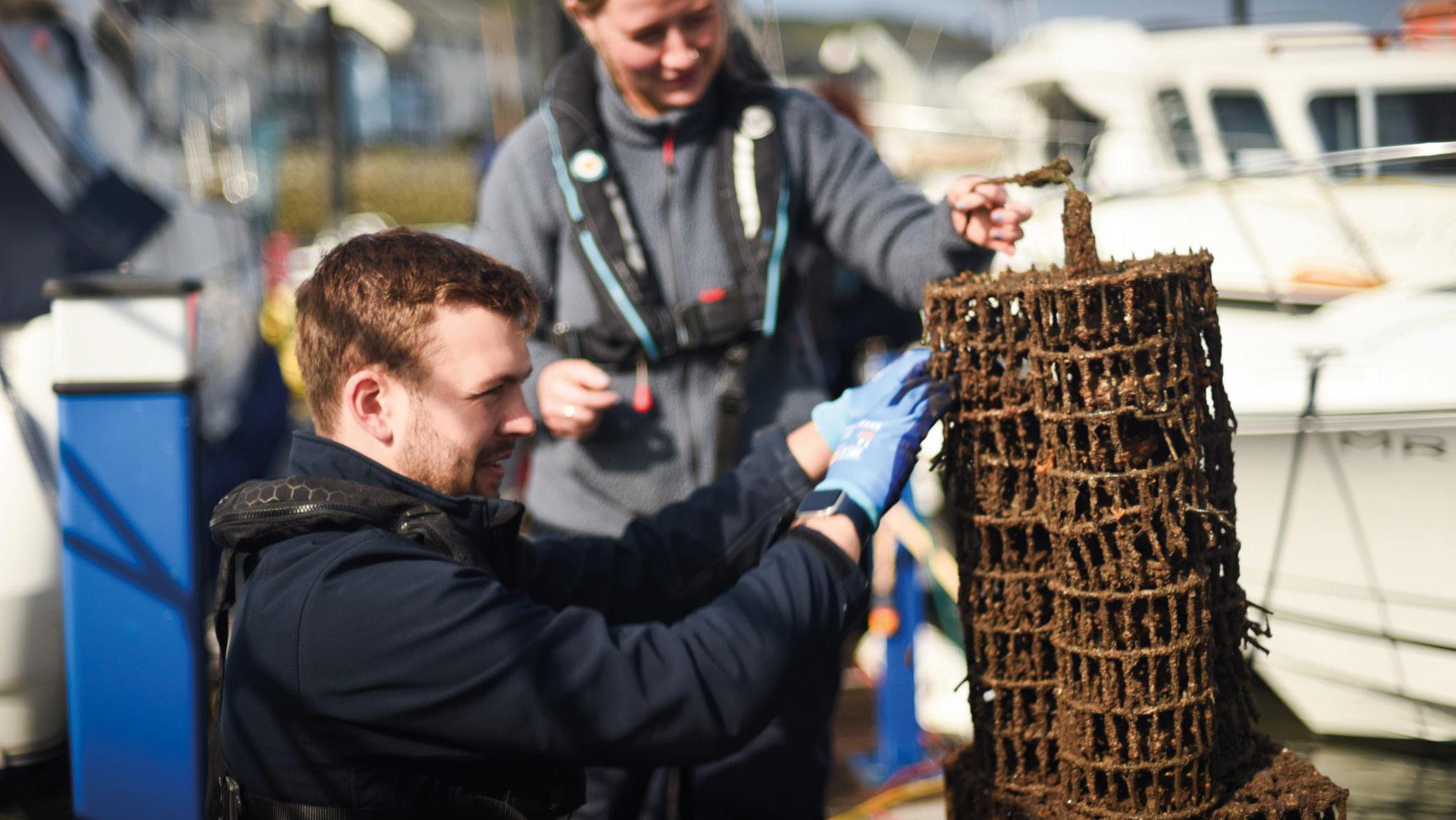
Alongside the Hamble reef, in 2023, our partners CHaPRON have created 0.24 hectares of saltmarsh, while RSPB created two seabird nesting islands. The project was visited by HRH Princess Eugenie and Defra’s Secretary of State, and has been selected by Plan Vivo as the only temperate marine project to generate biodiversity credits, ensuring it will be sustainably financed in future.
Monitoring underlined our successes. Oyster nurseries in the Solent and at our Wild Oyster sites have provided a haven for more than 130 species, including the endangered European eel. Increased oyster recruitment was seen in Langstone Harbour for the first time, as well as increased biodiversity at the reefs, a decrease in invasive species and the return of protected species such as the spiny seahorse. There was also saltmarsh colonisation in Chichester Harbour and an increase in seabirds at Farlington Marshes.
As part of the Sussex Kelp Recovery Project we are also monitoring the natural recovery of 170 sq km of kelp beds after the 2021 introduction of the Nearshore Trawling Byelaw. A report published in 2023 highlighted research on this, and we continue to assess other sources, such as sediment, that impede recovery.
Our restoration work allowed us to explore opportunities to enhance biodiversity around offshore wind farms. We collaborated with marine consultants MRAG on an interactive tool to identify nature-inclusive design opportunities in UK offshore wind farms. In 2024 we hope to partner with wind-farm developers on in-water trials.
Wild Oyster educational outreach sessions have reached 85,000 students since the project began, and this year 13,000 individuals were engaged in the Solent Seascape Project. Looking to 2024, our focus remains on engaging stakeholders to co-design a restored Solent, continuing our restoration activities and monitoring successes through innovative methods like eDNA, acoustic telemetry and remotely operated vehicles.
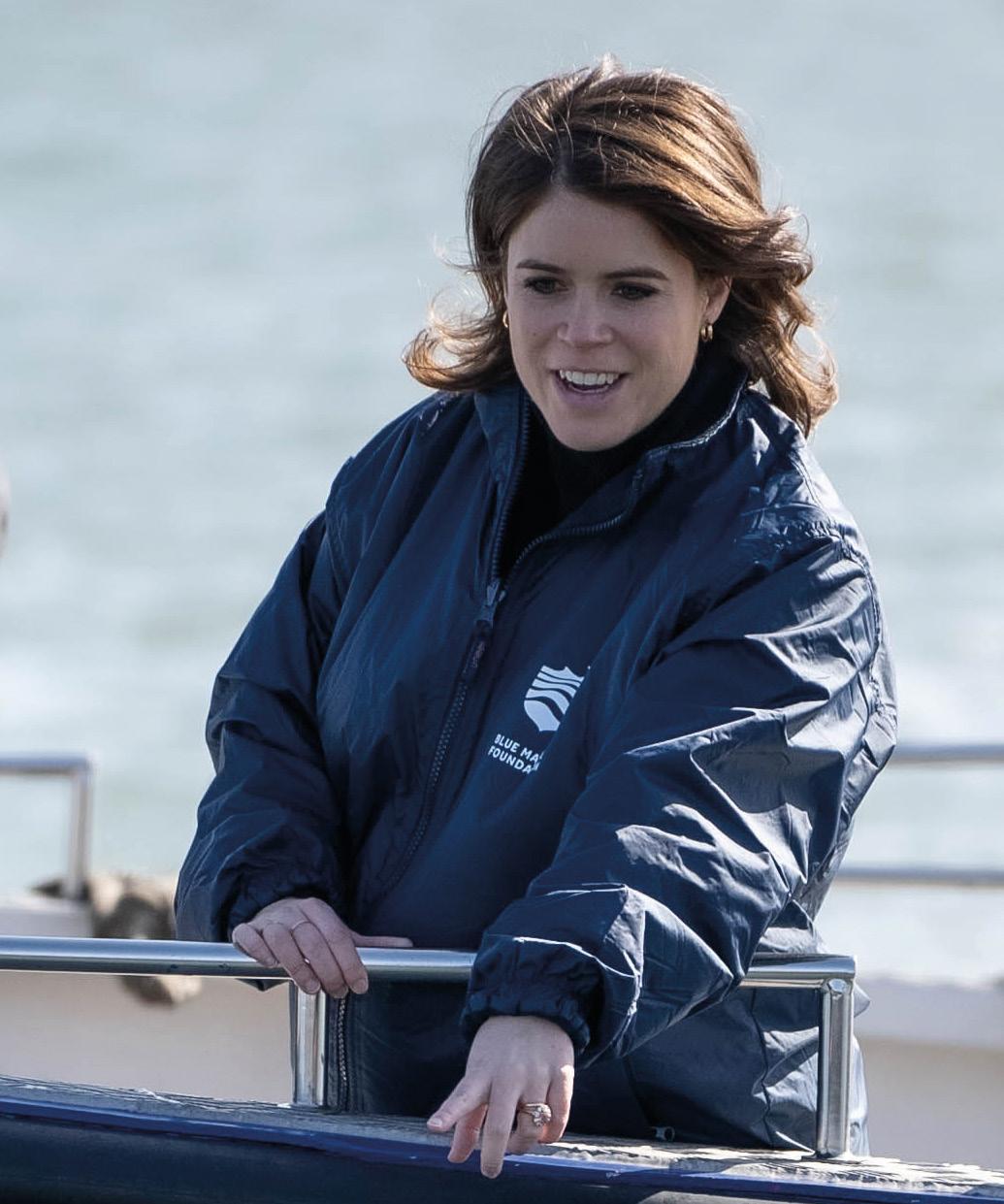

Ascension Island is surely one of the strangest places on our planet, a landscape so other-worldly that it is the location for Martin MacInnes’s recently published science-fiction novel, ‘In Ascension’. A geological fledgling at only a million years old, Ascension is the peak of an undersea volcano in the mid-Atlantic Ridge, whose upwellings are thought to be where life on Earth originated. Parts of the island are formed of barren, volcanic rock, so it resembles the surface of the moon, only bristling with satellite dishes.
But Green Mountain in its centre has been fertilised with seedlings from around the world, in a model of terraforming conceived by Charles Darwin after his visit on the Beagle in 1836, and is now a lush, tropical rainforest that sprouts endemic ferns and provides vital water supplies.
Perhaps the most encouraging recent development in its short history is that in 2019 (through the collaboration of the Ascension Island Government, people and Council, Blue Marine and its partners at the Great Blue Ocean coalition and the UK Government) Ascension declared one of the largest and most effectively monitored no-take MPAs in the world. Around this remote and isolated island, 445,000 sq km of mid-Atlantic ocean is entirely free from industrial fishing.
This means that the green turtles who come to lay their eggs on Long Beach, in the last stages of their journey from Africa, no longer have to negotiate thousands of baited hooks from long-liners. Meanwhile myriad fish – swordfish, sailfish, marlin, sharks, tuna –can breed and proliferate in Ascension’s waters. It is an oasis in an otherwise heavily fished Atlantic.
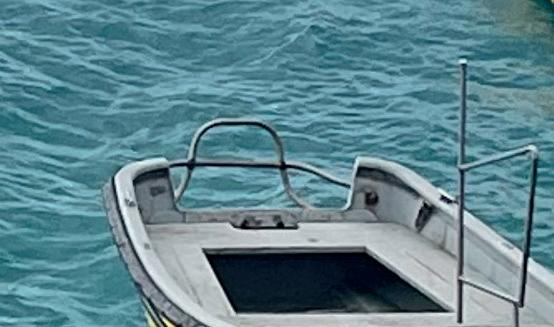
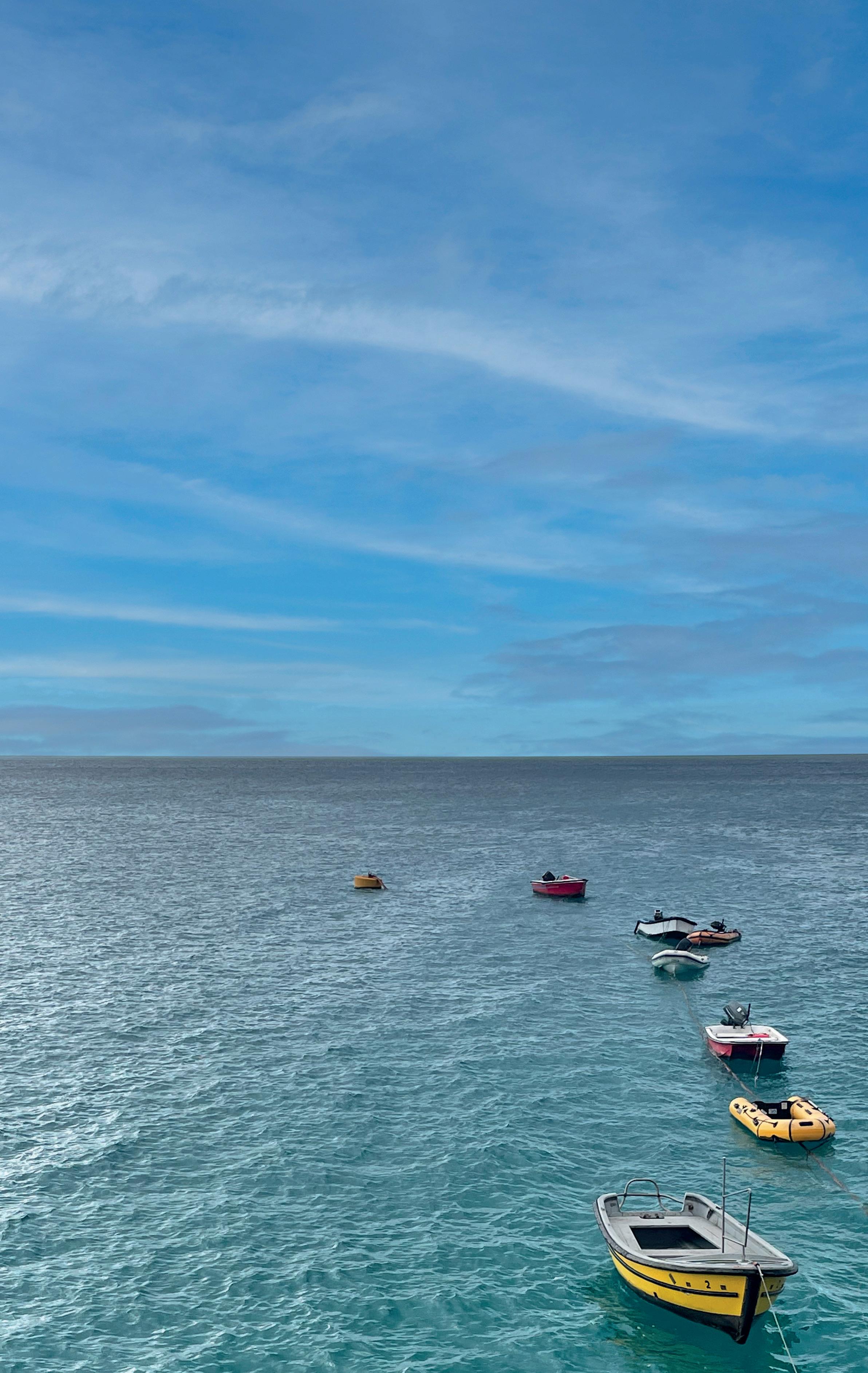
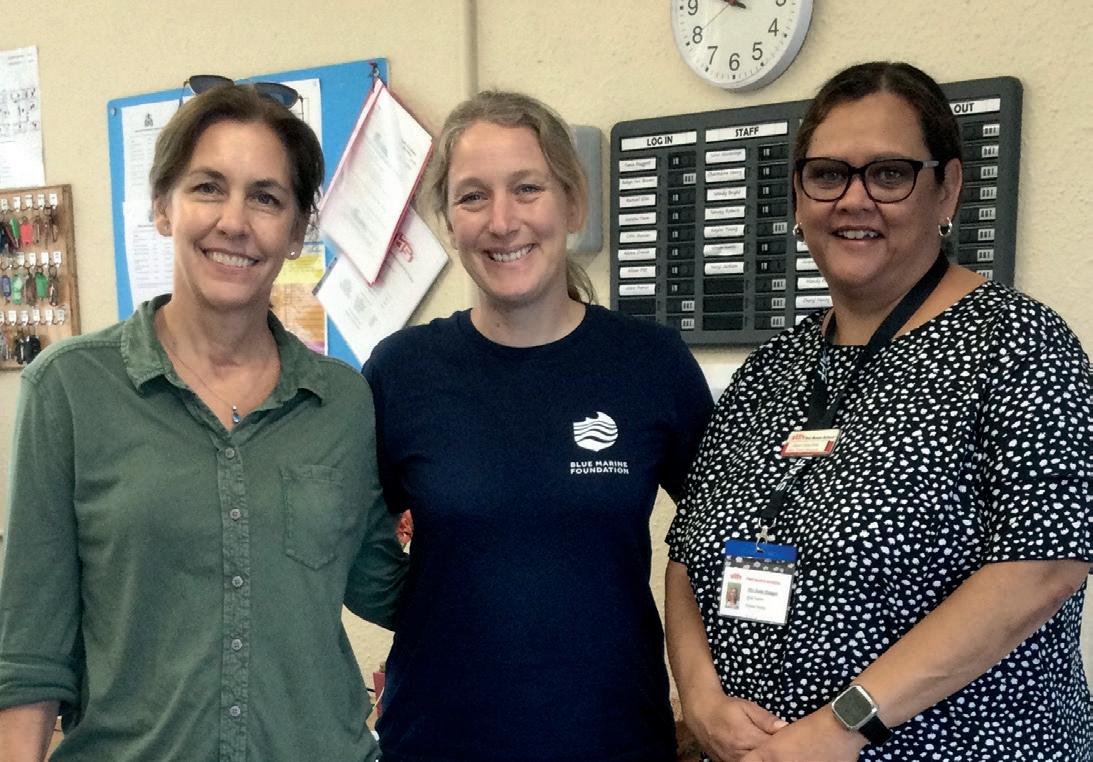
Blue Marine’s view is that, as well as the marine life, the 800 or so people who live and work on Ascension should benefit from having this huge MPA in their waters. So in 2021 we established the Ascension Island Marine Protected Area Community Trust fund (AIMPACT), thanks to a hugely generous donation from visionary shipbuilder Peter Lürssen.
In November 2023, Blue Marine’s CEO and Director of Projects Clare Brook, and Dr Judith Brown, travelled to Ascension to ensure that the money already accumulated by the AIMPACT fund (thanks to the sustainable futures team at Liontrust) was being spent on things the island community would most like.



Ascension’s upwellings are thought to be where life on Earth originated
Clare and Jude had a fascinating time on the island, meeting the thriving conservation department, the Administrator and other government officials, the island council and the fishers’ association. Their message in every meeting was the same: Ascension has made a gift to the world by protecting biodiversity in an area almost the size of France, and the world should recognise and reward Ascension. It was thrilling to see the many improvements already made thanks to funding from Blue Marine, in recognition of the MPA — and exciting to discuss what might be funded in future.
Whoever wins the UK’s election, we aim to ensure its vast UKOTs conservation scheme stays firmly in place.
The UK government’s flagship marine conservation initiative, the Blue Belt Programme, continues to grow, and now includes partnerships with ten of the 16 UK Overseas Territories (UKOTs), collectively protecting more than 4.3 million sq km of ocean.
Blue Marine is a founder member of the Great Blue Ocean (GBO) coalition of NGOs which is chaired by our government affairs adviser, Adrian Gahan. In 2023 GBO focused its campaigning on securing an upgrade to the existing marine protected area covering South Georgia and South Sandwich Islands (SGSSI). Located in the Southern Ocean near the Antarctic, with no permanent human population, this biodiverse area is home to vast numbers of penguins and has seen a wonderful resurgence in whale numbers.
The ecosystem here depends on krill, which is targeted by industrial fishing for human consumption and to provide feed for fish farms. Only a quarter of the waters of South Sandwich Islands are currently closed to krill fishing. As the area is not currently fished, GBO is in negotiation with the governments of the UK and the SGSSI to secure the permanent closure to all fishing of more of these precious waters, on a precautionary basis.
In this election year for the UK, GBO has also attempted to secure commitments from both major political parties that they will support and expand funding for the Blue Belt during the next parliament (2024-29). The scheme currently costs £10 million per year of public money to protect an area 1.5 times the size of India. At £1.86 per sq km protected per annum, this is surely some of the best value-for-money conservation in the world.
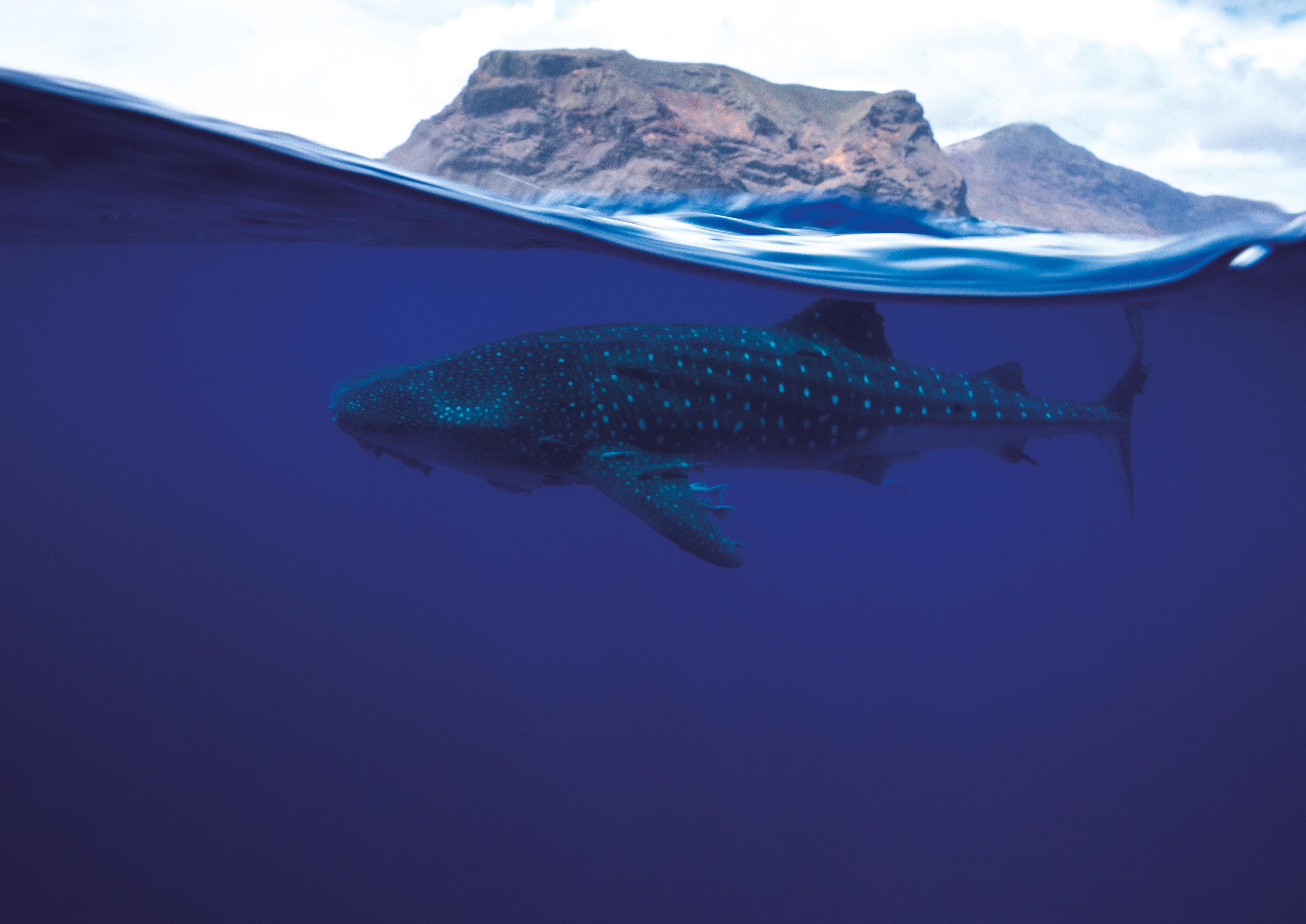
Above
The giant Atlantic marine protected area has been declared a Mission Blue Hope spot
With our partners St Helena National Trust and alongside the St Helena government marine team, we have been working to ensure better protection of 444,916 sq km of ocean and demonstrate how a local, small-scale fishery can work with marine protection to improve livelihoods and improve conservation outcomes.
The marine environment of St Helena protects a wide diversity of species, from whale sharks to endemic fish, humpback whales to hammerhead sharks and delicate corals. Our project here is aimed to feed into the Government consultation process to deliver new, stronger marine policies and fisheries legislation to manage the MPA. Low-impact pole-and-line tuna fishing and accredited marine tourism within the MPA support local livelihoods, while destructive activities are now legally prohibited.
In November the St Helena MPA was declared a Mission Blue Hope spot for its outstanding marine life and the community’s efforts in improving global ocean health. We continued to support whale shark research, education and outreach and scuba-diving scholarships, working with the St Helena National Trust and dive centres to provide upskilling opportunities to aspiring marine professionals. Three scholars were selected for the 2023 programme and their open water training is underway. By providing financial support and mentorship to young people, we aim to help fill critical employment gaps on this remote and biologically important island, training the next generation of stewards of this incredible marine protected area.
Half a billion people depend on the Mediterranean, but it is facing a ‘triple-threat’ of overfishing, climate change and invasive species. Across the region, from Turkey to the Balearics, Blue Marine allocates significant resources to try and turn the tide.
The Mediterranean Sea is a complex region. More than 2.5 million sq km in size, it incorporates the coastal areas and territorial waters of at least 20 countries and has almost a quarter of a billion people living on its shores.
Its biodiversity is rich and unique; of the Mediterranean’s 17,000 marine species, between 20 and 30 per cent are considered endemic — the highest rate of marine endemism anywhere in the world. The Med’s unique habitats include the iconic Posidonia seagrasses, as well as maërl
beds, coralligenous communities and deep-water seamount canyons. These services essential for life include the provision of food and other natural goods, the regulation of climate, and the support of the diverse cultures and livelihoods of the littoral nations dependent on it.
But today, the Mediterranean is an ecosystem in transition. More than three quarters of fish stocks are now fished beyond ecological limits. Apex predators — including marine mammals, grouper, swordfish, sharks and rays — are in decline. More than 1,000 non-indigenous marine species have been recorded, with more than half now established. Climate change is causing the Mediterranean to warm 20 per cent faster than other marine ecosystems, and invasive species from the Red Sea such as lionfish are thriving, putting further pressure on weakened ecosystems.


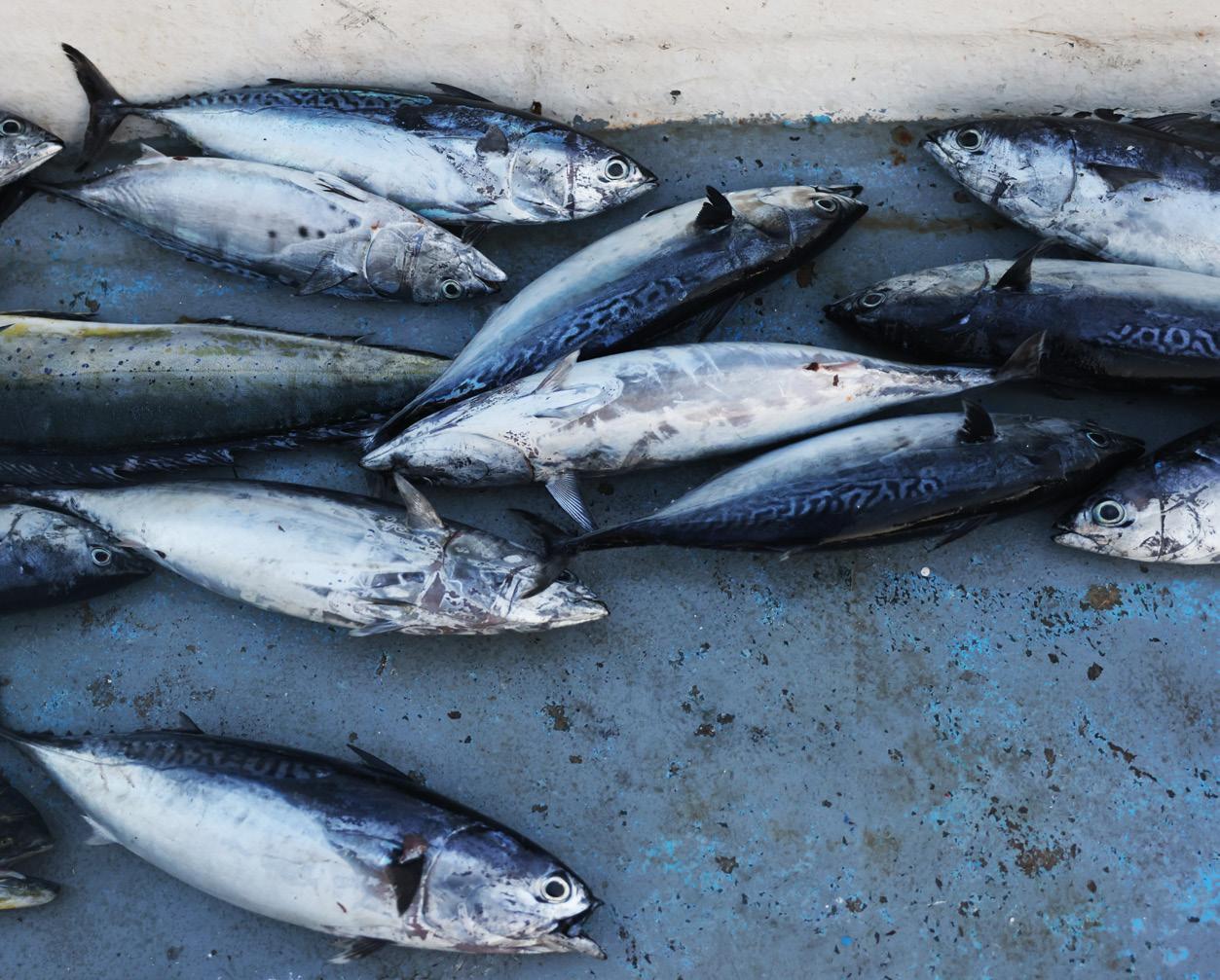
As coastal development and regional tourism grow, threats to coastal-systems mount, undermining the climate regulating function of carbon-rich ecosystems. Addressing the ‘triplethreat’ of overfishing, climate change and landbased impacts requires greater ambition from all Mediterranean countries, and it requires a coordinated response across national boundaries, across sectors, across all segments of society.
Blue Marine allocates significant resources to projects throughout the Mediterranean, primarily focused on the creation and management of marine protected areas (MPAs) that are effective and enduring. We employ full-time staff in Greece and Italy, and work closely with a host of local partners, regional authorities, academic institutions and, perhaps most importantly, EU member-state governments and EU decision makers.
Of all the years since Blue Marine began its conservation efforts in the Mediterranean, the present decade leading up to 2030 has by far the most opportunity to make significant progress. The EU is steadily applying more pressure on member states to meet international and regional conservation commitments; education and awareness through media and community outreach programmes have been successful in engaging coastal communities; and there is a political shift to better support artisanal fisheries.

In some areas, we work intensively: we have country programs and staff on the water in Italy and Greece. In other areas, such as in Spain, Turkey and in Cyprus, we work with partner organisations to address crucial gaps in management. We engage at the regional level, to add our expertise and voice to established efforts. Our participation in regional coalitions and alliances, and our engagement with regional and EU policy, help to drive key reform agendas at the highest levels.
In April 2024, the annual Our Oceans conference will be held in Greece, and the eyes of the world will be focused on marine conservation in the Mediterranean.
Blue Marine’s primary goal for 2030 is 30 per cent of the Mediterranean under effective protection, with 10 per cent fully protected. Our key strategies to achieve this are:
• Identifying opportunities for new areabased protection
• Creation of new MPAs and Other Effective (area-based) Conservation Measures (OECMs)
• Designation of offshore/transboundary MPAs
• Expansion of existing MPAs and OECMs
• Improvements to current management effectiveness
• Creation of a network of smaller, targeted nofishing zones in areas important for spawning and feeding
In Turkey, Blue Marine and local partner the Mediterranean Conservation Fund have been strengthening and expanding the largest network of highly protected marine areas in the Med. Last year we designated an Important Shark and Ray Area (ISRA) to protect a rare population of sandbar sharks, created a market for invasive lionfish, restored monk seal caves, deployed thousands of patrols to enforce
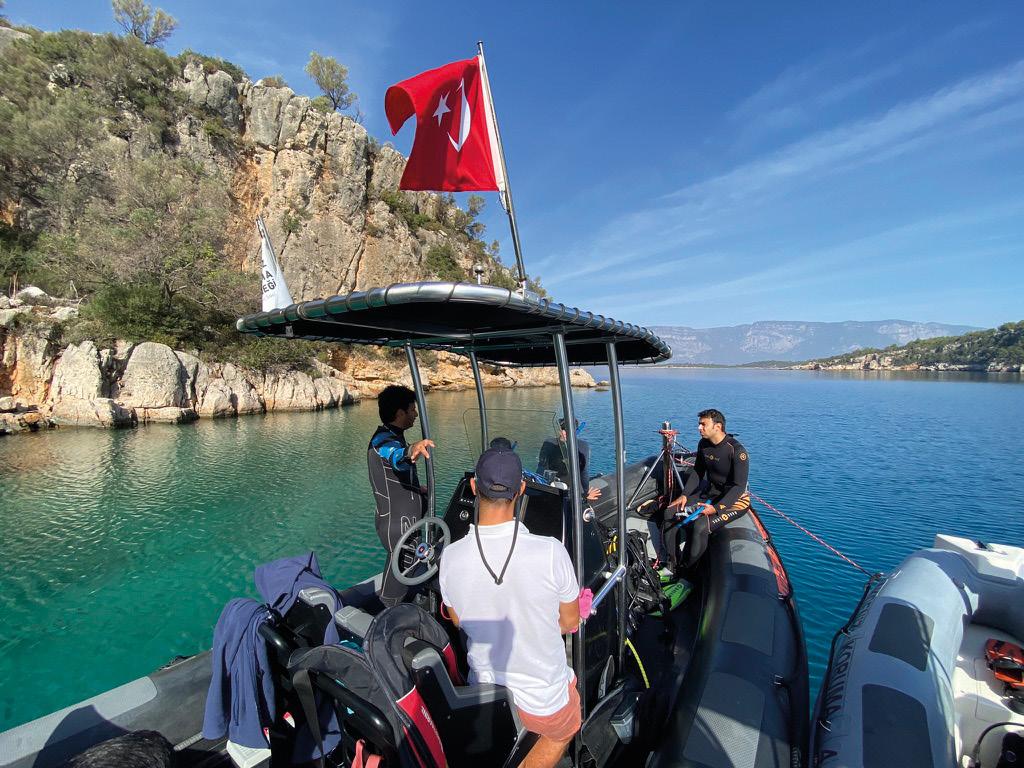
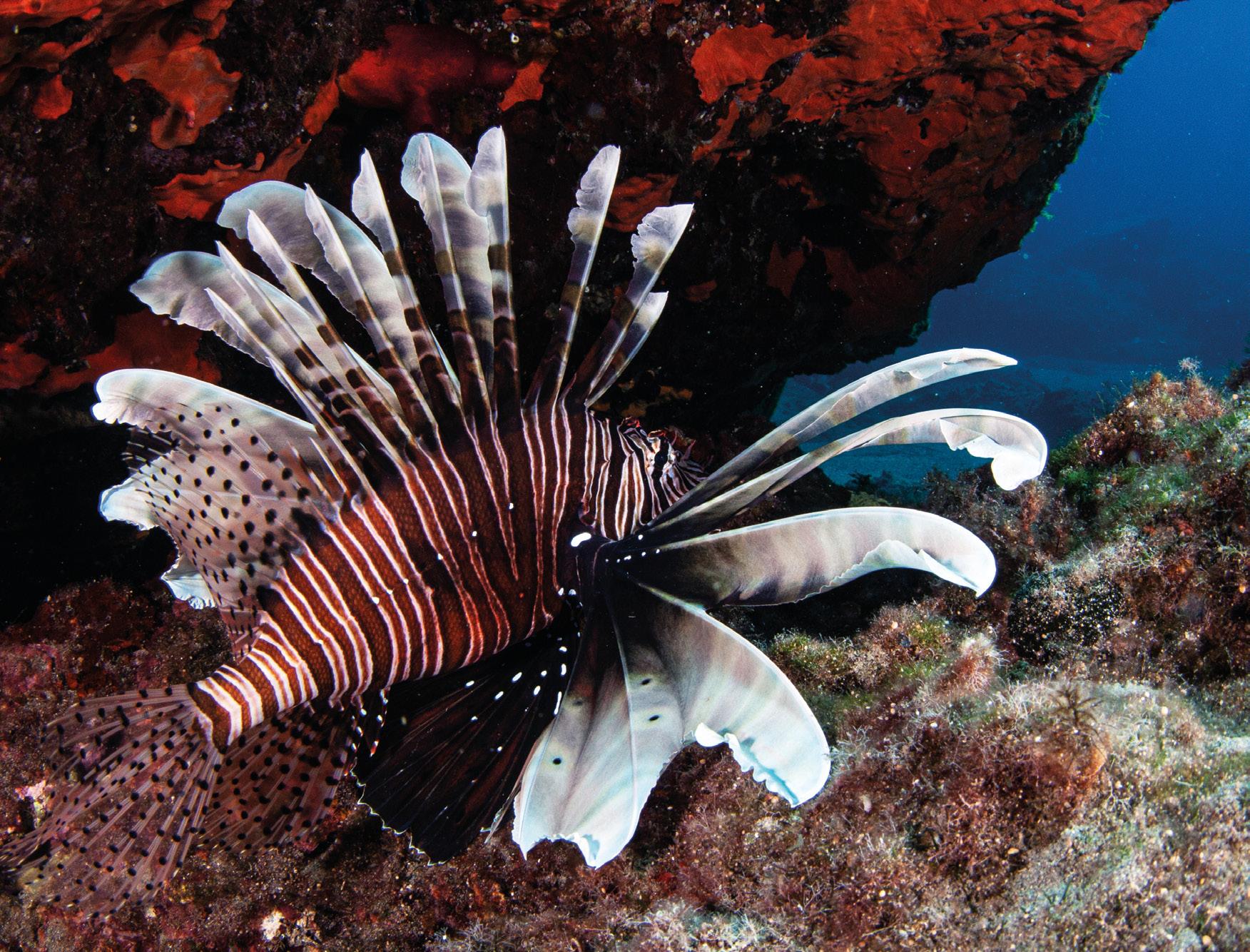
regulations; and we continually monitor ecological and socio-economic recovery. Within the MPAs, results show five times more fish, increased numbers of apex predators, higher resilience to climate change and invasive species, and an increase in income of more than 500 per cent within the female-led artisanal fisheries.
Blue Marine has ten projects in Italy, stretching from Tuscany, Sardinia and Puglia to Sicily in the very south. In 2023, we identified and protected the largest known aggregation of eagle rays in Sicily, saw the return of monk seals to Tuscany, worked to install anti-trawling devices around an MPA in Puglia (not installed yet), removed several tons of ghost nets in Sardinia, and protected a population of sandbar sharks in the Strait of Sicily. The waters around the Aeolian Islands (just north of Sicily) were designated as Natura 2000 protected areas, and we are looking forward to the first nationally designated MPA around Salina, the first Aeolian island to be effectively protected, in 2024.
On Formentera in the Balearic Islands, we partnered with the Vellmari Association to deliver ocean education to over 680 school students, volunteers and trainee educators, also reaching Mallorca and Ibiza. This programme focuses on the critical importance of Posidonia seagrass meadows, which we are actively restoring via seedlings and seagrass fragments.
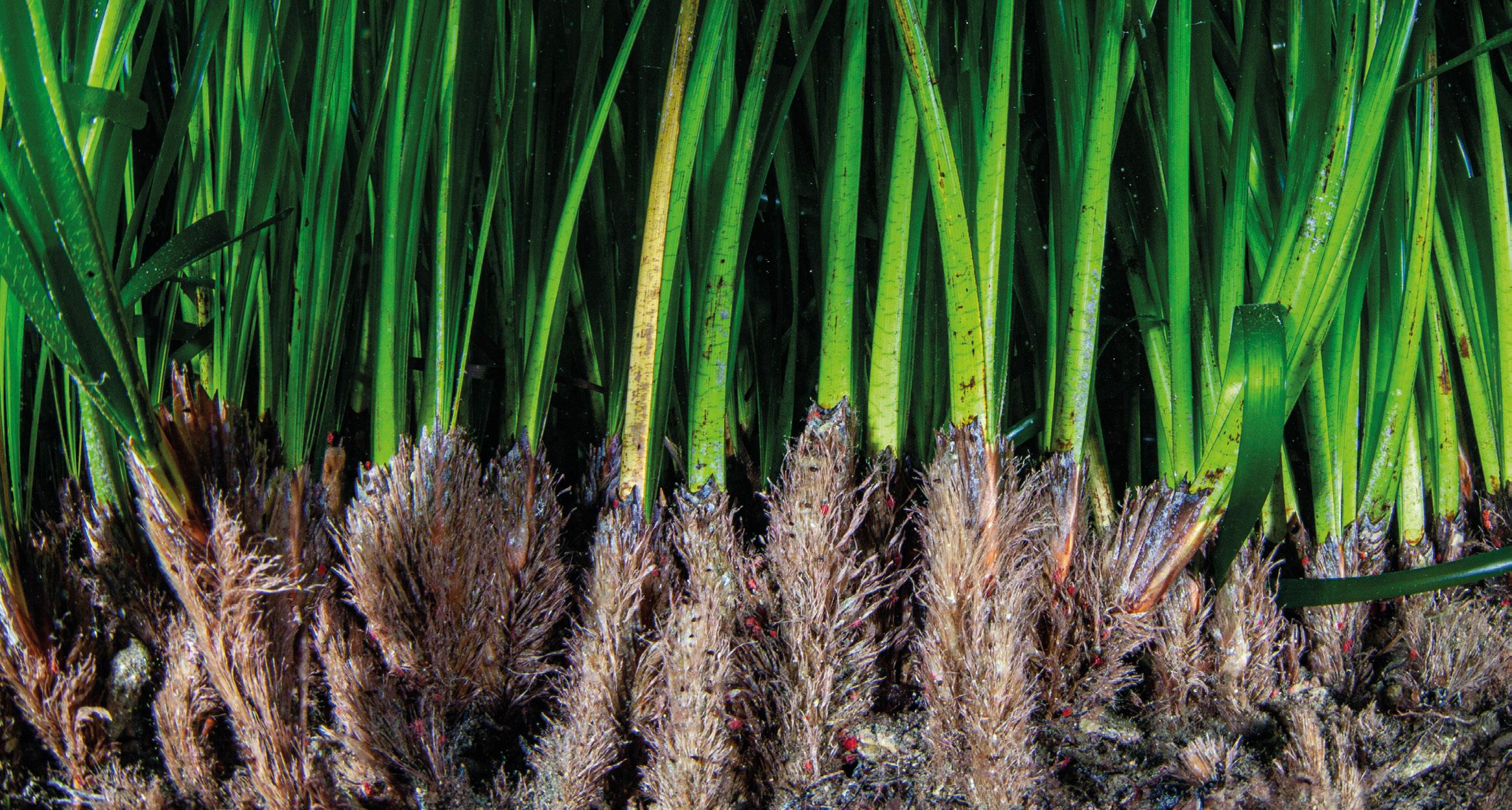
Estimated to be more than 80,000 years old, Formentera's meadow is regarded as one of the oldest living things in the world. Across all the Balearics (with a focus on Mallorca, Menorca and Ibiza), we are also continuing our work within the Calant Xarxes Alliance. Supported by the Marilles Foundation, the Conservation Collective and all Balearic Island Preservation Funds, the Alliance is working on the ground to reduce illegal fishing and promote the responsible supply and consumption of seafood.
In Cyprus, we are working with Cypriot authorities, local researchers, NGOs and the Akrotiri Sovereign Base Authority to designate an MPA around the Akrotiri peninsula, a hot spot for marine biodiversity and home to nesting turtles, monk seals, mobula rays, guitar sharks, underwater caves lined with sponges and corals, and carbon-trapping seagrass meadows. After extensive stakeholder negotiations, we are now mapping and zoning the MPA, setting up a management association and beginning the legal process required for designation.
Blue Marine is also working in Israel with the Morris Khan Marine Research Station to study and protect key nursery areas for critically endangered guitar sharks, and our teams in Cyprus and Israel are undertaking a transboundary initiative to better understand and protect the populations, which may migrate between the two countries. This year we tagged more than 100 individuals, a record in the Med. Most of these were juveniles, which gives us optimism that they are reproducing successfully.

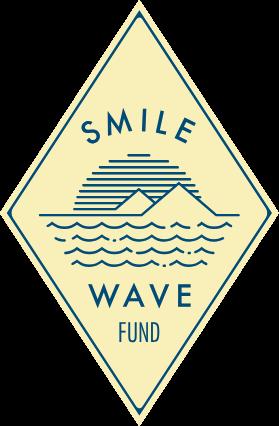
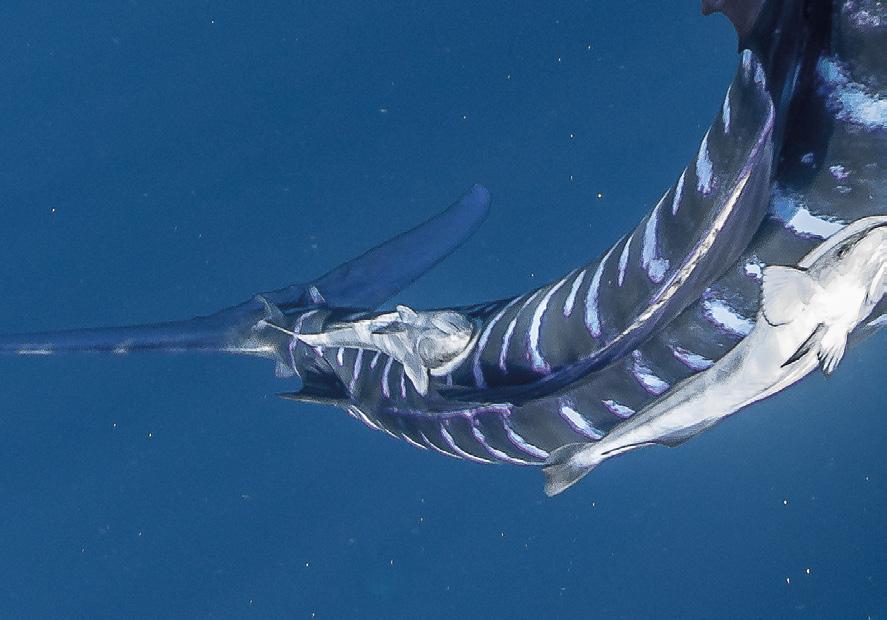
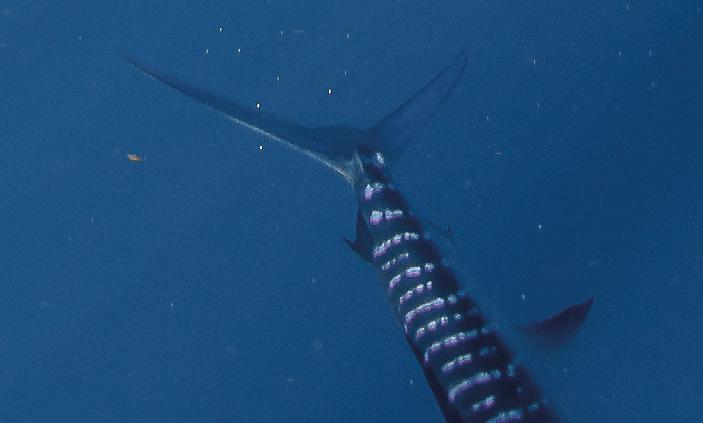
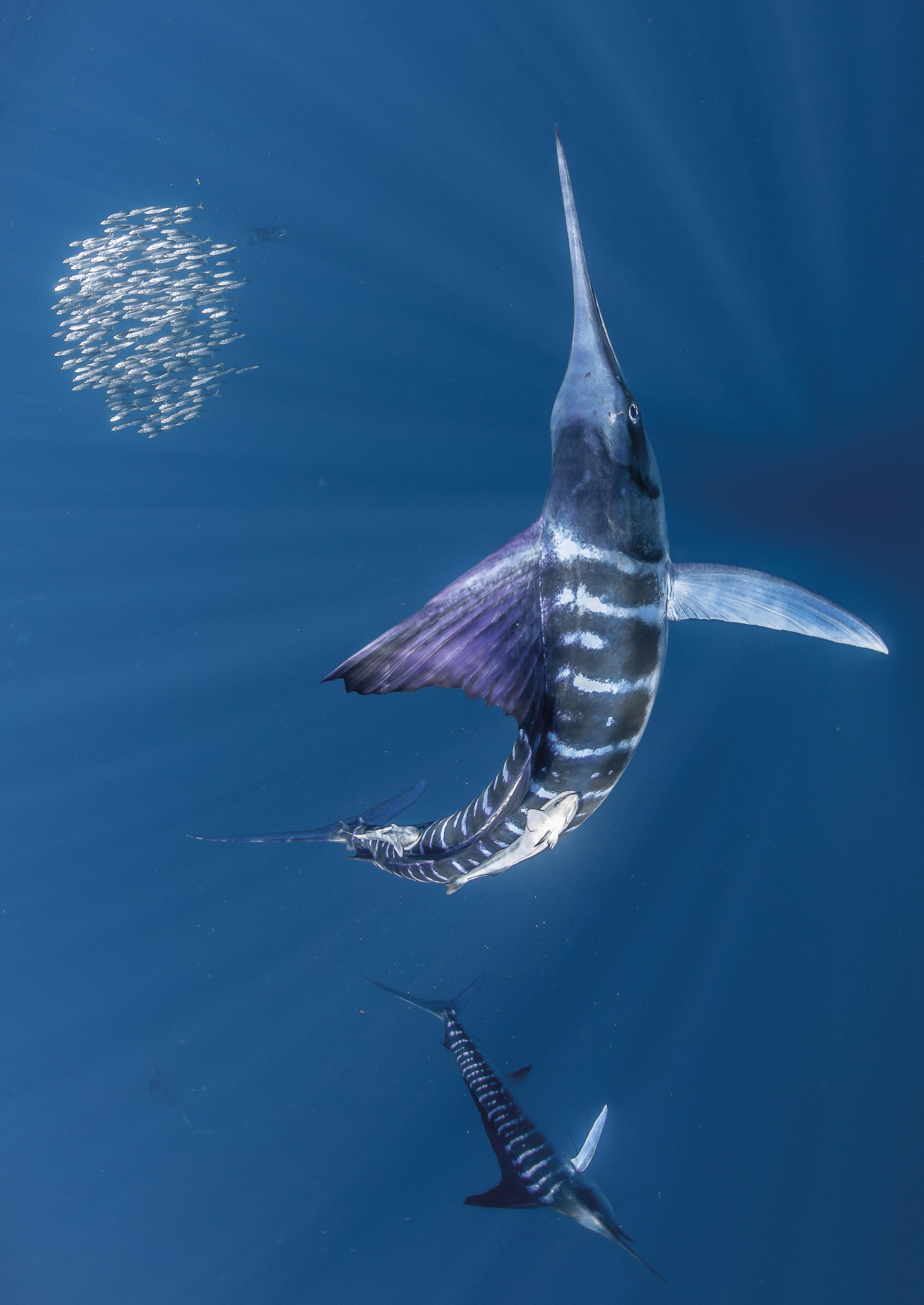
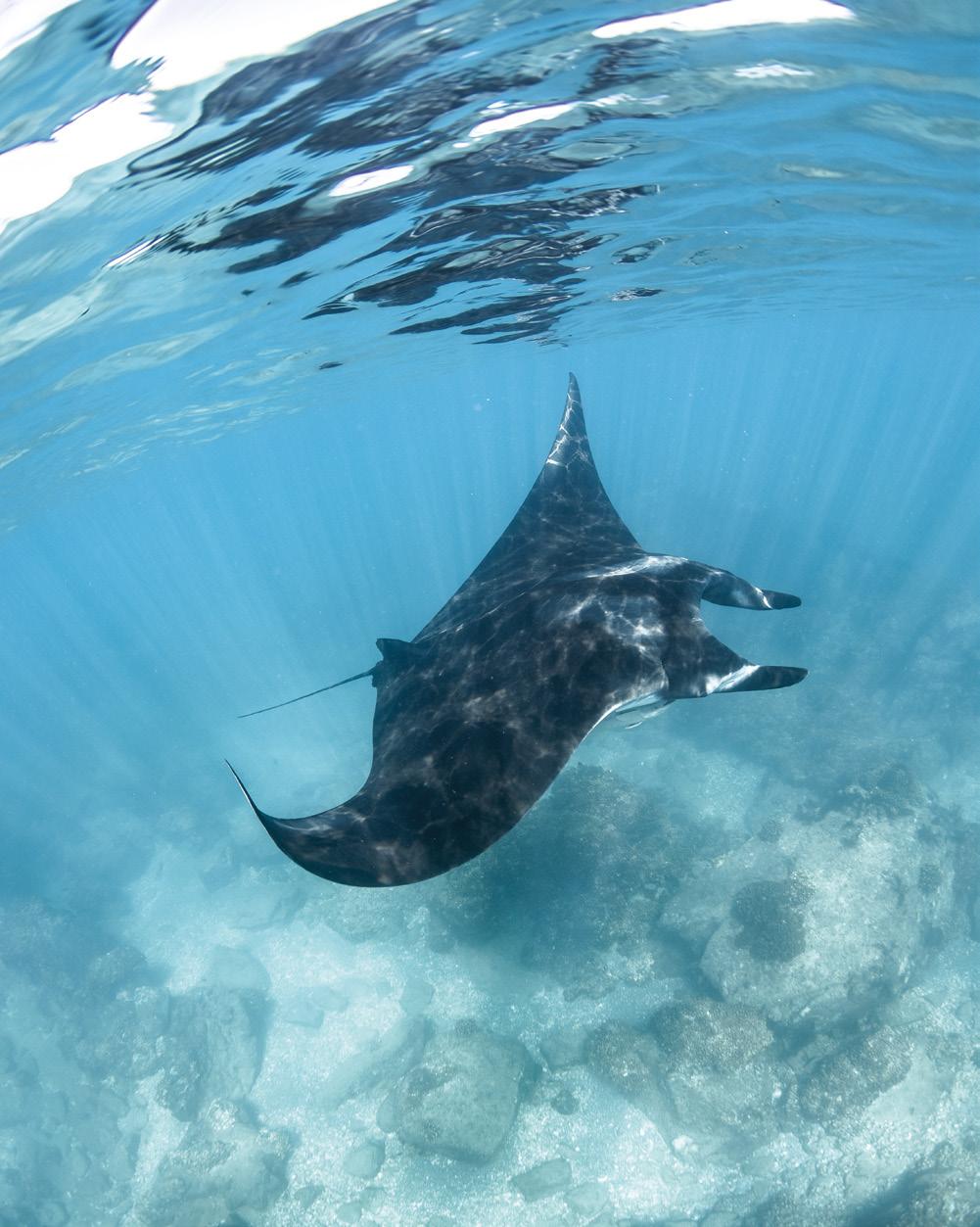
Mexico’s arid Baja Peninsula divides the Sea of Cortez and the Pacific. Since the 1940s, the two seas (Dos Mares) have inspired marine biologists, who admire and study the area’s rich biodiversity. Others have also taken note, and industrial fishing for tuna, marlin, sardines and sharks has stripped the seas of much of the life that existed 80 years ago.
Blue Marine is backing a project to protect over 200,000 sq km — but with an area this large, around a region inhabited by over a million people, in seas that are heavily fished, it is no easy task. It is crucial that local stakeholders understand and support the initiative, and believe that effective management will bring a more prosperous future. We work with a local NGO, Orgcas, laying foundations for the MPA built on community support, trust, investment in sustainable fishing and education.
Industrial fishing may dominate, but this year the small-scale fishers formed an association called DePesca to pressure the authorities to protect the resources on which they rely. Fishers are transitioning from shark fishing to tourism, speaking out against illegal netting and working with conservationists to identify Key Biodiversity Areas (KBAs), which can be protected within the Dos Mares MPA.
Since the global ban on whaling in 1986, most populations have been on the increase, including Blue, Sei, Fin, Southern Right, Humpback, and Sperm whales — arguably one of the greatest ever marine conservation wins. Whales play a key role in the transfer and trapping of carbon in the oceans, and release rare nutrients crucial for phytoplankton, which in turn sequesters more carbon from the atmosphere.
With the expansion of global sea transport, the greatest short-term threat to these species now is being struck and killed by ships. Each year thousands of whales are thought to die this way, mostly unnoticed. Blue Marine works with the Great Whale Conservancy on an innovative solution that reroutes ships to avoid strikes around ports where the animals gather. In 2023 a pilot initiative in Brazil saw almost 100 per cent industry compliance with rerouting advice, likely preventing many deaths. The job now is to roll out the concept in Chile, South Africa, Argentina, Mexico, Europe and beyond, working with the shipping industry to make small adjustments for great conservation gains. With a reduction in casualties, data shows that these remarkable animals can recover to healthy numbers, if there is food for them to eat and protected areas in which to breed.

Rewilding

We fight with multiple partners to keep a wild place wild
The kelp forests of Patagonia spread from the Pacific fjords of Chile, around Cape Horn and up the Atlantic coast of Argentina. The world’s largest schools of squid migrate northward here, followed by predators — including industrial fishers, who are collapsing the populations. Humpback, Blue, Sei and Right Whales also travel up the coastlines.
Blue Marine’s partners here include Rewilding Argentina, SeaLegacy, Patagonia Projects and Defendamos Chiloe. Together we target overfishing and bycatch, industrial salmon farming, destructive trawling, and degradation of habitats — most effectively through identifying key biodiversity areas and understanding political and stakeholder will. In Chile, our partners Defendamos Chiloe are expelling salmon farms from protected areas and ecological hotspots. Our team joined SeaLegacy and Chile’s Minister of Environment on an expedition to highlight the importance of the fjords and to push for their increased protection. With Rewilding Argentina we aim to create a 100,000+ sq km MPA to protect the seabed from prawn trawling, which is destroying habitats and preventing the recovery of fish species. Re:Wild is assisting with a debtfor-nature swap to help fund designation of the MPA. The Patagonia projects team have sailed the ‘Soairse’ to remote marine eco-regions, collecting data to support conservation measures and improve our understanding of this wild underwater world.
Ecological collapse threatens a dozen species with extinction
In the Caspian Sea, through ice ages and heatwaves, prehistoric species such as Beluga sturgeon, Caspian seals and salmon thrived for millions of years, feeding on schools of kilka (a Caspian anchovy) and using the great Eurasian rivers and ice shelves to spawn and rear their young. Then humans arrived, dammed the rivers for agriculture and electricity, overfished the sea, polluted the water, and unknowingly introduced invasive species.
Many marine species in the Caspian are now critically endangered, with all 7 remaining species of sturgeon threatened with extinction. To reverse this path to ecological collapse, Blue Marine has developed an action plan to focus on pressure points where most conservation gain can be achieved.
Banning gillnets reduces poaching and bycatch of migratory fish. Creating protected areas around spawning and feeding grounds enables species to complete their lifecycle. Sustainable aquaculture initiatives provide alternative livelihoods for fishers, and an alternative for the market to wild-caught fish. But this is not enough.
With experts at the University of Leeds, local NGOs, governments and even embassies, we have formed a network of knowledge, on-the-ground capacity and political and community support - in a region where conservation is challenging but necessary. Essentially, everything we do is to prevent the loss of species.
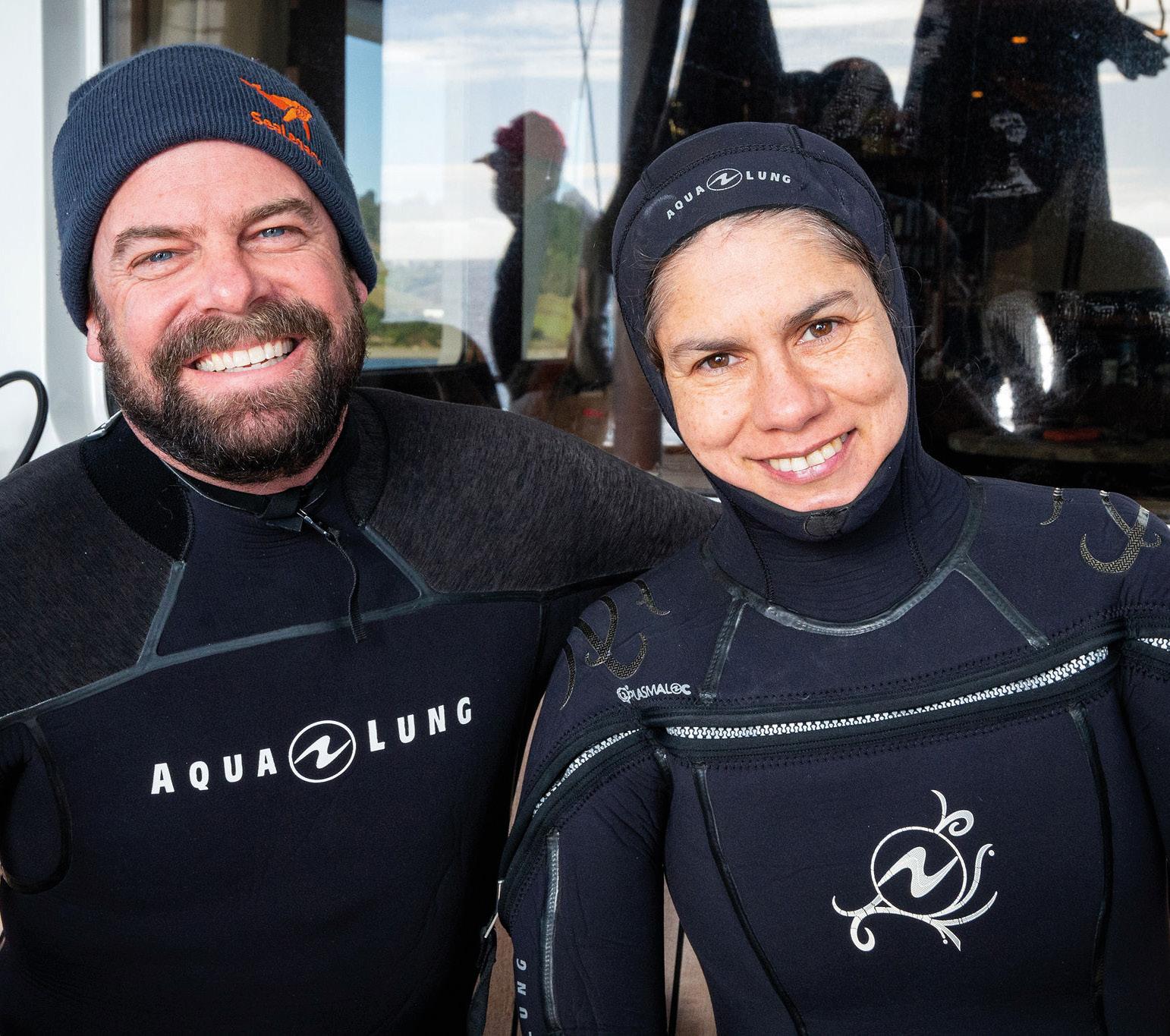
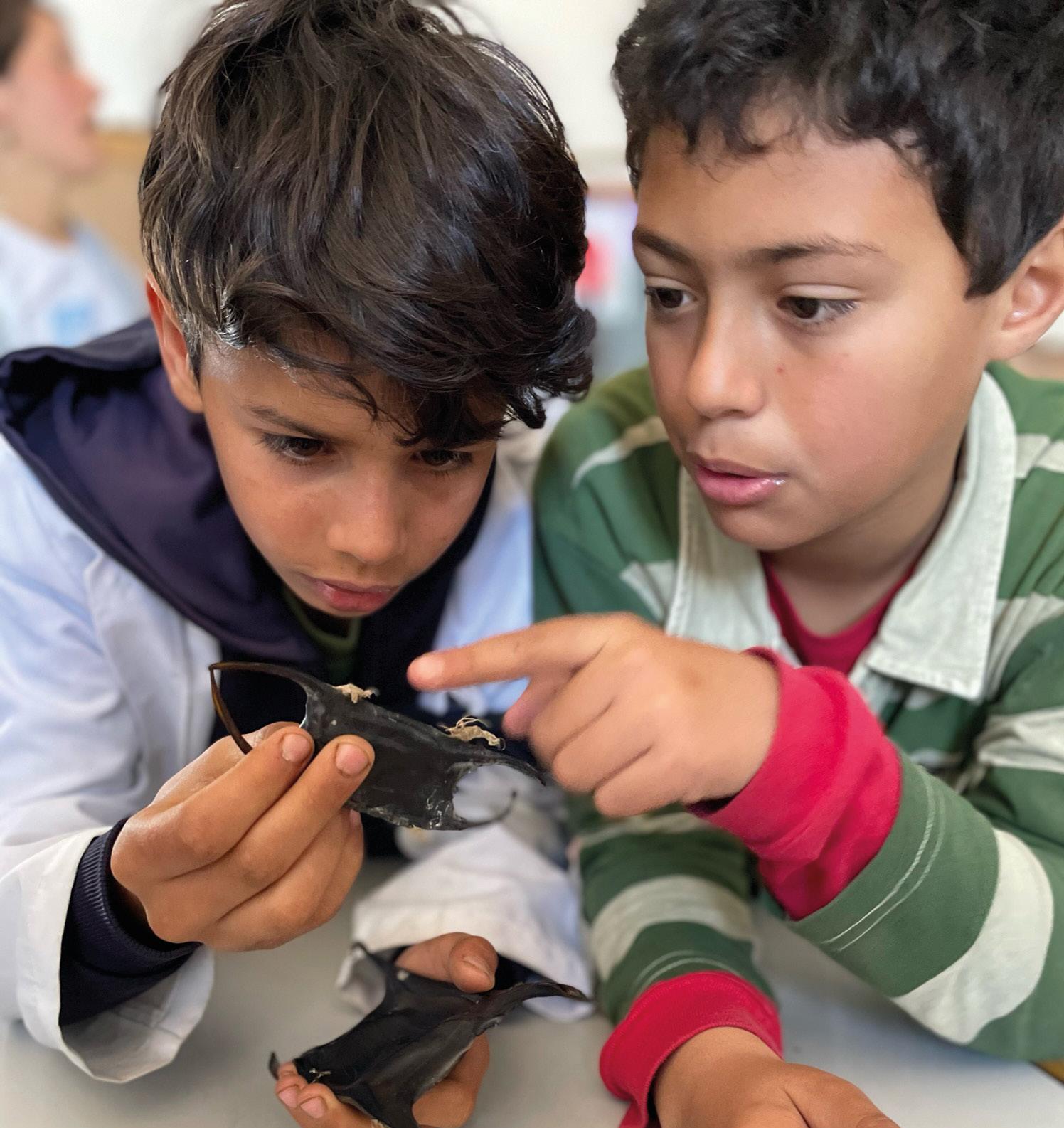
Where the River Plate meets the Atlantic between Argentina and Uruguay, high biodiversity has attracted unsustainable fishing pressure. On deepwater coral reefs along Uruguay’s coastline, more than 100 species of shark and ray feed and reproduce. Sealions, sea turtles, whales, dolphins, and huge schools of pelagic fish rely on this productivity for their survival.

Uruguay’s fishing fleet is small but poorly regulated, and often targets sharks. Fins are exported, as is more than 90 per cent of fish caught in Uruguayan waters. The government lacks capacity to designate and enforce management measures, but does intend to protect 10 per cent of its EEZ within two years and 30 per cent by 2030.
Blue Marine is working with local NGO Mar Azul, the Ministry of Environment, and technology developers to designate effective MPAs. This year we have identified and mapped key biodiversity areas (KBAs) for protection, developed autonomous technology for monitoring and enforcement of MPAs, and rolled out education programmes in coastal schools, encouraging shark-fishing communities to target sustainable fish. With backing from the government and excellent partners on the ground, we are confident that Uruguay will protect its marine life and move to create transboundary MPAs along the WestAtlantic continental shelf.
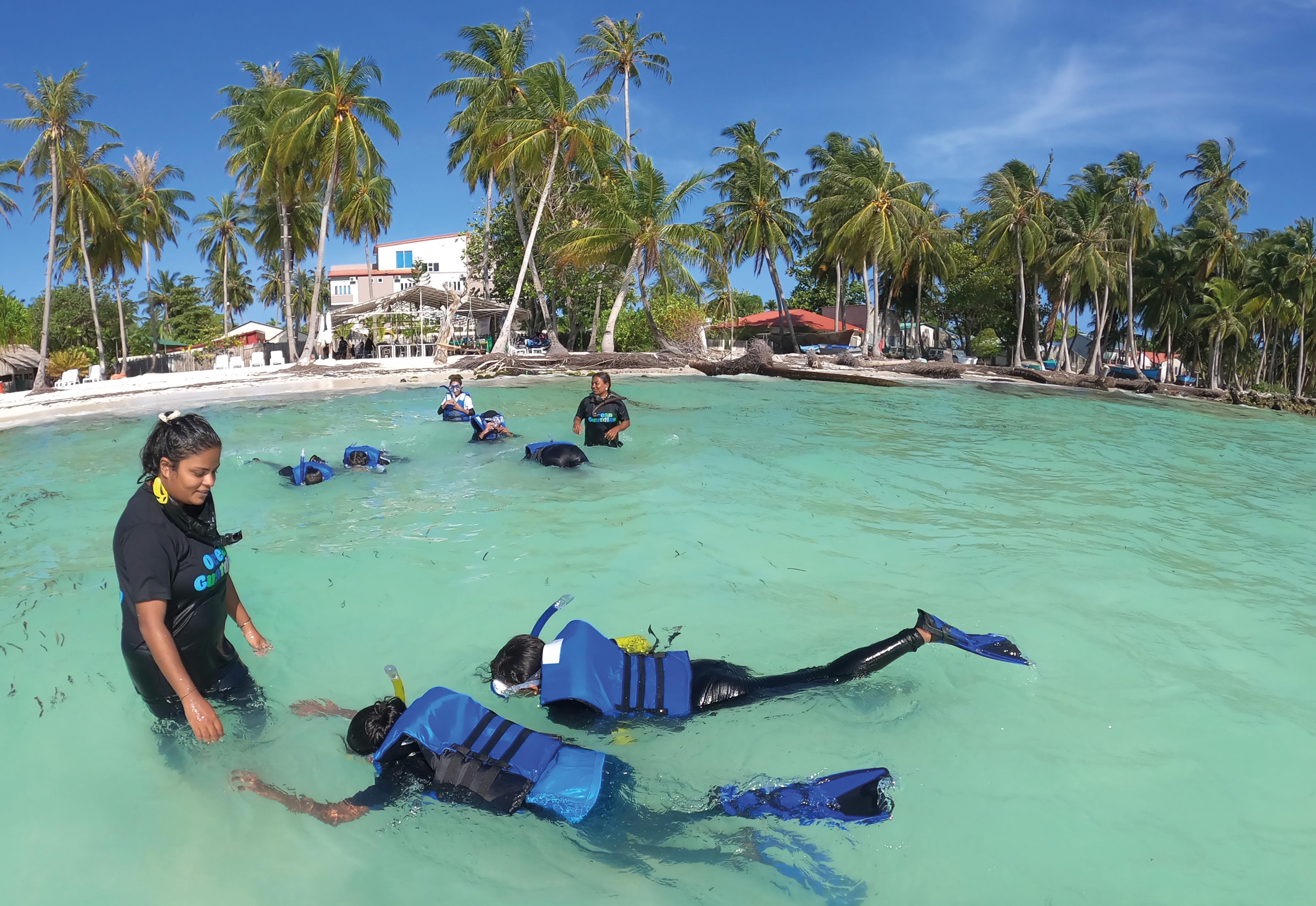
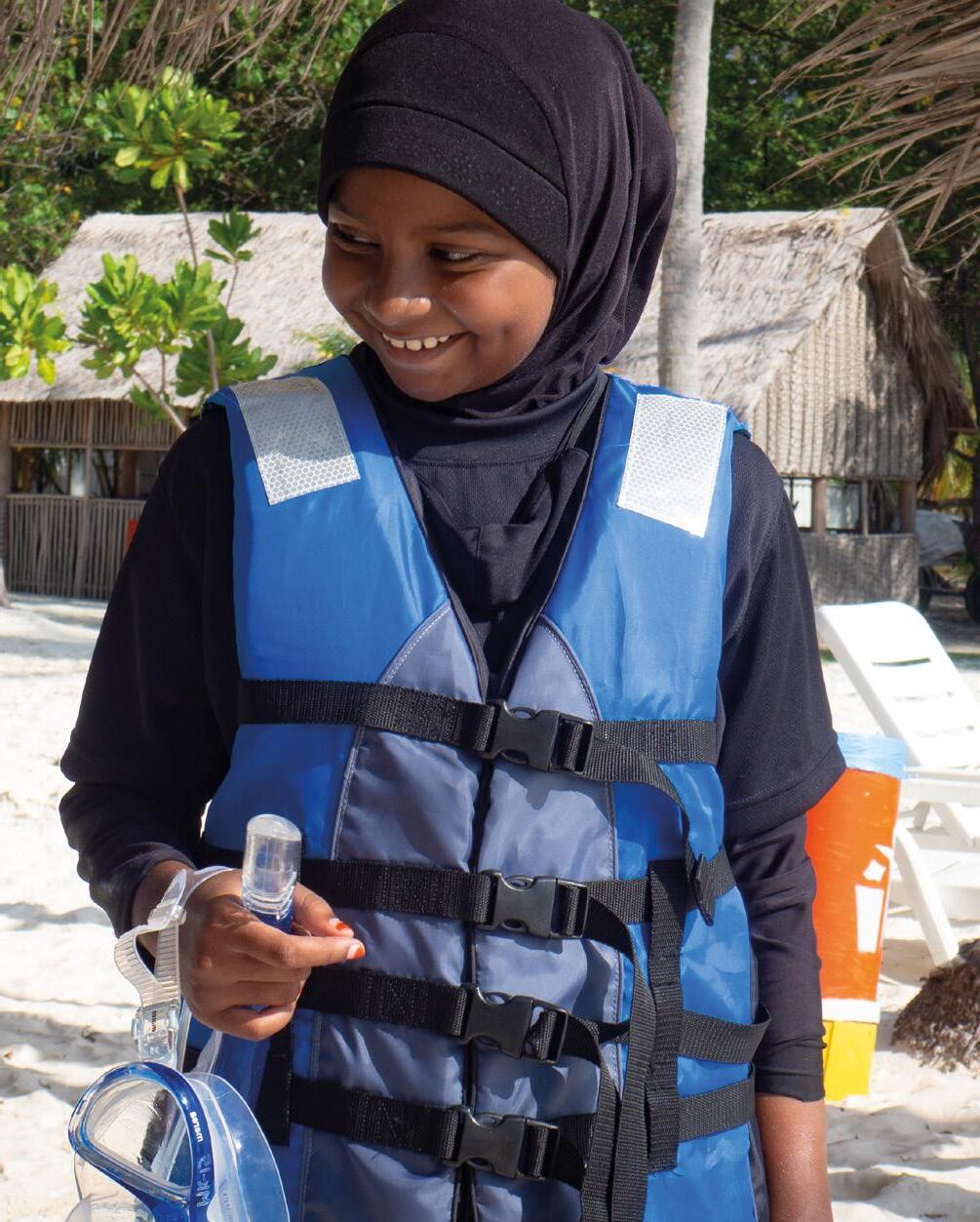
How Blue Marine is supporting locally-led conservation in the Maldives
Conservation has more impact and lasts longer when it is locally led. In 2020, Blue Marine helped establish Maldives Resilient Reefs (MRR), and it is now one of the area’s leading environmental NGOs. In 2023, MRR and Blue Marine rolled out the Laamaseelu Masveriyaa (sustainable fisher) program across three new atolls and tourist resorts. Working with local fishers, this aims to create a market among resorts for sustainable and traceable local seafood.
With MRR we also began work with Laamu Hithadhoo Council on a Community Conserved Area (CCA) in a location that encompasses a grouper spawning aggregation, a manta ray cleaning station, diverse coral reefs and seagrass meadows. After wide
engagement with the community we have formulated regulation and a management plan. This novel project can now be a blueprint for CCAs in the Maldives, through which communities can directly benefit from conservation.
This year Blue Marine and MRR launched Masmahaaa-Veshi, an interactive e-learning platform providing information about reef biodiversity, fisheries and sustainable management. It has been received positively by the government, and is used in fisher meetings. Empowering communities through citizen science, MRR and the Blue Marine team trained 11 new PADI open water divers from Laamu Atoll, seven of whom were trained on the national
teaching Maldivian kids how to snorkel so that they can explore and appreciate their backyard coral reefs. Below Right African penguin and chick Photo Jessica Kemper coral-reef monitoring protocols. We are also undertaking research on the impact of nitrogen on reefs and seagrasses.
MRR and its chairperson Shaha have won several awards, and she now leads a team of six young Maldivian marine conservationists on different islands. She has been finalising her research report, ‘Old Man and the Sea’, for which she will receive a Masters by Research degree from the University of Exeter. Through supporting Shaha’s work and education, we have established a template to empower local conservation leadership in Commonwealth countries. That success can now be replicated.
Balancing the books to protect critical seabird populations
The 9,500 sq km Namibian Islands’ Marine Protected Area is Africa’s second largest MPA, an area of outstanding biodiversity that supports globally significant populations of seabirds and mammals, as well as important industries. But since its gazettement in 2009, it has failed to protect many of its key values, and is threatened by overfishing, mining, pollution, untested phosphate extraction, and live mammal harvesting.
With partners the Namibian Nature Foundation and SAERI, Blue Marine is supporting the Namibian government to develop and implement a new management plan, zoning and regulations, and a financing plan. We have conducted two workshops with the Ministry of Fisheries and the government is reviewing the updated management plan.
The Blue Economics team has put together an internal report of 11 different sustainable financing mechanisms. The team visited in October, and our senior economist budgeted out costs with government officials.
Blue Marine is also supporting the Ocean Literacy task team on guidance for educators and engaging resources for schools. In November 2023, we held a workshop in Swakopmund, Namibia to gather educational content around the seven UNESCO Ocean Literacy Principles. Attendees included representatives of primary and secondary schools, the Ministries of Education, Fisheries and Environment, and the University of Namibia.

Hats off for their Panama commitments

The six islands of the Dutch Caribbean are a migratory stopover point, home to hundreds of species of fish, 25 species of sharks, and many species of whales, dolphins and seabirds. Their combined exclusive economic zones (EEZs) cover 81,000 sq km, and the coral reefs of Aruba, Bonaire, and Curaçao make up some of the only healthy, living reefs left in the Caribbean. Climate change has resulted in ocean warming, acidification, and an increase in storms, which threaten their survival.
Blue Marine has worked here since 2020 and built good relationships with the Dutch Government, as well as the island governments, the Dutch Caribbean Nature Alliance (DCNA), and local NGOs. There is high ambition for conservation through the creation of marine protected areas (MPAs).
In 2023, with partners DCNA and Blue Nature Alliance, we helped to catalyse major government commitments at the Our Ocean Conference in Panama. Aruba committed to creating an EEZ-wide MPA covering 25,199 sq km, while the government of
Curaçao said it will designate 30 per cent of its EEZ as a no-take MPA, covering 9,128 sq km. Blue Marine is also supporting the St Maarten Nature Foundation to secure the legislative framework needed for St Maarten’s only MPA.
In addition, we began working with the Curaçao government on a Nature Policy Plan that will outline specific commitments alongside a strategic vision for the protection of the island’s nature and biodiversity. Blue Marine is providing technical assistance in drafting the plan, as well as coordinating the necessary stakeholder engagement.
In 2024, the Nature Policy Plan will be launched; Blue Marine and DCNA will host two workshops in the islands, focusing on aspects of MPA designation and implementation; we will also be working closely with partners to help achieve the Curaçao and Aruba MPA designations by the end of 2025.
The rich ocean around St Vincent and the Grenadines in the south-eastern Caribbean is host to essential habitats and diverse species, and critical for local livelihoods and food security. However, less than one per cent of its 36,000 sq km EEZ is protected. The government of St Vincent has nevertheless signed up to the High Ambition Coalition’s objective of protecting 30 per cent of global seas by 2030, and requested an analysis of its fisheries through the St Vincent and Grenadines Environment Fund (SVGEF).
SVGEF invited Blue Marine to conduct the survey, and in 2022 we carried out research with a focus on conch and reef fish. Our experts used the data to indicate the health of stocks and identify hotspots for juvenile conch abundance.
This year a report was presented to the government that included fisheries policy recommendations, and the Minister of Fisheries has announced that he will take these forward. Meetings are now underway with the minister and fishers regarding the proposed ‘closed season’ on conch. Blue Marine’s project also engaged fishers to ensure acceptance of future regulations. The fishers proposed closed areas and timings for the closed season, to protect stocks while still supporting their livelihoods.



Momentum builds behind the Club as more of the global yachting community join to support ocean conservation
Blue Marine hosted its annual Blue Marine Yacht Club (BMYC) Monaco Auction at the Monaco Yacht Show in September onboard the Lürssen superyacht, Phoenix 2 designed by Winch Design. Both Lürssen and Winch Design are long-standing major partners of Blue Marine. It was the best-attended event to date, in the company of the Club’s Founding Patron, HSH Prince Albert II of Monaco, who arrived in the Blue Marine Electric MOKE with Peter Lürssen and Blue Marine Head of Partnerships, Sara-Jane Skinner.
The night was generously sponsored by long-term major partner, Lürssen GmbH and partner and champagne sponsor, Adnams. Unique prizes were donated by MercedesAMG PETRONAS Formula One Team, Blue Circle members and artists Olly & Suzi, Ukrainian artist Mariya Dykalo, and long-term supporter Steve Edge.
After inspiring speeches from Blue Marine and uplifting words from Steve Edge, guests had the chance to donate and support our global portfolio of projects, bid on an array of unique auction items, become a BMYC member, and enjoy the first chance to purchase one of the newly released limited-edition, electric Blue Marine 30x30 MOKEs.
Blue Marine, Steve Edge and MOKE International have teamed up again to create the special ‘Blue Marine 30 x 30 MOKE’, in a limited edition of only 30 cars, to support Blue Marine’s target of protecting 30 per cent of the world’s ocean by 2030. The ocean-themed electric MOKE was exclusively released as a pre-launch sale at the BMYC event, ahead of the public launch, due in early 2024. A donation of £10,000 will be made to Blue Marine from the sale of each car. If you would like one, please email Sara-Jane Skinner: sarajane@bluemarinefoundation.com
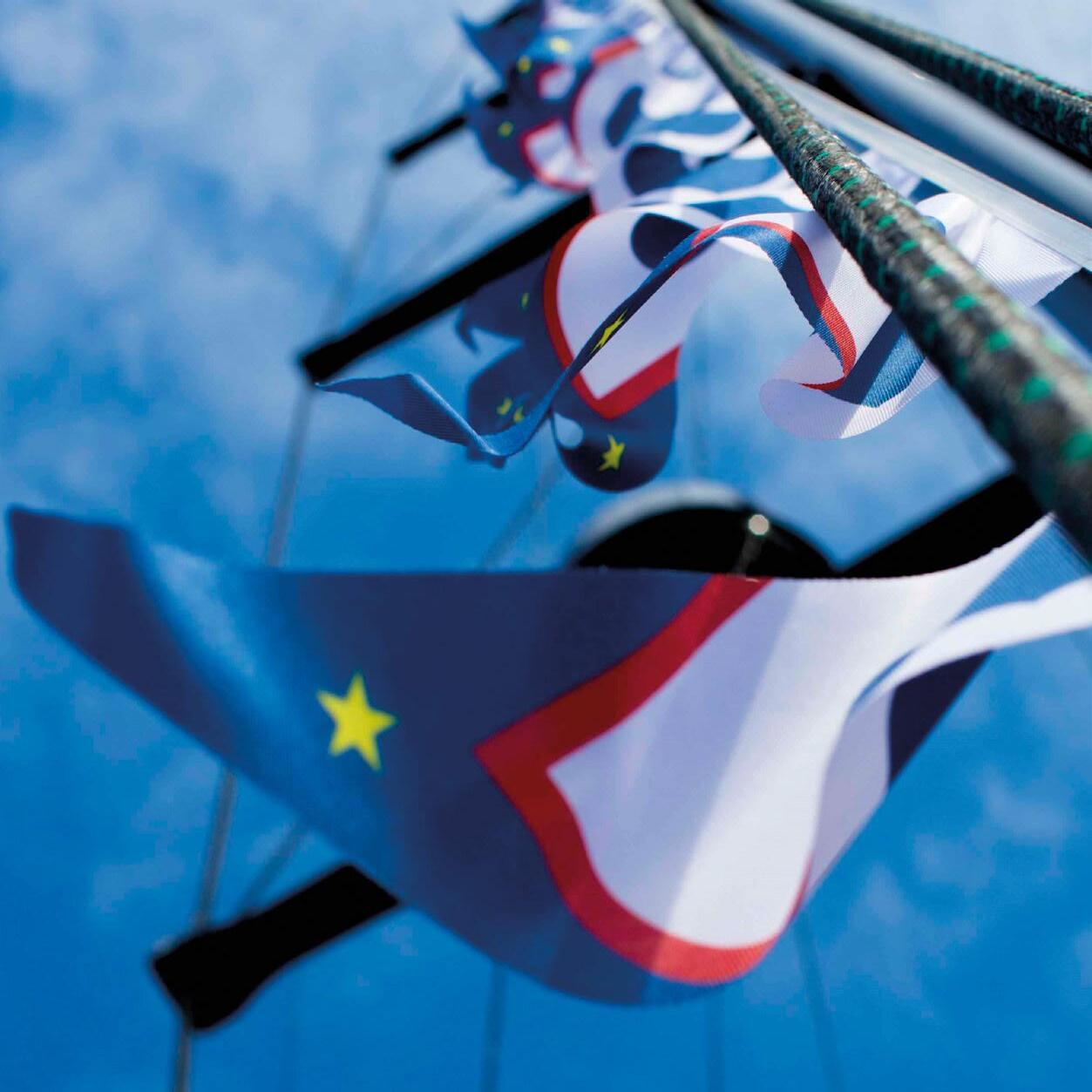
“Blue Marine is an active commitment with not only plans and ideas, but actions, follow ups and results. There is real work at Blue Marine, real intentions and goals. It makes the choice to support them an obvious one. I believe it is important to give back to the source that our business relies on and uses daily. The electric limited edition ‘Blue Marine 30 x 30 MOKE’ is another brilliant initiative by Blue Marine to raise awareness and funds for their work. It’s also a stress-free drive, knowing a carbon- zero emission bubble will be following behind me in the wind!”

NICK EDMISTON, CHAIRMAN EDMISTON, ONE-STAR BMYC MEMBER

This Blue Education unit created a fun and engaging activity booklet for our new BMYC Young Ambassadors programme.
The booklet has been designed to educate and inspire BMYC members and their families when onboard yacht about the marine environment and how to make life at sea more sustainable. By being transported to some of Blue Marine’s projects and yachting hotspots around the world, readers learn about the ocean challenges in each area and find fun solutions to today’s biggest questions.

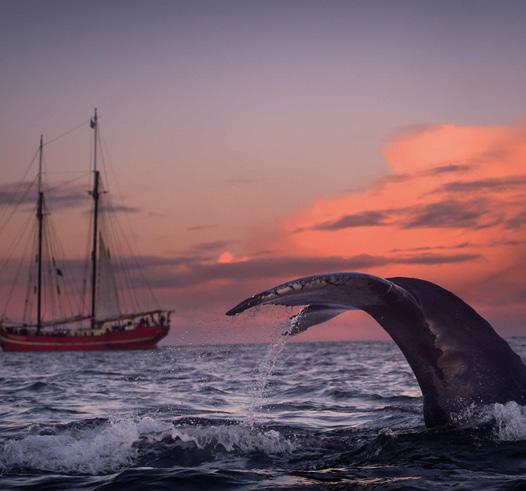
The Blue Marine Yacht Club (BMYC) was launched in 2012 by His Serene Highness Prince Albert II of Monaco, its Founding Patron, and has the health of the ocean at the heart of its philosophy. By putting the superyacht community on the front line of marine conservation, the BMYC is mobilising an industry that loves and relies on the ocean, and which can direct major resources into tackling the problems the ocean faces, while also helping to slow climate change.
BMYC members lend their support not just with financial donations, but with their influence, connections, and expertise. This enables Blue Marine to unlock new project areas, increase global marine protection and restore vital sea habitats, which protect vulnerable species but also absorb and store carbon.
To join the BMYC is to team up with a committed group of people who have a unique ability to influence the way the ocean is managed for years to come.
For further information about joining the Club please contact:
sarajane@bluemarinefoundation.com +44(0)7435 289410


1,100
A royal send-off in London inspired 100 intrepid riders on our charity bike ride across seven countries to Monaco
From the 19th to the 26th of September, 100 riders took part in our epic 2023 cycle ride to raise awareness and funding for Blue Marine’s projects around the world. On Day One, Blue Marine Ambassador Lady Amelia Windsor cut the ribbon to give them a royal send-off, sponsored by Winch Design, and our riders began a journey from London to Monaco that would pass through seven countries.
A core of 50 in striking green-and-blue kits pressed on with the 1,000km ride, cycling through the Netherlands, down the beautiful Rhine in Germany, briefly into France, before entering the dramatic Swiss Alps and descending to the stunning Italian lakes. Returning briefly to France and the gorgeous Côte d’Azur, they were finally greeted at the Palace of Monaco by HSH Prince Albert II, and a Grand Prix-style finish of champagne spray, sponsored by Adnams.
“When I see the good work being done by teams like Blue Marine, I feel optimistic that we can stop the damage to our planet together”
LADY AMELIA WINDSOR
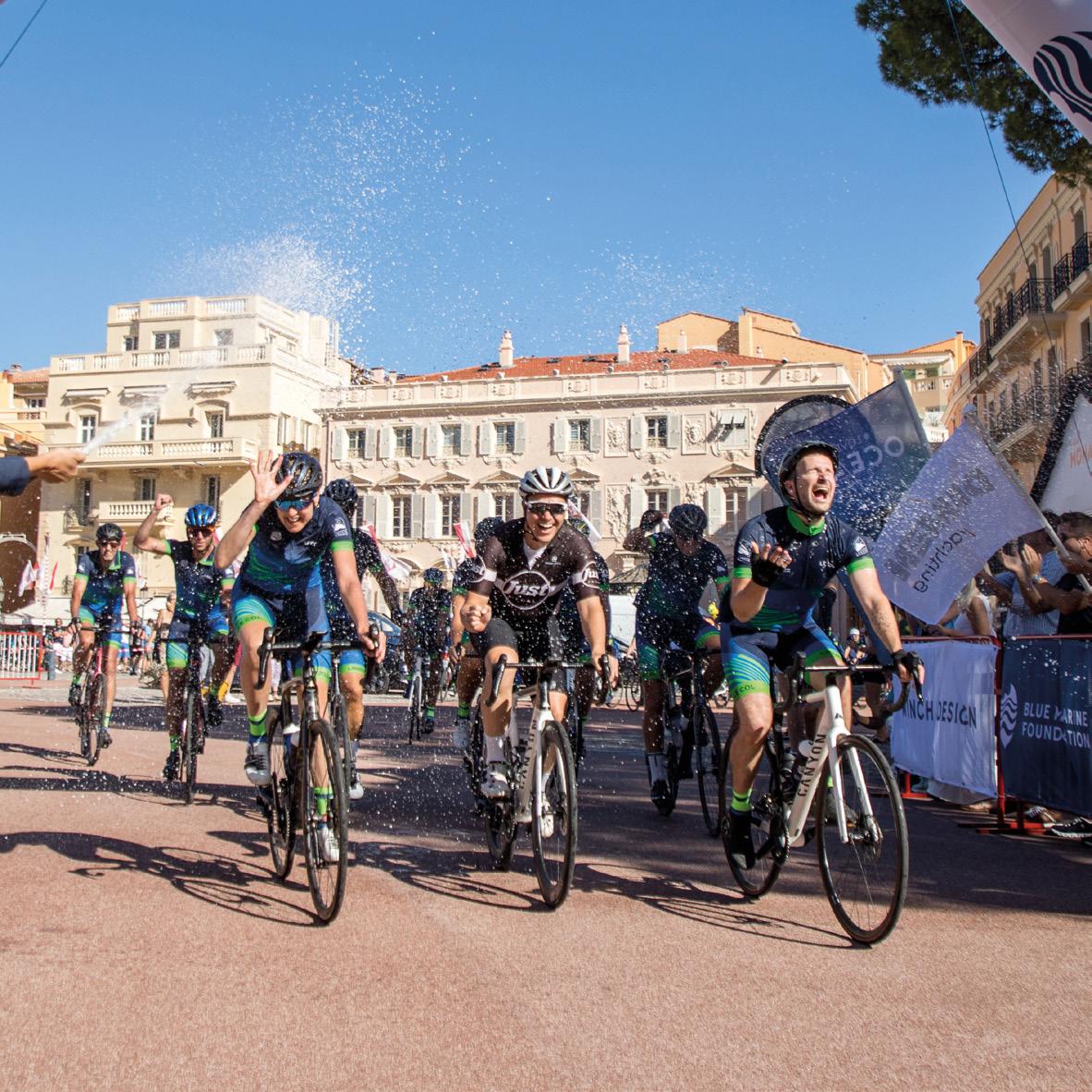
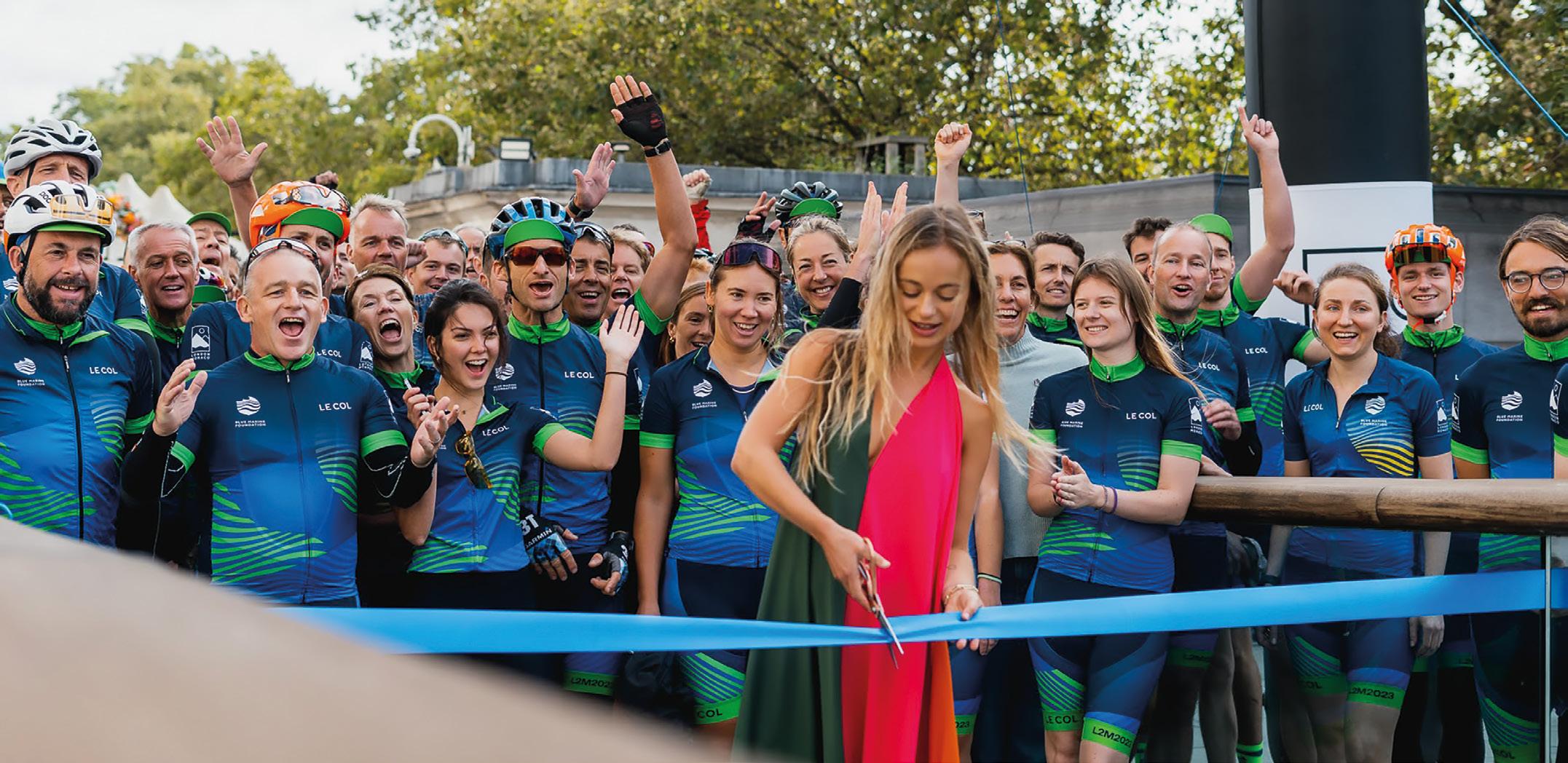
Event partners
This epic voyage would not be what it is without the amazing event partners who join us on the ride. An enormous thanks goes to them for their extraordinary support of London to Monaco and Blue Marine, and for making the event such a special experience.
We were joined by a new event partner this year, as Tom Austin hit the saddle with aplomb, taking stunning photographs along the entire route.

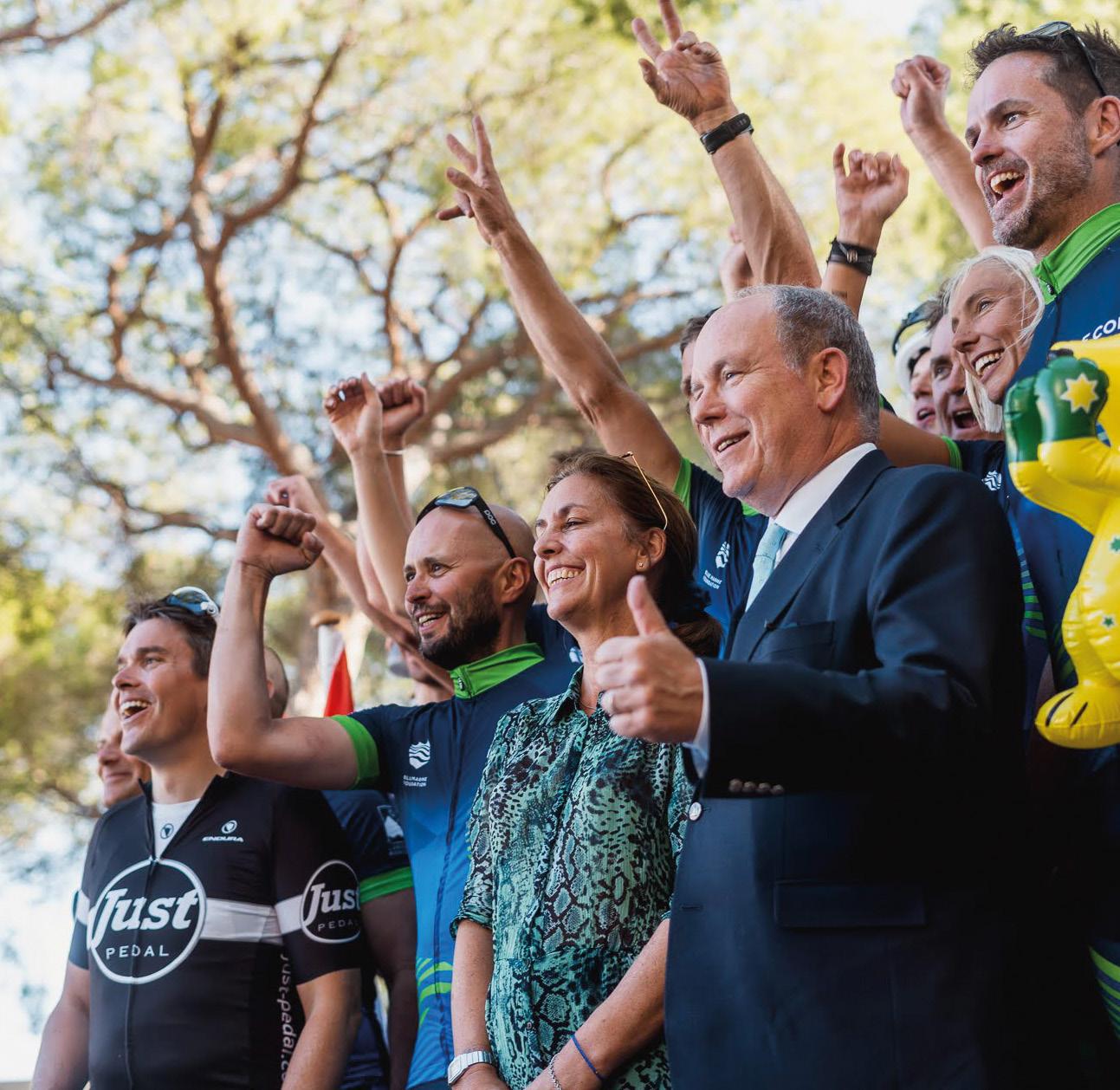
580 RIDERS
17 DIFFERENT COUNTRIES

TOM AUSTIN



CO-FOUNDERS
Charles Clover
George Duffield
Chris Gorell Barnes
TRUSTEES
Arlo Brady Chairman
Sofia Blount
Craig Davies
Treasurer
Lord Deben
Celine Herweijer
DIRECTORS
Clare Brook CEO
Judith Brown
Projects Director
Jo Coumbe Communications Director
Dan Crockett
Director of Ocean and Climate
Lynne Smith
Finance Director
David Tudor Programme Director
BLUE MARINE TEAM
Tom Appleby Chief of Legal Affairs
Kaija Barisa Senior Blue Economist
Emily Bulled UK Conservation Engagement Co-ordinator
Priyal Bunwaree Senior Legal Counsel
George Duncan-Jones Investigator
Olivia Eadie Office Manager
Jake Edmiston Projects Researcher
Sam Fanshawe Senior UK Marine Projects Manager
Jasmine Finbow Policy Intern
Gail Fordham Convex Seascpape Survey Grant Manager
Gabi Gilkes Convex Programme Manager
Eric Harris-Scott Solent Oyster Restoration Project Officer


Shaha Hashim Maldives Project Manager
Luke Helmer Restoration Science Officer
Anna Hughes Senior Education and Outreach Officer
Jonathan Hughes Senior UK Marine Policy Manager
David Hutton Head of Finance
Alea Laidlaw Information Officer
Hannah Le Brocq Development Manager
Fiona Llewellyn Senior Project Manager
Sophie Locke Senior Research and Projects Manager
Louise MacCallum Solent Restoration Project Manager
Hamish Mackay Events and Sponsorship Manager
Aisling McGarrigle Ocean Climate Policy Officer
Maddie Millington-Drake Senior Climate Project Manager
Rory Moore Head of Projects
James Morris Climate Project Manager
Jenny Murray Senior Restoration Projects Manager
Emma Nicol Senior Communications Officer
Emily Norris Head of Development
Zarieu Rashid
Project Accountant
Jess Rattle
Head of Investigations
Sofia Regalado Research Coordinator
Joe Richards
Scotland Project Manager
Florence Richardson Assistant Management Accountant
Juliette Scott
Senior Researcher
Sara-Jane Skinner
Head of Partnerships
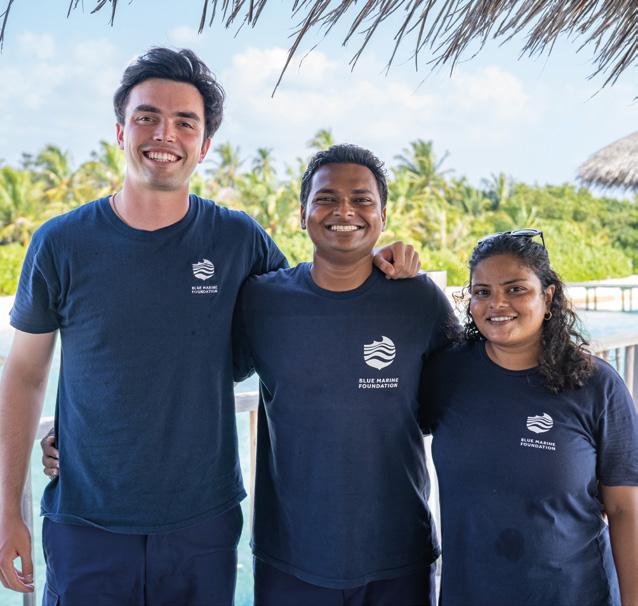
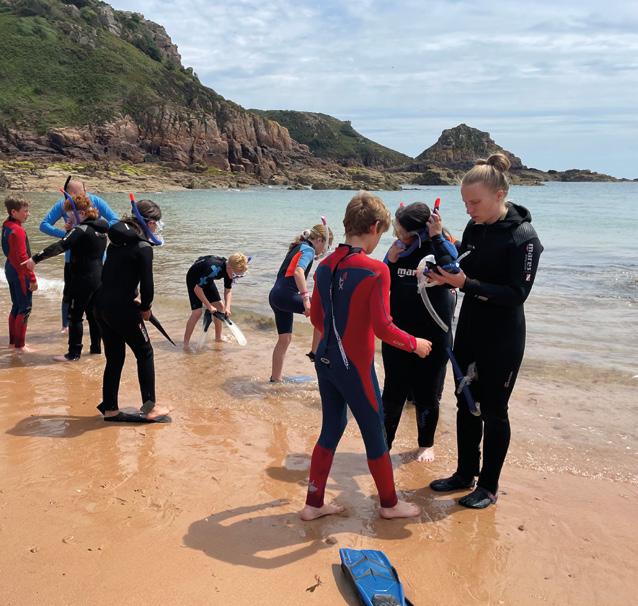

Kathryn Smith
Jersey Project Officer
Jordan Sutherland Development Manager
Matthew Uttley Restoration Project Manager
Freddie Watson
Jersey Project Manager
Appin Williamson Research & Impact Adviser
Marina Windsor Events Manager
Rosalie Wright
Seascape Project Coordinator
Jenny Baker
Laamu Project Manager
Giulia Bernardi
Italy Projects Manager
Natasha Bradshaw
National Marine Parks Consultant
Adrian Gahan Government Affairs Advisor
Vreni Haussermann Consultant
Tom Horan Editorial Consultant
Matt Jarvis Filmmaker
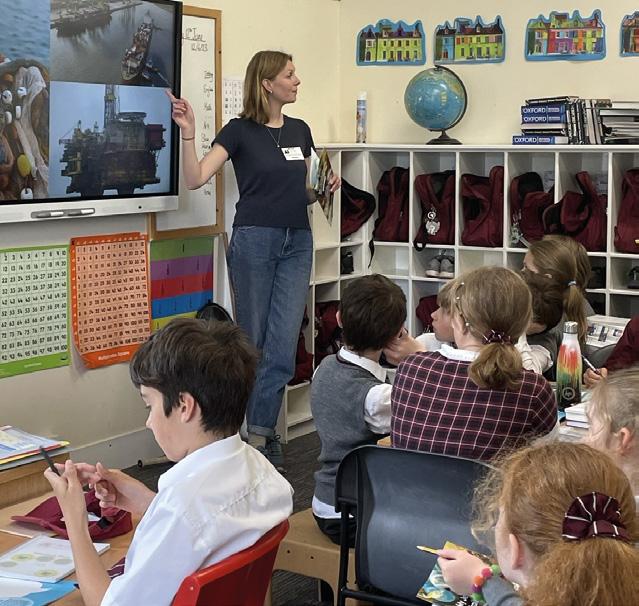
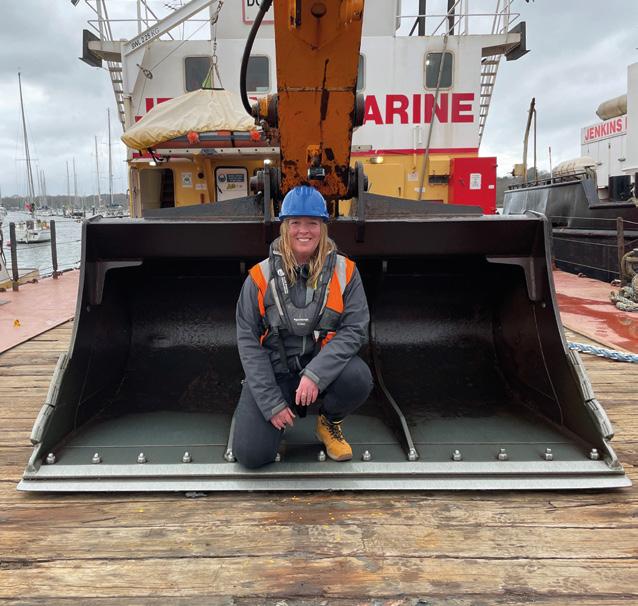
Angela Lazou Dean
Greece Marine Projects Manager
Sam Mead Software Engineer
Ambra Messina
Italian Projects Communications Manager
Hassan Moosa
Laamu Project Officer
Sriram Natarajan
Blue Marine Economics Consultant
Lisa Samos
Arts and Events Consultant
Tim Scoones Media Consultant
Andrew Woods Operations & Risk Consultant
Afaaz Zahid Resort Research and Fisheries Officer
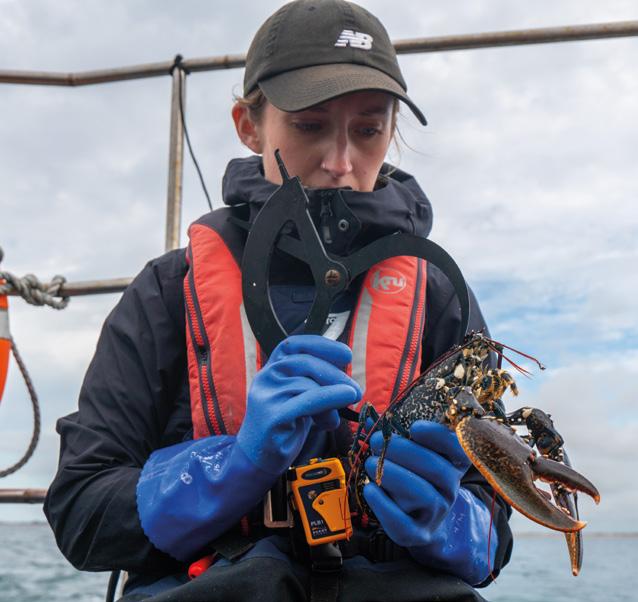

Our donors and supporters enable all the work we do, and underpin our conservation efforts. We would like to extend our deepest gratitude to every individual who has generously contributed to our work. Your commitment has not only helped us progress our mission but has helped us achieve significant milestones in restoring the oceans to health.
In particular, we would like to thank Convex Group for supporting a five-year, pioneering global research project that will generate the critical data and insight on how to manage the ocean sustainably to maximise its carbon storage capabilities; the Don Quixote Foundation, for supporting our Blue Legal and Blue Media units, our work in the Dutch Caribbean and giving us flexibility to scope new MPA opportunities; UBS Optimus for their support of our work in Greece, Ascension Island and Italy; and the Flotilla Foundation, for supporting the work of both our Blue Legal and Blue Climate units.
We would especially like to thank James Blunt, Chris Evans, Golden Acre Foods, the Hampshire and Montpelier Foundations, Klarna, Steve Koltes, Nobiskrug, OceanOutdoor, Parley and Mike Sharp for their generous support.

And finally, huge thanks to our co-founders, George Duffield and Chris Gorrell Barnes, whose brilliant idea Blue Marine was and who work tirelessly to find donors and to drive us to ever more heights of ambition.
Major partners play an integral role in Blue Marine’s progress and the impact it has around the world, and are recognised for making significant contributions to restoring ocean health.
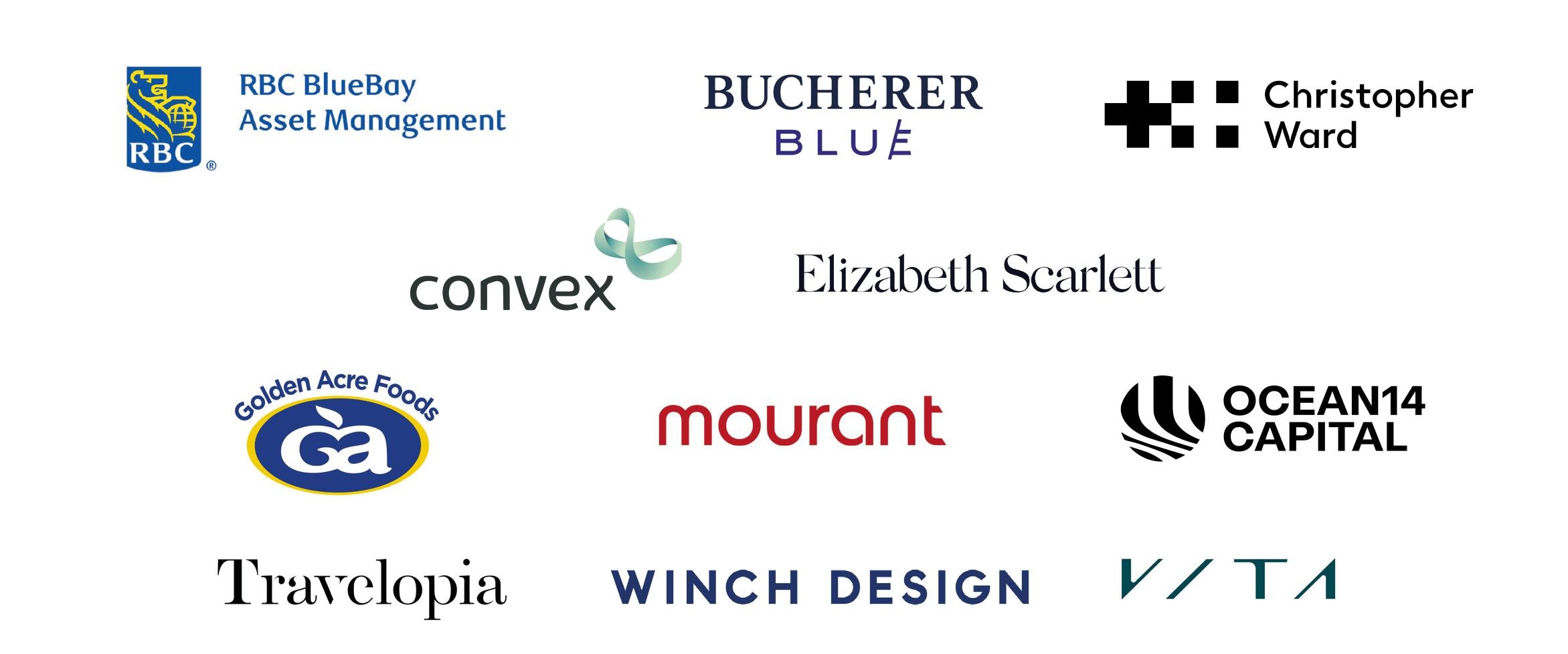
Corporate partners provide Blue Marine with core support and a global platform from which to raise awareness of our ocean and our mission.
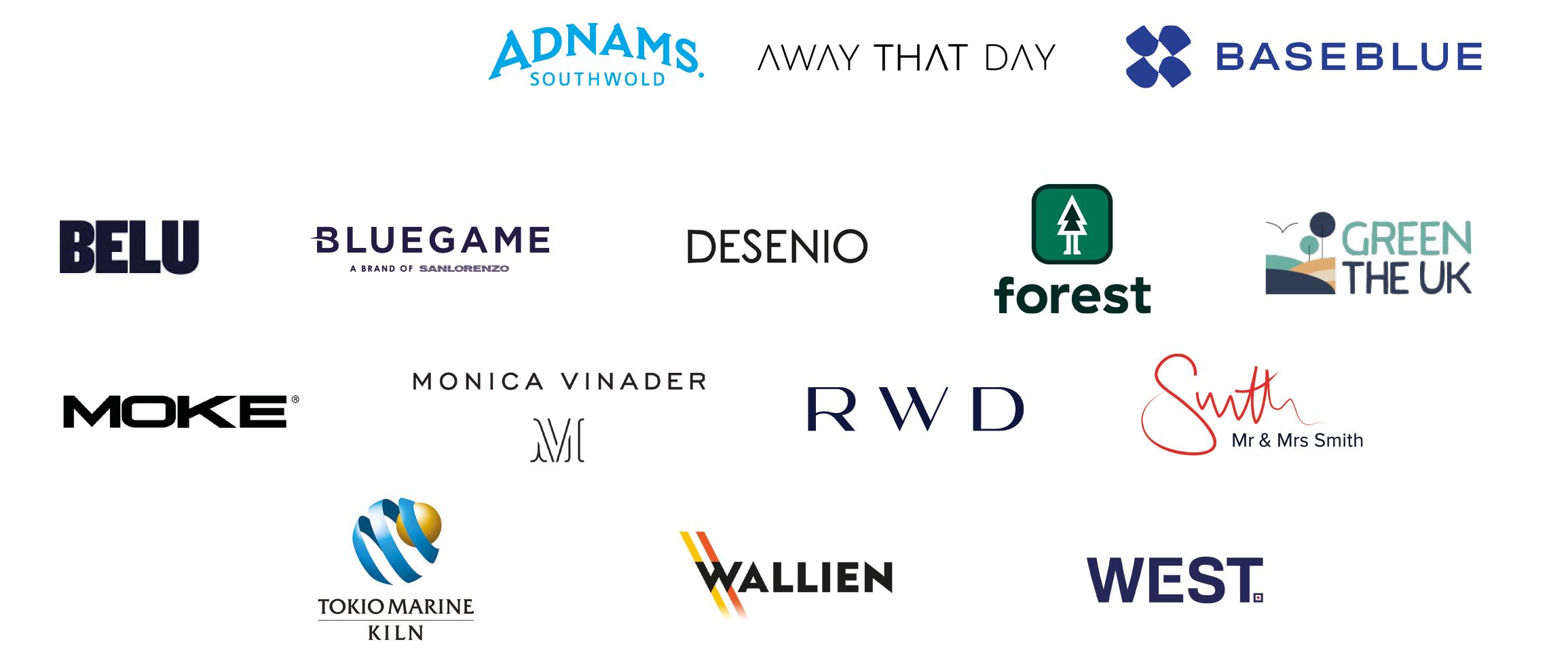
Over the past year, Blue Marine has received significant support from a number of trusts and foundations, whom we would like to thank for supporting our vision and work.
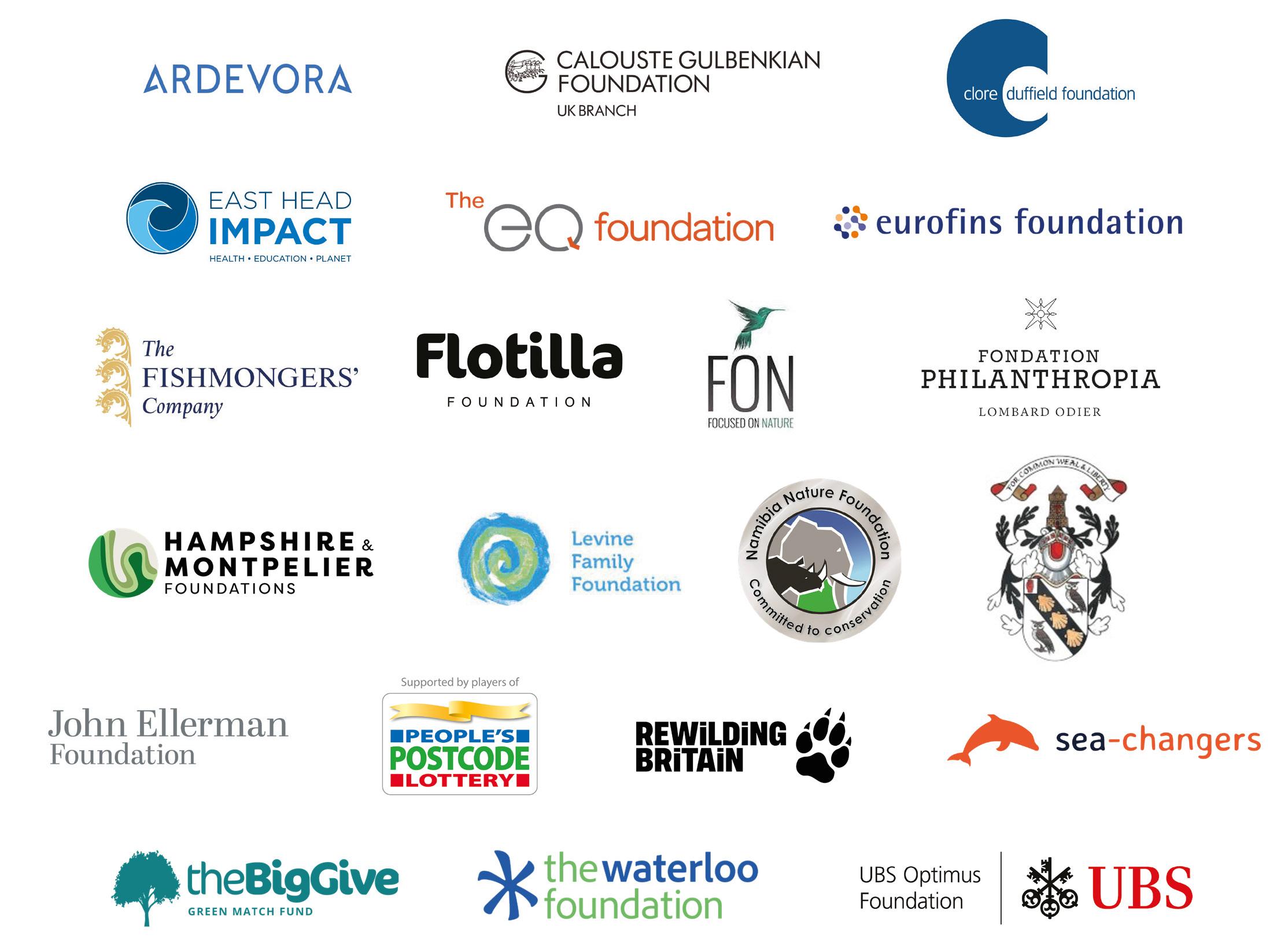
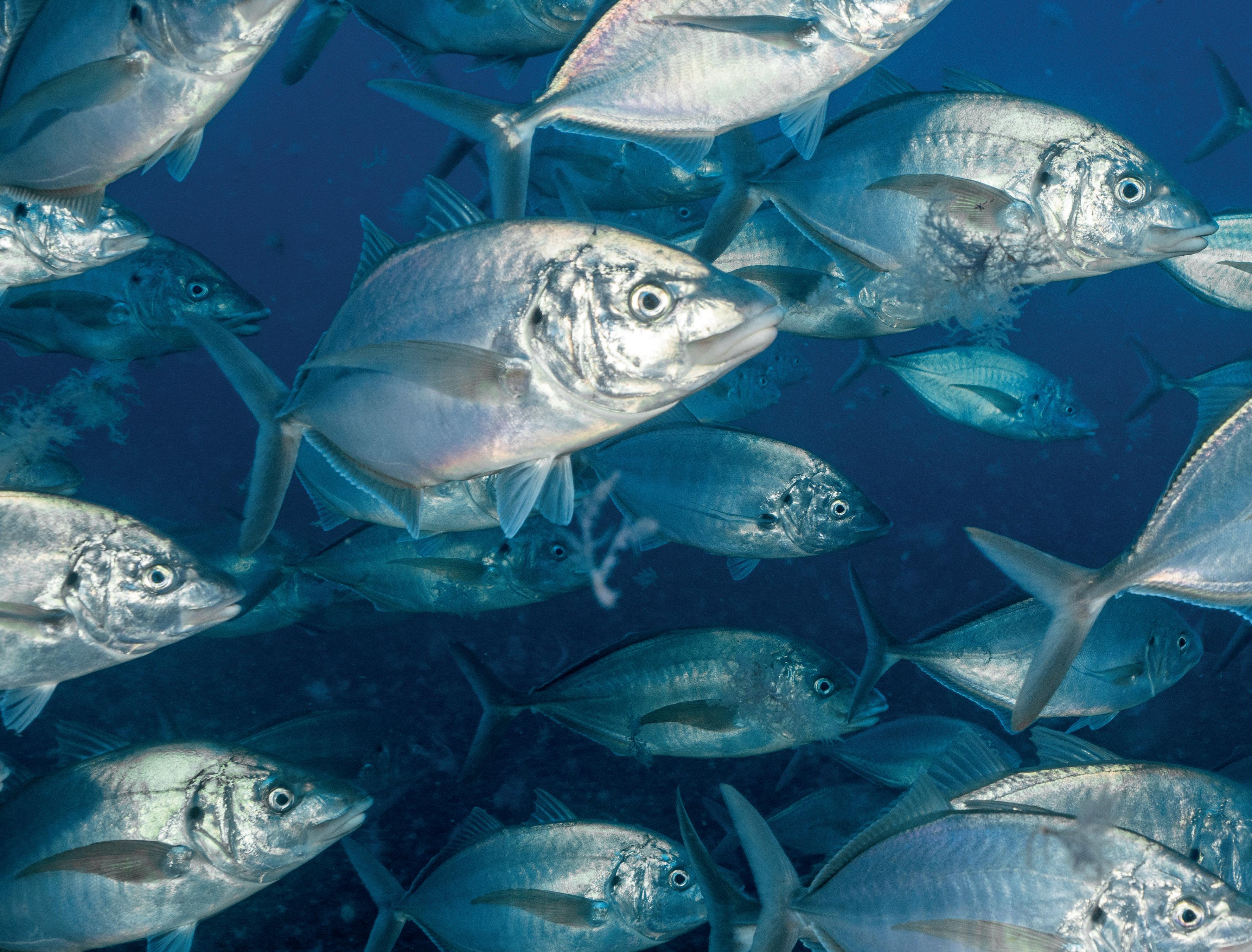
Major donors
Allison and Dale W. Wood
Apex
Barclays
British Airways Better Community
Fund
Chris Evans
Frank Binder
James Blunt
James Hopkins
John Cooper
Liontrust Sustainable Investment
team
Mike Sharp
Parley
Robert van Vlissingen
Royal Bank of Canada
Simon Pickard
Six Senses Hotels Resorts Spas
Solent Forum
Steve Koltes
Tahir Sharif
Alex Beard
Cristina Stenbeck
CVC Capital Parters
Françoise Wanninkhof
Idan Ofer
James Kalbassi
Lars Windhorst
Paul Sykes
Peter Lürssen
Damen Yachting
Rolly Van Rappard
Kaltroco Ltd
David Gimson
SMRL Consulting and Investment
James Brocklebank
Clive Pulteney
Burgess
DP World
Lürssen
Major partners
Affinity PW
RBC BlueBay Asset Management.
Christopher Ward
Convex Group Limited
Golden Acre Foods
Travelopia
Vita Yachts
Winch Design
Bucherer
Mourant
Ocean 14 Capital
Elizabeth Scarlett
Corporate partners
Adnams Plc
Baseblue
Bluegame
Forest
Green the UK
Mr & Mrs Smith
RWD Yacht Design
Wallien
West of England Insurance
Desenio
Monica Vinader
MOKE International
Tokio Marine Kiln
Belu Water
Away That Day
Trusts and Foundations
Ardevora Charitable Trust
The Big Give Green Match Fund
Calouste Gulbenkian Foundation
The Ciner Family Foundation
Clore Duffield Foundation
The Constance Travis Charitable Trust
Don Quixote Foundation
East Head Impact
Ecological Restoration Fund
EQ Foundation
Eurofins Foundation
The Fishmongers' Company
Flotilla Foundation
Focused on Nature
Fondation Philanthropia
Fondation Socindec
Hampshire & Montpelier Foundation
Ian Mactaggart Trust
John Ellerman Foundation
Levine Family Foundation
Lichfield Charitable Trust
Miel De Botton Charitable Trust
National Fish and Wildlife Foundation (NFWF)
The Portrack Charitable Trust
Postcode Lottery Dream Trust
Postcode Planet Trust
Rewilding Britain
Ruth Smart Foundation
The Salisbury Charitable Trust
Sea-Changers
Simon Gibson Charitable Trust
The Swire Charitable Trust
Turing Foundation
UBS Optimus Foundation
The Charles Dunstone Charitable
Trust
The Windfall Foundation
Endangered Landscapes and Seascapes Programme
The Addo Trust
Zoological Society of London
St Marys School
Sussex Wildlife Trust
NFL Foundation
The Peter and Elisabetta
Mallinson Trust
The Lady Cobham Foundation
Swarovski Foundation
Namibia Nature Foundation
BMYC
La Fondation Prince Albert II de Monaco
Bertarelli Foundation
Andrew and Jane Winch
Sir Charles and Celia Dunstone
Nicholas Edmiston
Nobiskrug
Peter Lürssen
Gtechniq
David MacNeil
Rolly Van Rappard (brook foundation)
Cristina Stenbeck
Boat International Media
Superyachts.com
Yachting Pages
Steve Edge Design
Gentoo Sailing
Donors
Alatus Capital
BMT Group Limited
Eric & Hannah Heerema
George Cornelius
George Waechter
Gregory Jankilevitsch
Hansa Capital Partners
Global Returns Project
Philip Higson
Dragon School
Burkhard Von Schenk
Emily & Sebastian Lürssen
James Grimston
Michael Harris
Mr J Armitage
St Michaels
Edmund Steele
Andrew Robertson
El Morrison
Madeline Reardon
Global Returns Project
Klarna
Milkywire
John Pritzker
Konstantinos Kanellopoulos
Mark Lloyd
Monica Vinader
Aviva
Stefan Peschke
The Ocean Race
Yacht Carbon Offset
Armelle Caumont Caimi
Peninsula Productions
Tony Castro Yachts
Goldman sachs
Octopus Energy
Pentire Drinks
Echo Research
Tngineers
Hill Robinson
Caroline Stirling and James Bernard
Friends of Blue Marine
Alastair Blyth
Clive Pulteney
Danielle Sheriff
David Holberton
Fairooz Islam
Gabriela Mizerija
Gaumont (Locked In) Ltd
Grant Rumbles
Island to Island group
James Manktelow
John Roberts
Jordan Bermingham
Marc Boughton
Marin Muyser
Marine Muyser
Matthew Holder-Biziou
Michael Hall
Miles Jones
Peter Whale
Red Orca Legal Recruitment
Richard Sheldon
Robert Rooney
Robin Brown
Robert Mayhew
Roger Ames
SF Marina
Sheila Rumbles
Sophie Sheldon
Studio Delta b.v.
Tim Johnson
Tim Penfold
Pro bono
Clifford Chance
Freuds
Hutch Agency
Kroll
Latham & Watkins
OceanOutdoor
Paul Naylor
Rawlinson & Hunter
Steve Edge Design
University of Portsmouth
Lion Trust Asset Management
Blue Challengers
Brothers n Oars
Atlantic Escapade
Blue Tusk
Camilla Windus
Panfilo Tarantelli - ACAIA
The Big Oardeal
Susannah and Patrick Seely
Intrepid 232
Blue Marine continued to expand its operations and impact despite a challenging economic environment. Income for the financial year ending 31 March 2023 was £11,300,376, up 45 per cent on the previous year. Expenditure over the year was £9,502,068, up 53 per cent on the previous year.
Blue Marine is now working in 24 locations around the world and is carrying out more than 50 programmes globally. We constantly review further projects, campaigns and programmes, only taking on those where we believe that Blue Marine is best placed to achieve meaningful conservation change.
Despite its rapid growth, Blue Marine has retained a highly efficient organisational structure. A lean but structured decision-making process means that we can keep operational costs low while ensuring our programmes are as effective and impactful as possible. To maximise our efficiency, any surplus unrestricted reserves are invested into our Rapid Action Fund, allowing us to respond fast when project opportunities arise.
In September 2023, Blue Marine was awarded ‘Transformation Project of the Year’ at the Enterprise Resource Planning Today awards, fending off much larger competitors such as Formula 1 and the Ministry of Defence. The award recognised ‘a continuous drive to maximise organisational efficiency, by building a finance system capable of competing against big business.’ This reflects Blue Marine’s core strength: namely a small team of highly dedicated, passionate and talented employees, experts in their fields who are capable of working with precision and ingenuity.
We aim to run a lean, efficient structure while maximising our impact.
7%
8%
SPENT GENERATING FUNDS, WE SECURED FOR EVERY £1 £40
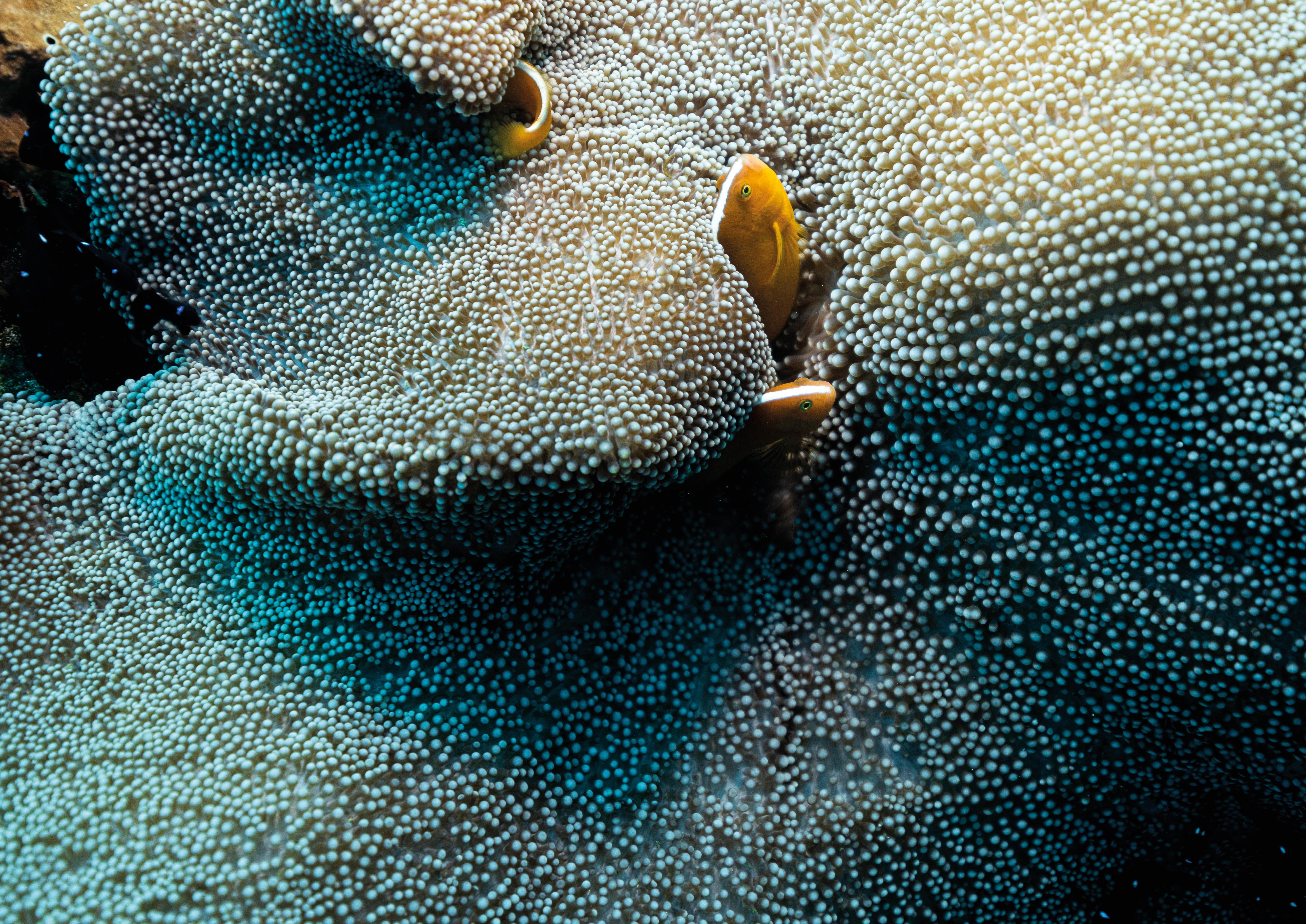

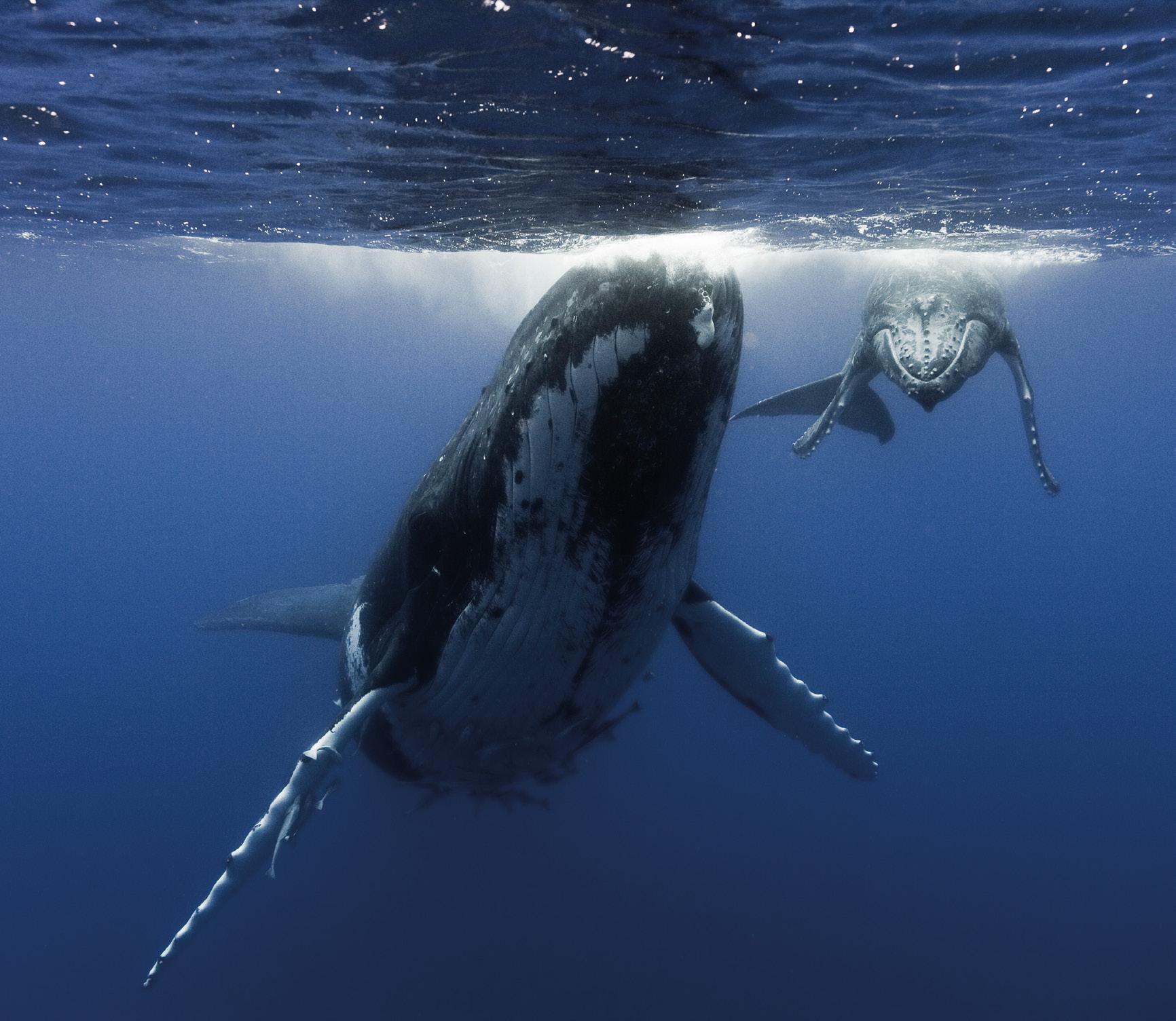
bluemarinefoundation.com
info@bluemarinefoundation.com
South Building, Somerset House, Strand, London WC2R 1LA